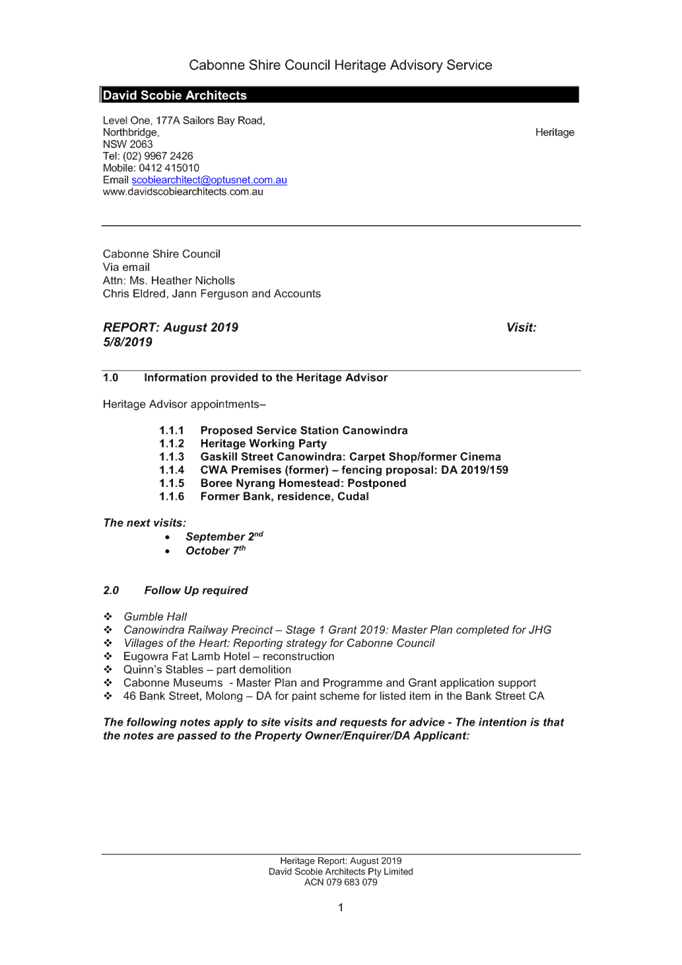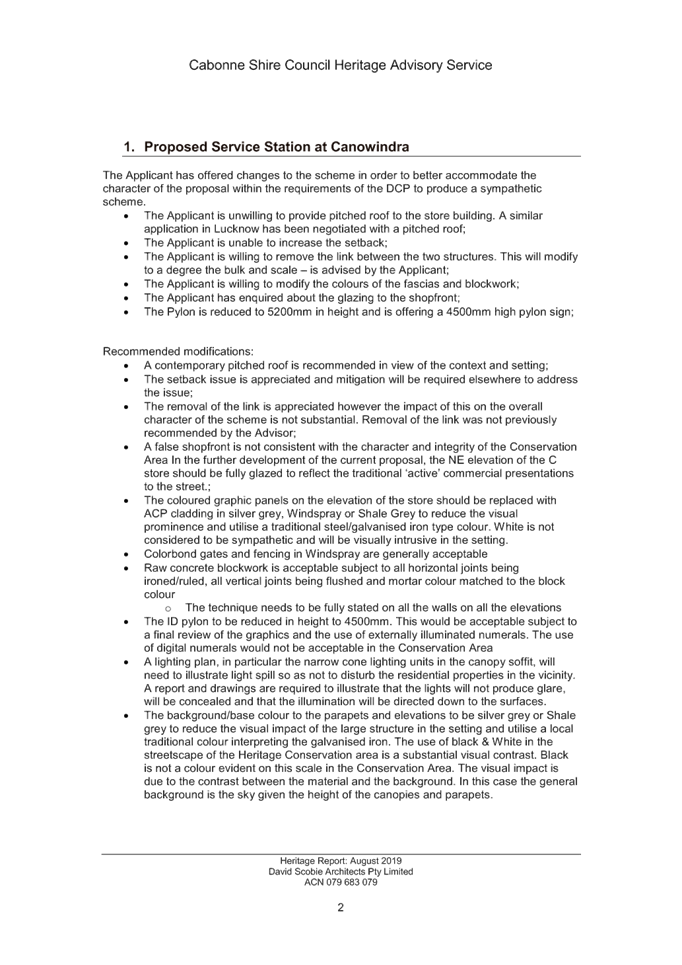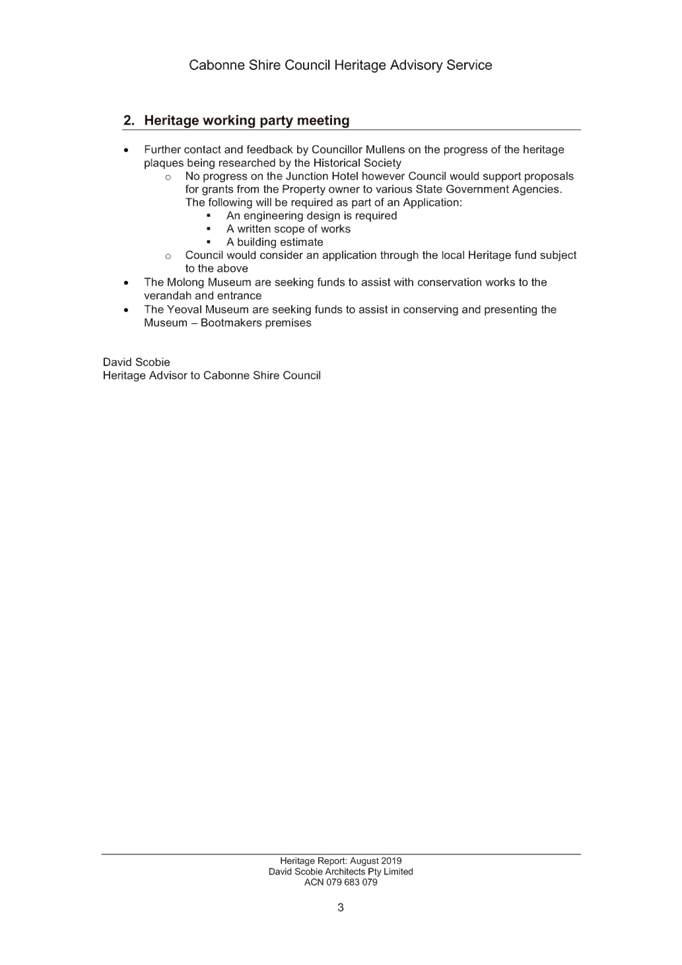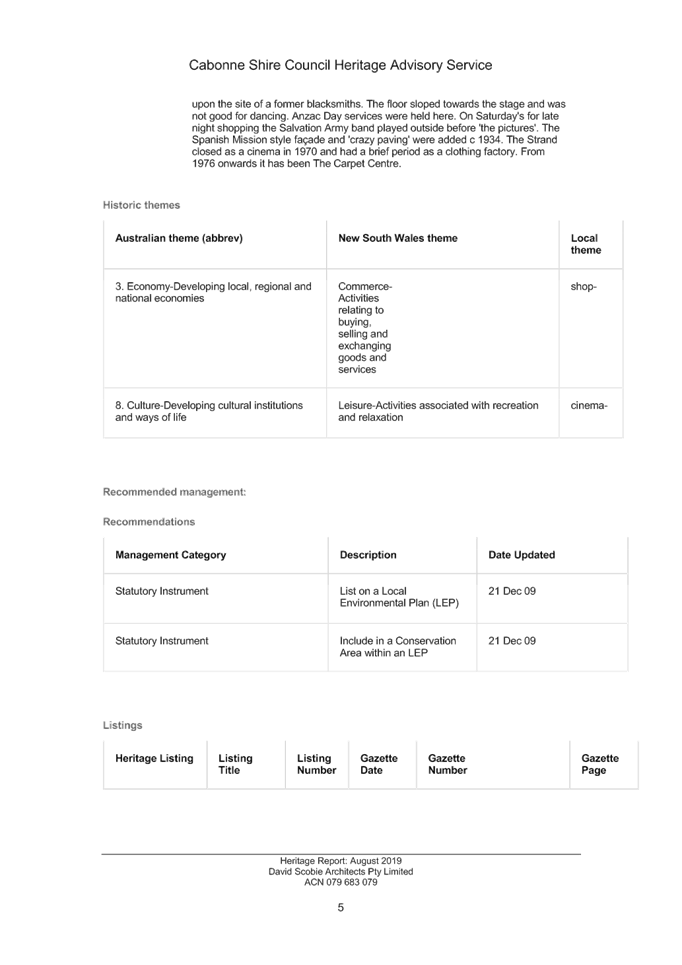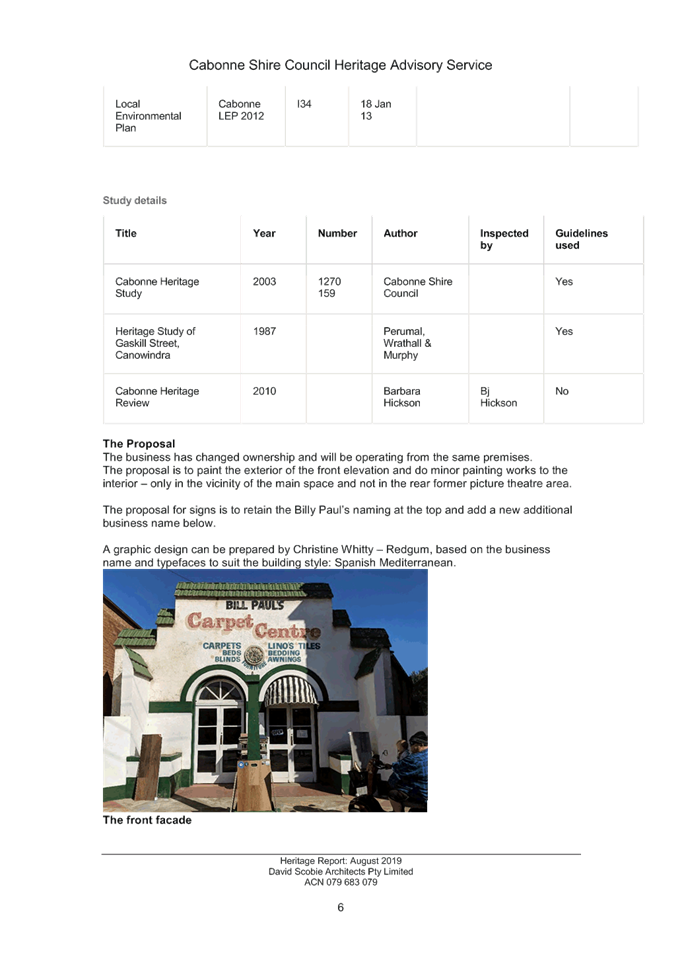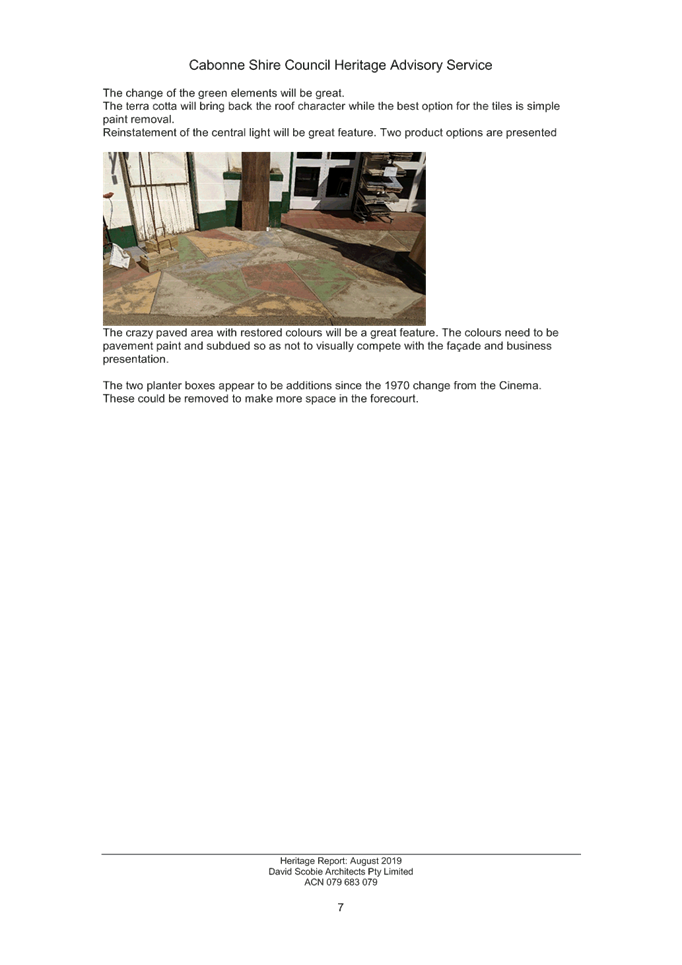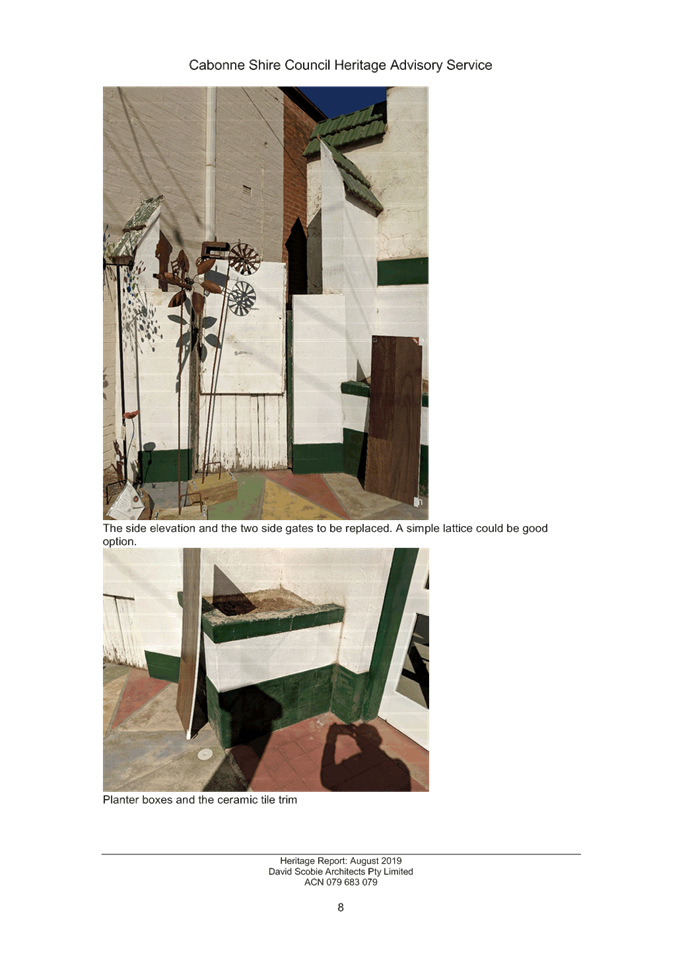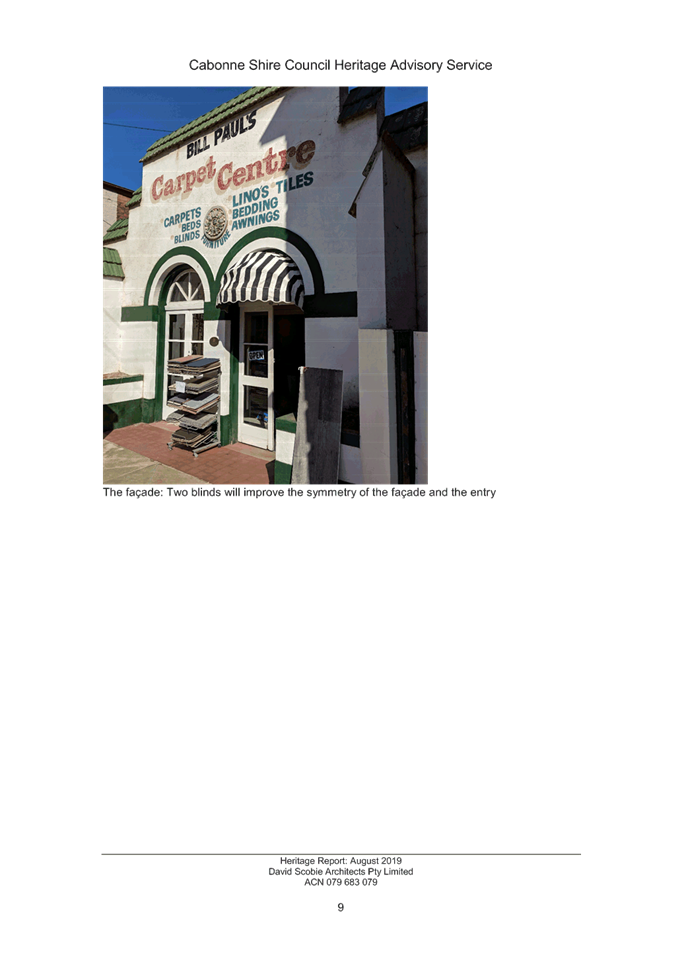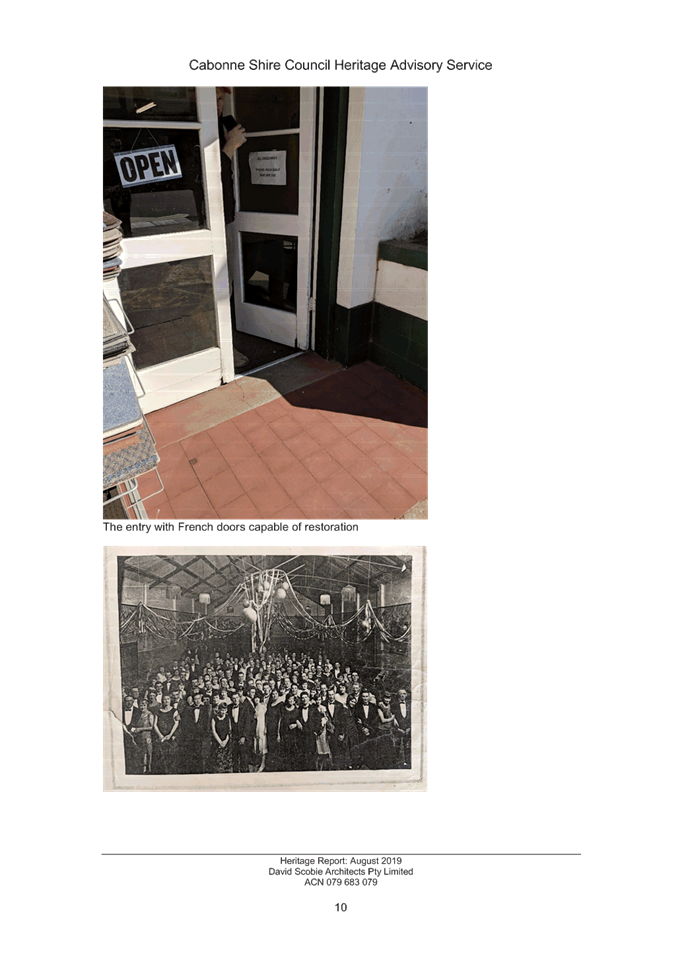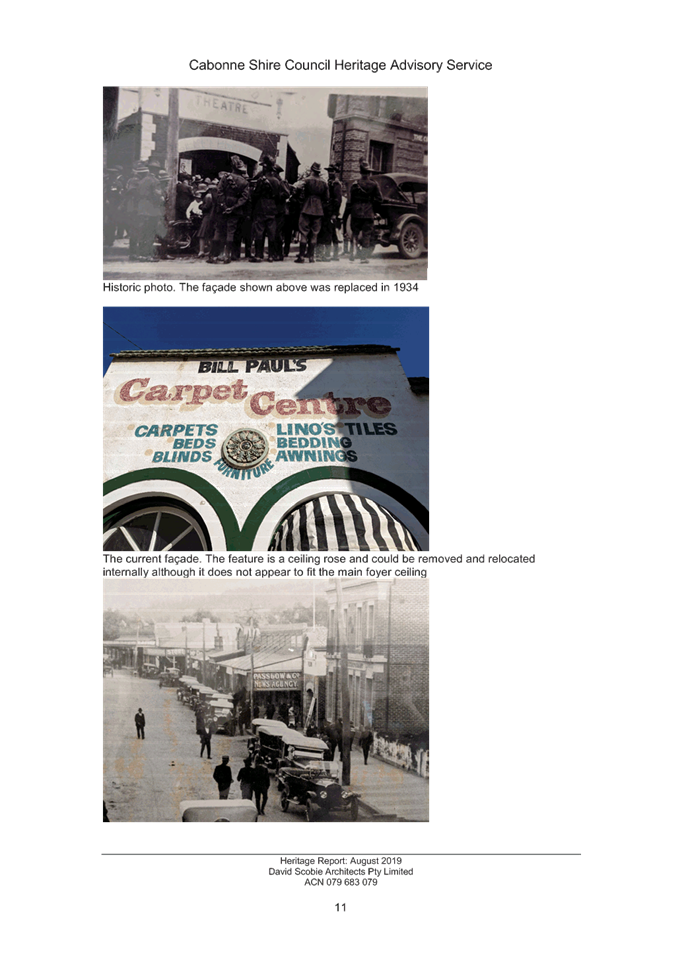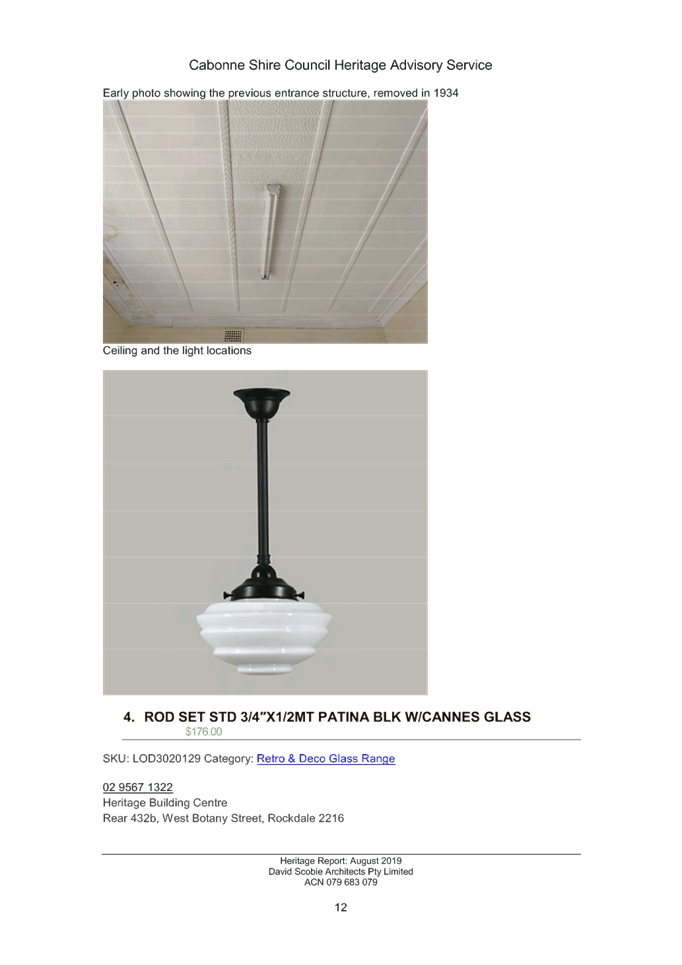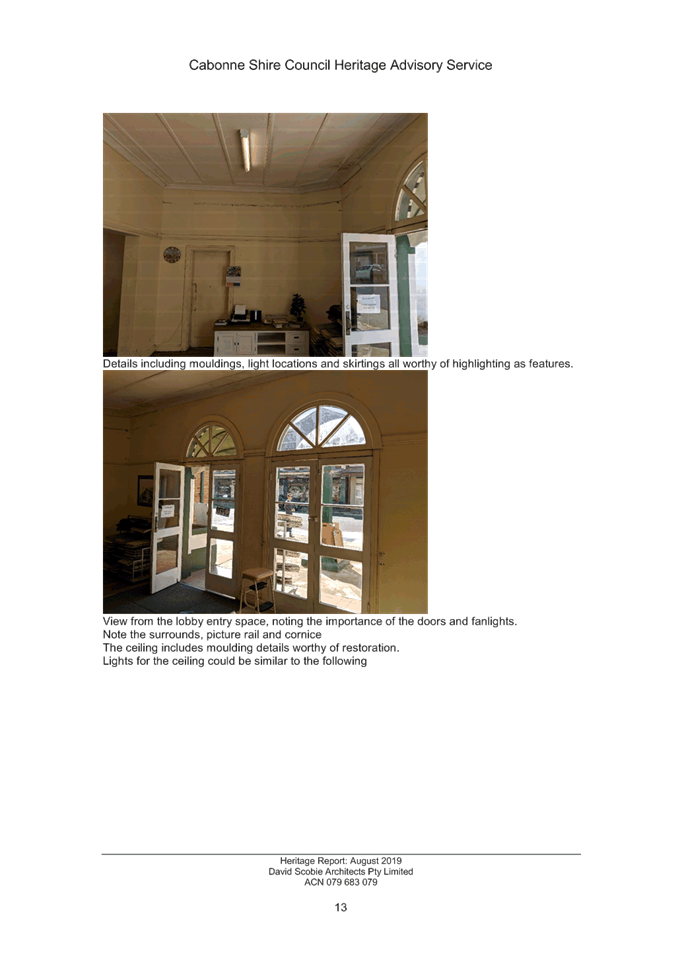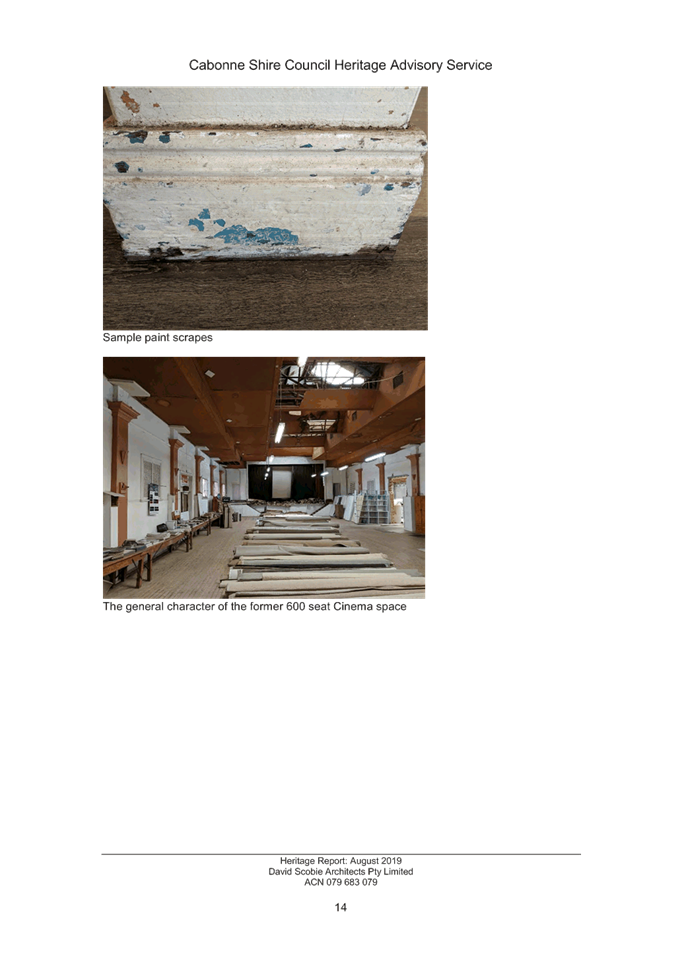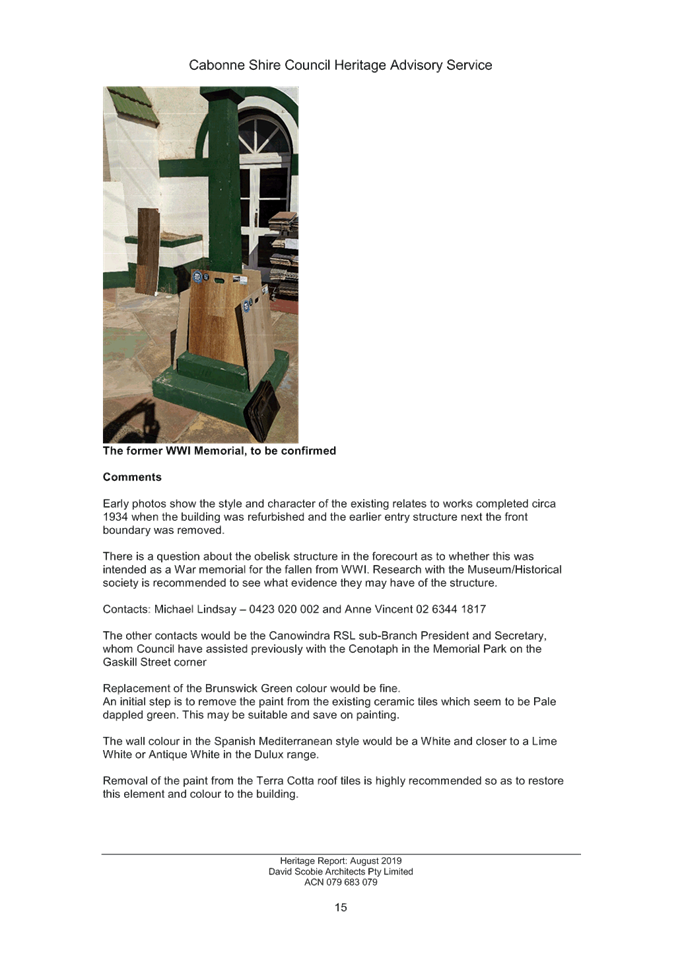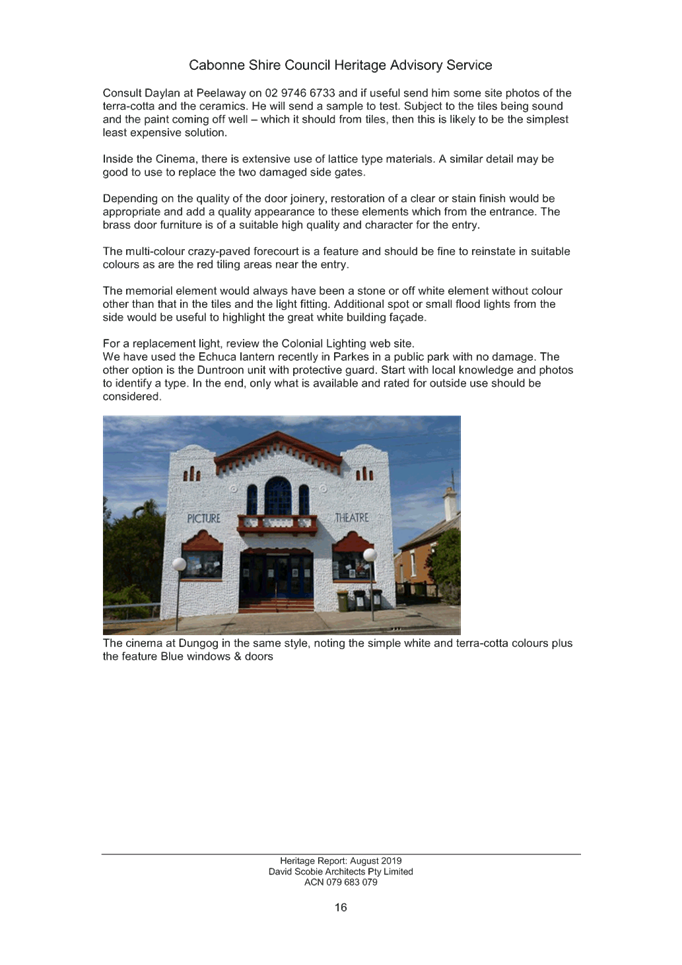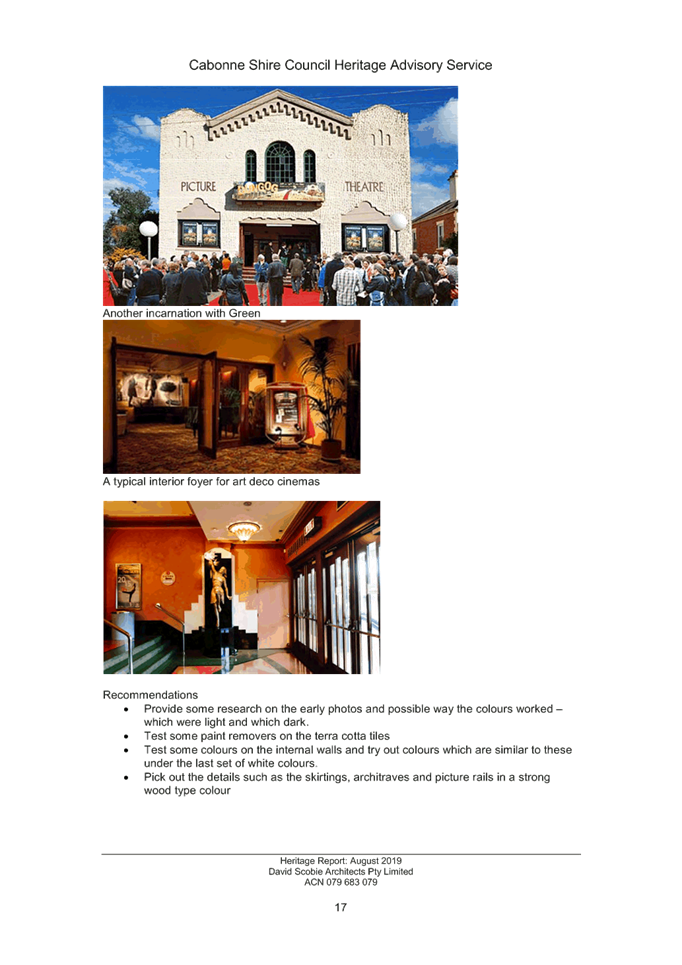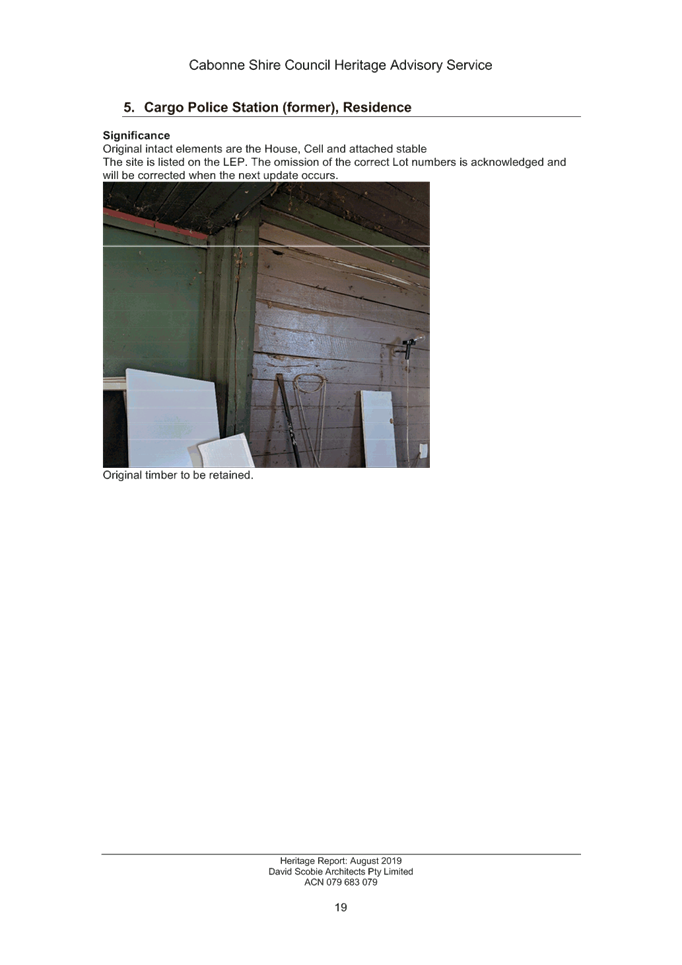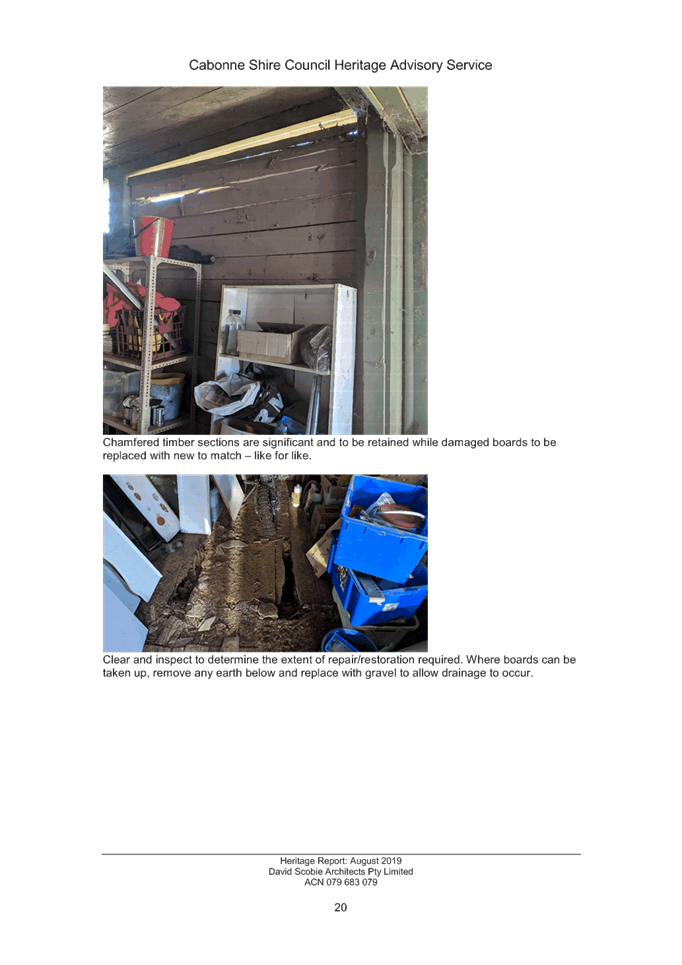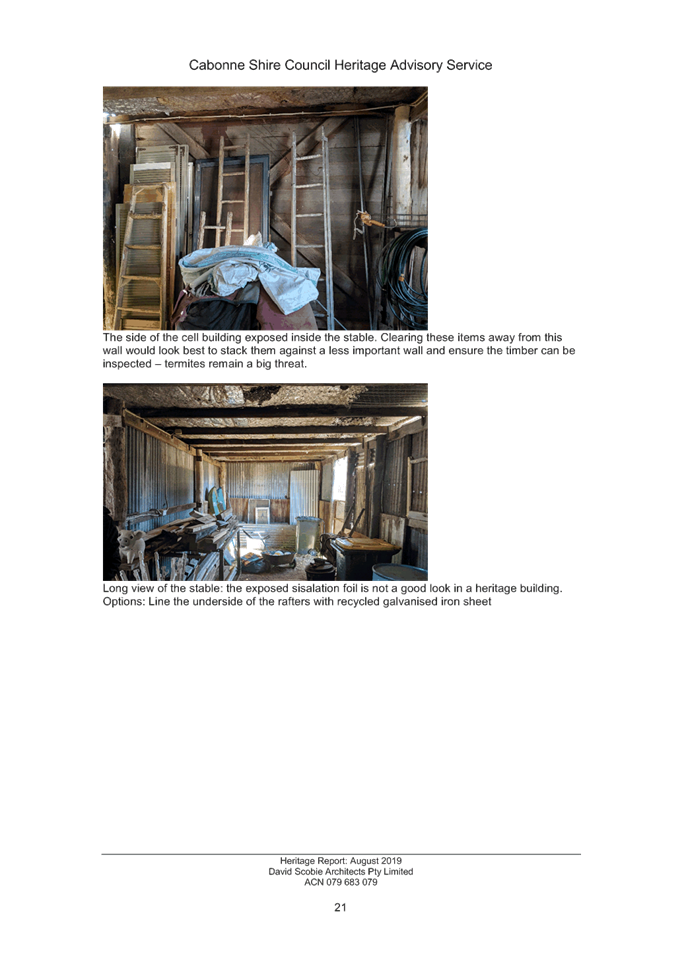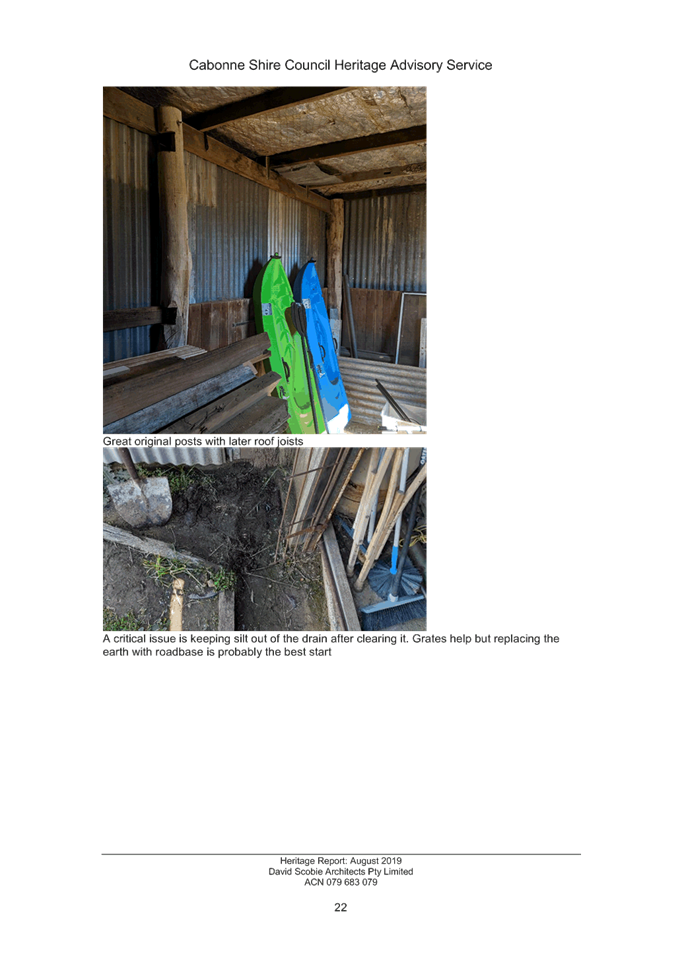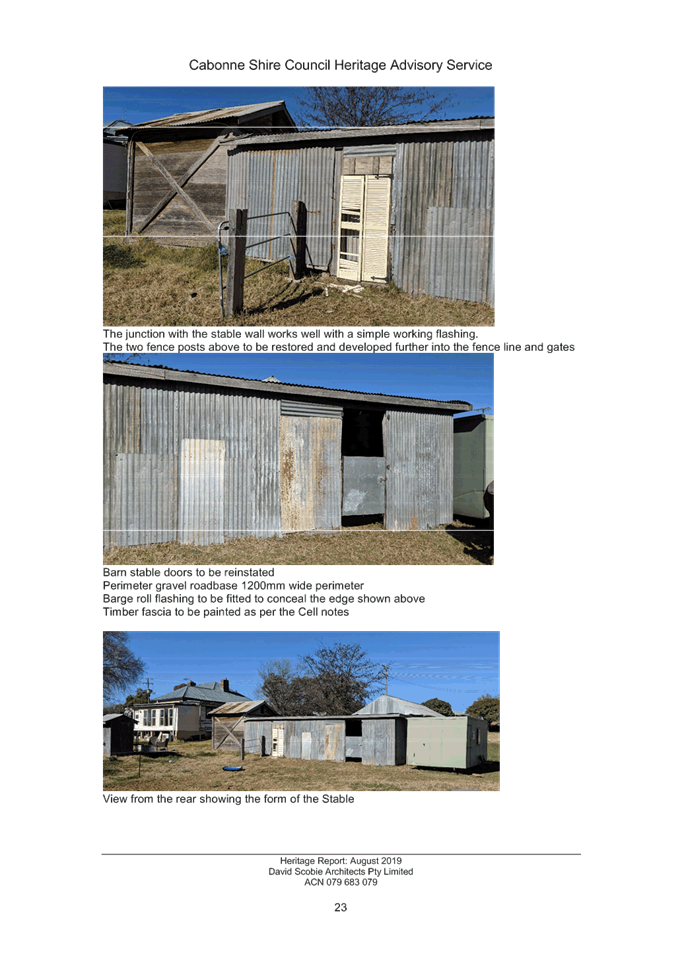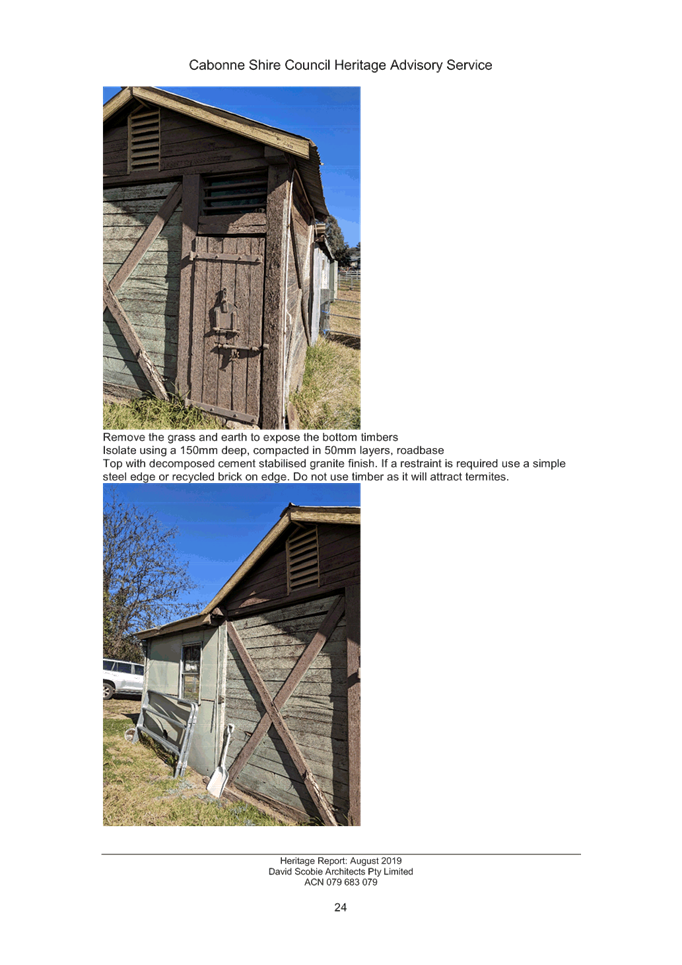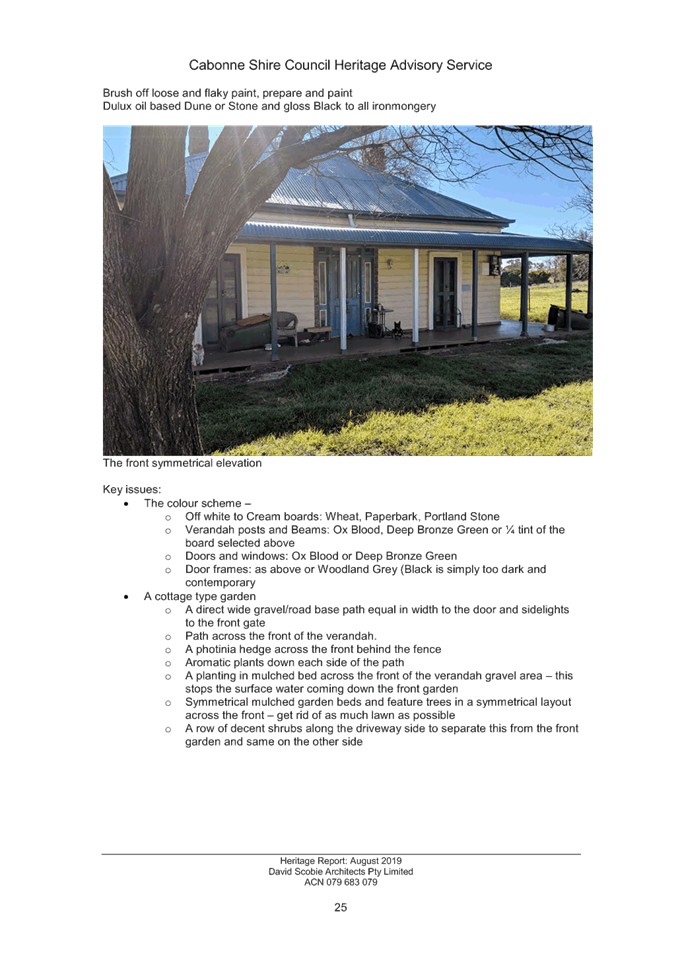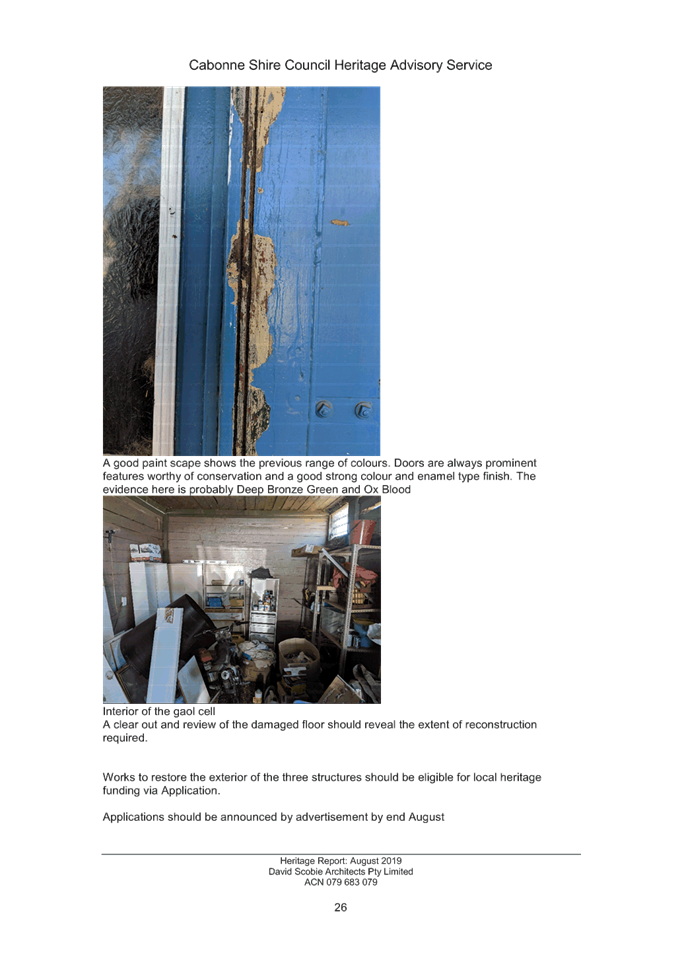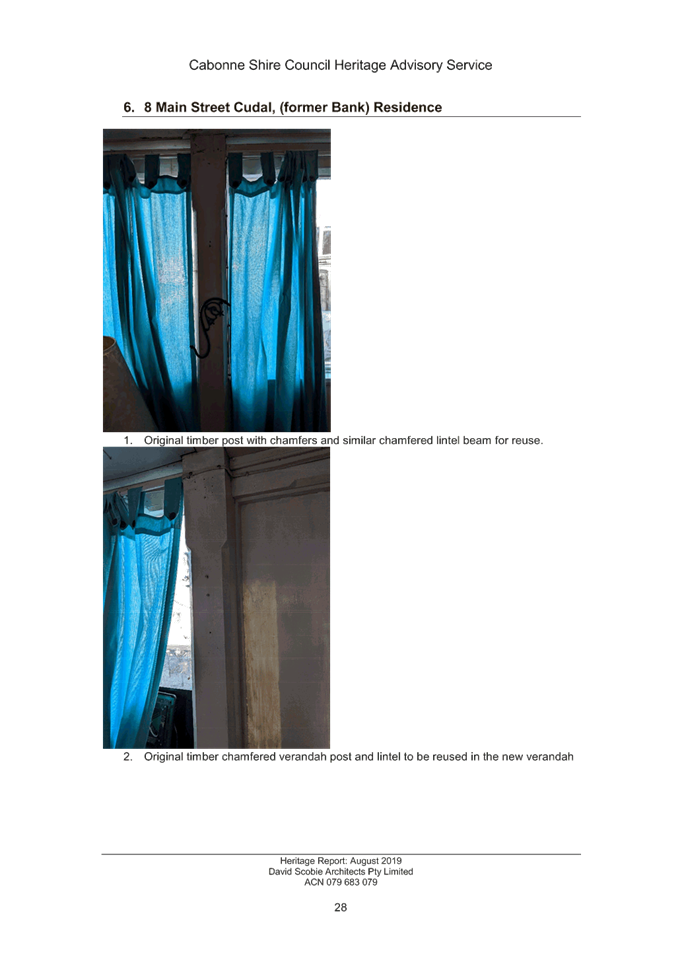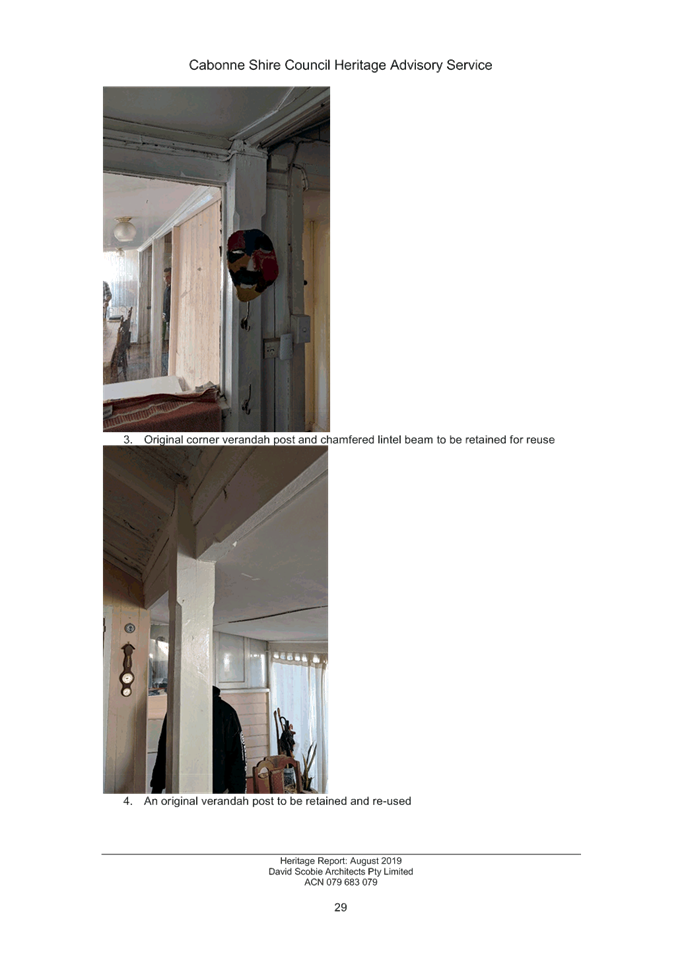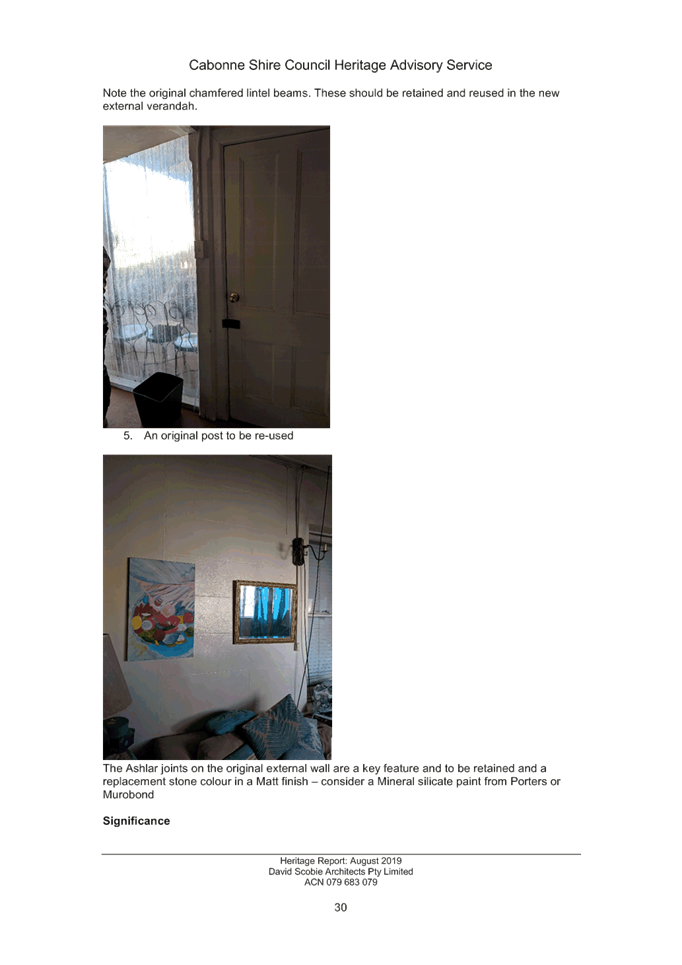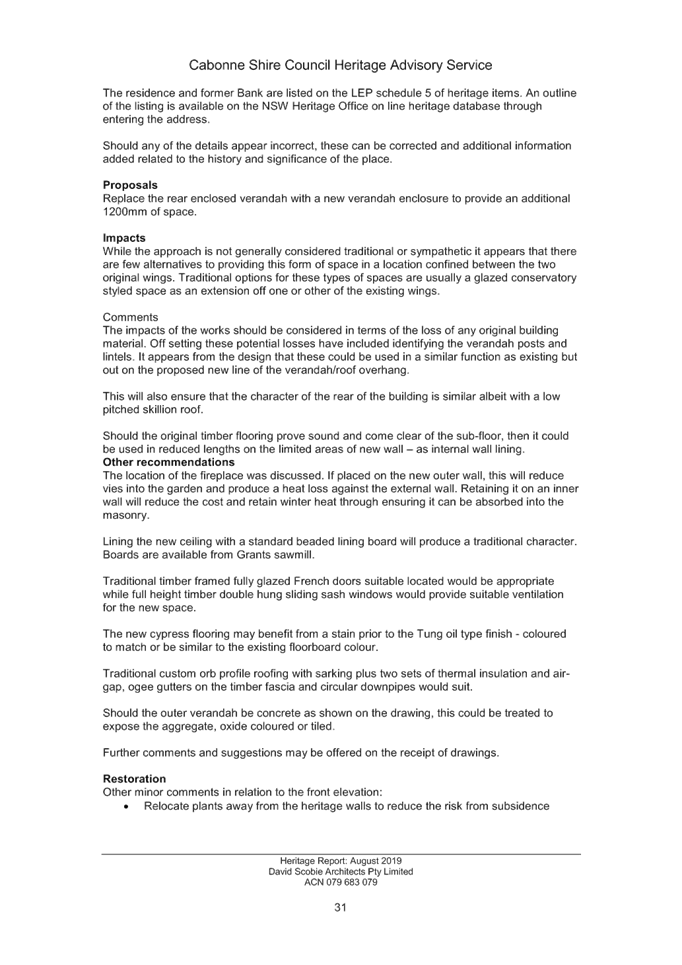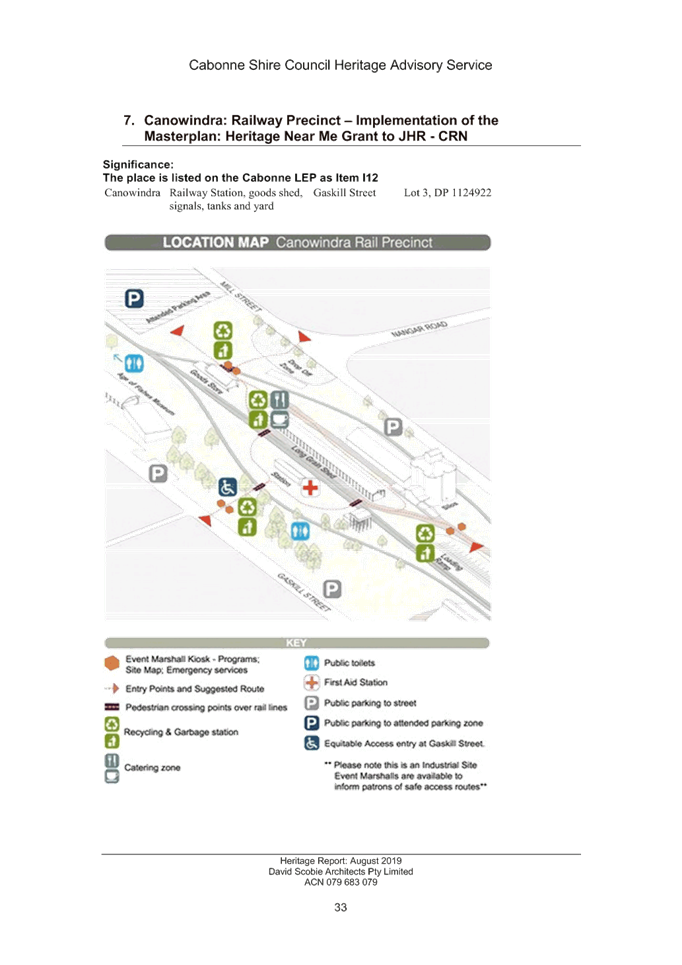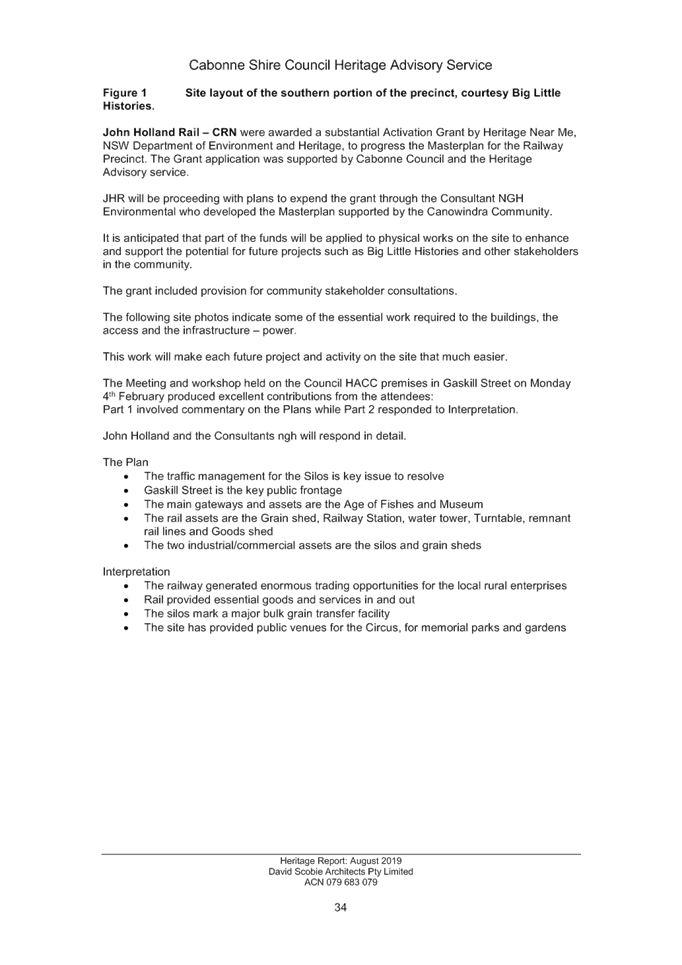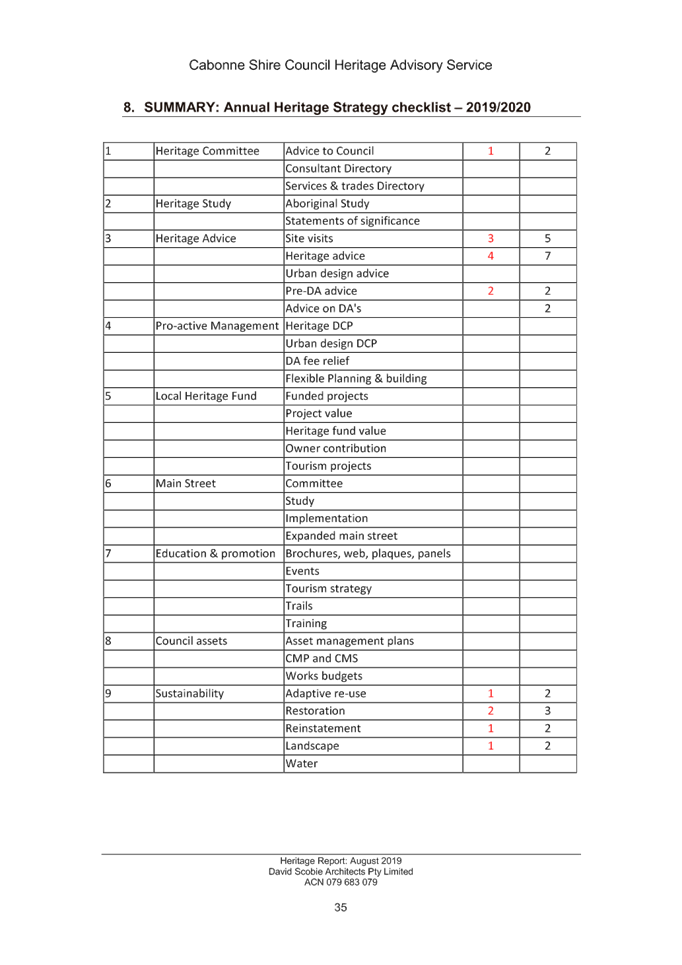
20
August 2019
NOTICE OF Ordinary Council
Meeting
Your attendance is respectfully requested at the Ordinary Meeting of Cabonne Council convened
for Tuesday 27 August, 2019 commencing at 2:00pm,
at the Cabonne Council Chambers, Bank Street, Molong to consider the
undermentioned business.
Yours faithfully

BJ Byrnes
GENERAL
MANAGER
ORDER OF BUSINESS
1)
Open Ordinary Meeting
2)
Consideration of Mayoral Minute
3)
Consideration of General Manager’s Report
4)
Resolve into Committee of the Whole
a) Consideration of Called Items
b) Consideration of Closed Items
5)
Adoption of Committee of the Whole
Report
ATTENDEES – AUGUST 2019 COUNCIL MEETING
|
2:00 pm
|
The Hon Andrew Gee
MP
|
GENERAL MANAGER’S REPORT ON
MATTERS FOR DETERMINATION SUBMITTED TO THE Ordinary Council
Meeting TO BE HELD
ON Tuesday 27 August, 2019
Page 1
TABLE OF CONTENTS
ITEM
1 APPLICATIONS
FOR LEAVE OF ABSENCE.................................. 4
ITEM
2 DECLARATIONS
OF INTEREST....................................................... 4
ITEM
3 DECLARATIONS
FOR POLITICAL DONATIONS.......................... 5
ITEM
4 MAYORAL
MINUTE - APPOINTMENTS........................................... 5
ITEM
5 COMMITTEE
OF THE WHOLE........................................................... 6
ITEM
6 GROUPING
OF REPORT ADOPTION.............................................. 7
ITEM
7 CONFIRMATION
OF THE MINUTES................................................. 7
ITEM
8 COUNCIL
UNION PICNIC DAY.......................................................... 8
ITEM
9 POLICY
REVIEW - CODE OF CONDUCT & GIFT AND BENEFIT POLICY 9
ITEM
10 GOVERNMENT
INFORMATION PUBLIC ACCESS ACT 2009 (GIPA) AGENCY INFORMATION GUIDE - ANNUAL
REVIEW................................. 10
ITEM
11 AUDIT, RISK AND
IMPROVEMENT COMMITTEE ...................... 11
ITEM
12 DRAFT CORPORATE
CREDIT CARD POLICY............................ 12
ITEM
13 ANNUAL FINANCIAL
STATEMENTS............................................. 13
ITEM
14 WRITE OFF RATES
OUTSTANDING FOR PARCELS OF LAND TRANSFERRED TO CABONNE COUNCIL.................................................................. 14
ITEM
15 MEMBERSHIP OF
ORANGE 360 REGIONAL TOURISM ORGANISATION 15
ITEM
16 STRONGER COUNTRY
COMMUNITIES FUND - ROUND THREE 17
ITEM
17 EVENTS ASSISTANCE
PROGRAM................................................ 19
ITEM
18 RE-ESTABLISHMENT OF
ALCOHOL FREE ZONES................. 24
ITEM
19 ENFORECEMENT POLICY............................................................... 29
ITEM
20 REQUEST FOR
DONATION EQUIVALENT TO DEVELOPMENT APPLICATION FEES PAID BY EUGOWRA PROMOTION
AND PROGRESS ASSOCIATION 30
ITEM
21 REQUEST FOR DONATION
- FEES PAID ASSOCIATED WITH DEVELOPMENT APPLICATION 2017/094.................................................................... 32
ITEM
22 QUESTIONS FOR NEXT
MEETING................................................ 34
ITEM
23 BUSINESS PAPER
ITEMS FOR NOTING...................................... 34
ITEM
24 MATTERS OF URGENCY................................................................. 35
ITEM
25 COMMITTEE OF THE
WHOLE SECTION OF THE MEETING... 36
Confidential Items
Clause 240(4)
of the Local Government (General) Regulation 2005 requires Council to refer any
business to be considered when the meeting is closed to the public in the
Ordinary Business Paper prepared for the same meeting. Council will
discuss the following items under the terms of the Local Government Act 1993
Section 10A(2), as follows:
ITEM
1 CARRYING
OF COMMITTEE RESOLUTION INTO CLOSED COMMITTEE OF THE WHOLE MEETING
Procedural
ITEM
2 ENDORSEMENT
OF PROCEEDINGS OF CONFIDENTIAL MATTERS CONSIDERED AT COMMITTEE OF THE WHOLE
MEETING
Procedural
ITEM
3 REQUEST
FOR CONSIDERATION OF WATER CHARGES FOR 3967100003
(b) matters in
relation to the personal hardship of a resident or ratepayer
ITEM
4 REQUEST
FOR CONSIDERATION OF INTEREST CHARGES FOR RATES A9109 AND WATER/SEWER 682000005
(b) matters in
relation to the personal hardship of a resident or ratepayer
ITEM
5 EVALUATION
OF TILT/TIP TRUCKS
(c) information that
would, if disclosed, confer a commercial advantage on a person with whom the
Council is conducting (or proposes to conduct) business
ANNEXURE ITEMS
ANNEXURE
7.1 July 23 2019
Ordinary Council Meeting Minutes 37
ANNEXURE
9.1 Code of Conduct
Policy........................................... 50
ANNEXURE
9.2 Gift and Benefit
Policy............................................. 94
ANNEXURE
10.1 Agency information Guide -
2019-2020 .............. 99
ANNEXURE
11.1 GRMBI Minutes 1 August 2019................................ 121
ANNEXURE
12.1 Draft - Corporate Credit Card
Policy......... 125
ANNEXURE
13.1 Annual Financial Statements............................. 132
ANNEXURE
15.1 Orange 360 abridged annual
report 6 aug 2019 136
ANNEXURE
15.2 Orange 360 financial
statements 6 aug 2019 140
ANNEXURE
17.1 Central West Disc Golf -
Events Assistance Program Application Form........................................................ 160
ANNEXURE
17.2 Orange Regional Vignerons
Association - Events Assistance Program Application.................... 173
ANNEXURE
17.3 Molong Advancement Group Inc
- Event Assistance Program - 2019............................................................... 184
ANNEXURE
19.1 Draft Enforcement Policy 2019......................... 188
ITEM 1 - APPLICATIONS FOR
LEAVE OF ABSENCE
REPORT IN BRIEF
|
Reason For Report
|
To allow
tendering of apologies for councillors not present.
|
|
Policy Implications
|
Nil
|
|
Budget
Implications
|
Nil
|
|
IPR Linkage
|
4.5.1.g - Code
of Meeting Practice adopted and implemented.
|
|
Annexures
|
Nil
|
|
File Number
|
\OFFICIAL
RECORDS LIBRARY\GOVERNANCE\COUNCIL MEETINGS\COUNCIL - COUNCILLORS LEAVE OF
ABSENCE - 1021240
|
|
Recommendation
THAT any
apologies tendered be accepted and the necessary leave of absence be granted.
|
General Manager REPORT
A call for
apologies is to be made.
ITEM 2 - DECLARATIONS OF
INTEREST
REPORT IN BRIEF
|
Reason For Report
|
To allow an opportunity
for councillors to declare an interest in any items to be determined at this
meeting.
|
|
Policy
Implications
|
Nil
|
|
Budget
Implications
|
Nil
|
|
IPR Linkage
|
4.5.1.g
- Code of Meeting Practice adopted and implemented.
|
|
Annexures
|
Nil
|
|
File Number
|
\OFFICIAL
RECORDS LIBRARY\GOVERNANCE\COUNCIL MEETINGS\COUNCIL - COUNCILLORS AND STAFF
DECLARATIONS OF INTEREST - 2019 - 1021241
|
|
Recommendation
THAT the
Declarations of Interest be noted.
|
General Manager REPORT
A call for
Declarations of Interest.
ITEM 3 - DECLARATIONS FOR
POLITICAL DONATIONS
REPORT IN BRIEF
|
Reason For Report
|
To allow an
opportunity for Councillors to declare any Political Donations received.
|
|
Policy
Implications
|
Nil
|
|
Budget
Implications
|
Nil
|
|
IPR Linkage
|
4.5.1.g
- Code of Meeting Practice adopted and implemented.
|
|
Annexures
|
Nil
|
|
File Number
|
\OFFICIAL
RECORDS LIBRARY\GOVERNANCE\COUNCIL MEETINGS\COUNCIL - COUNCILLORS DECLARATION
OF POLITICAL DONATIONS - 1021242
|
|
Recommendation
THAT any
Political Donations be noted.
|
General Manager REPORT
A call for
declarations of any Political Donations.
ITEM 4 - MAYORAL MINUTE -
APPOINTMENTS
REPORT IN BRIEF
|
Reason For Report
|
To allow
noting of the Mayoral appointments plus other Councillors' activities
Reports.
|
|
Policy
Implications
|
Nil
|
|
Budget
Implications
|
Nil
|
|
IPR Linkage
|
4.5.1.g
- Code of Meeting Practice adopted and implemented.
|
|
Annexures
|
Nil
|
|
File Number
|
\OFFICIAL
RECORDS LIBRARY\GOVERNANCE\COUNCIL MEETINGS\MAYORAL MINUTES - 1021245
|
|
Recommendation
THAT the
information contained in the Mayoral Minute be noted.
|
General Manager REPORT
A call for the
Mayoral appointments and attendances as well as other Councillors’
activities reports to be tabled/read out.
ITEM 5 - COMMITTEE OF THE
WHOLE
REPORT IN BRIEF
|
Reason For Report
|
Enabling
reports to be considered in Committee of the Whole to be called.
|
|
Policy
Implications
|
Nil
|
|
Budget
Implications
|
Nil
|
|
IPR Linkage
|
4.5.1.g. Code
of Meeting Practice adhered to
|
|
Annexures
|
Nil
|
|
File Number
|
\OFFICIAL
RECORDS LIBRARY\GOVERNANCE\COUNCIL MEETINGS\GROUPING OF REPORT ADOPTION and
BUSINESS PAPER ITEMS FOR NOTING REPORTS - 1021246
|
|
Recommendation
THAT
Councillors call any items that they wish to be debated in Committee of the
Whole.
|
General Manager REPORT
Council’s
Code of Meeting Practice allows for the Council to resolve itself into
“committee of the whole” to avoid the necessity of limiting the number
and duration of speeches as required by Clause 250 of the Local Government
(General) Regulation 2005.
This item
enables councillors to call any item they wish to be debated in
“committee of the whole” at the conclusion of normal business.
The debate
process during a ‘normal’ Council meeting limits the number and
duration of speeches as required by Clause 250 of the Local Government
(General) Regulation 2005.
Items should
only be called at this time if it is expected that discussion beyond the normal
debate process is likely to be needed.
ITEM 6 - GROUPING OF REPORT
ADOPTION
REPORT IN BRIEF
|
Reason For Report
|
Enabling
procedural reports to be adopted.
|
|
Policy
Implications
|
Nil
|
|
Budget
Implications
|
Nil
|
|
IPR Linkage
|
4.5.1.a
- Provide quality administrative support and governance to councillors and
residents.
|
|
Annexures
|
Nil
|
|
File Number
|
\OFFICIAL
RECORDS LIBRARY\GOVERNANCE\COUNCIL MEETINGS\GROUPING OF REPORT ADOPTION and
BUSINESS PAPER ITEMS FOR NOTING REPORTS - 1021247
|
|
Recommendation
THAT:
1. Councillors
call any items they wish to further consider
2. Items
7 to 12 be moved and seconded.
|
General Manager REPORT
Items 7 to 12
are considered to be of a procedural nature and it is proposed that they be
moved and seconded as a group. Should any Councillor wish to amend or
debate any of these items they should do so at this stage with the remainder of
the items being moved and seconded.
ITEM 7 - CONFIRMATION OF THE
MINUTES
REPORT IN BRIEF
|
Reason For Report
|
Adoption of
the Minutes
|
|
Policy
Implications
|
Nil
|
|
Budget
Implications
|
Nil
|
|
IPR Linkage
|
4.5.1.g
- Code of Meeting Practice adopted and implemented.
|
|
Annexures
|
1. July 23 2019 Ordinary Council Meeting Minutes⇩
|
|
File Number
|
\OFFICIAL
RECORDS LIBRARY\GOVERNANCE\COUNCIL MEETINGS\COUNCIL - MINUTES - 2019 - 1021248
|
|
Recommendation
THAT the
minutes of the Ordinary meeting held 23 July 2019 be adopted.
|
General Manager REPORT
The following
minutes are attached for endorsement:
1. Minutes of the Ordinary Council
meeting held on 23 July 2019.
ITEM 8 - COUNCIL UNION PICNIC
DAY
REPORT IN BRIEF
|
Reason For Report
|
Seeking
Council's approval to conduct the annual Union Picnic Day.
|
|
Policy
Implications
|
Nil
|
|
Budget Implications
|
Nil
|
|
IPR Linkage
|
4.5.6.a.
Performance measures are in place
|
|
Annexures
|
Nil
|
|
File Number
|
\OFFICIAL
RECORDS LIBRARY\PERSONNEL\ARRANGEMENTS\PICNIC DAY - 1033874
|
|
Recommendation
THAT Council:
1. Approve the annual Union Picnic Day to be held on Friday 11
October 2019.
2. Authorise the attendance of all councillors at the Union Picnic
Day.
3. Note the cost of $52 for attending the Union Picnic Day to be paid
to the Union Picnic Committee from the Councillor Expense Account.
|
General Manager REPORT
Council has
received a request from the Cabonne Union Picnic Committee, seeking
Council’s consent to hold the annual picnic day on Friday 11 October 2019.
Council has
always supported the conduct of the union picnic day for all staff members, and
a continuation of this practice is supported.
The usual practice
for the conduct of the picnic is to make the picnic available for all staff who
purchase a picnic ticket and attend on the day. Staff who do not
participate in the picnic day have the option to take annual leave or a
rostered day off, as appropriate.
This
year’s picnic will be held in Canowindra. The day will consist of golf, bowls
and lunch. The cost of attending the picnic day is $52 which covers the cost of
activities, lunch and refreshments.
Councillors are
welcome to attend and should notify the General Manager if they wish to do so.
ITEM 9 - POLICY REVIEW - CODE
OF CONDUCT & GIFT AND BENEFIT POLICY
REPORT IN BRIEF
|
Reason For Report
|
For Council
supercede the Gifts and Benefits Policy
|
|
Policy
Implications
|
Yes this policy will be superceded by the newly adopted
Model Code of Conduct.
|
|
Budget
Implications
|
Nil
|
|
IPR Linkage
|
4.5.1.f -
Adhere to Council's Code of Conduct and Code of Meeting Practice
|
|
Annexures
|
1. Code of Conduct Policy⇩
2. Gift and Benefit
Policy⇩
|
|
File Number
|
\OFFICIAL
RECORDS LIBRARY\CORPORATE MANAGEMENT\POLICY\POLICY CORRESPONDENCE - 1025011
|
|
Recommendation
THAT Council
supercede the Gift and Benefit Policy that has now been included in the
previously adopted Code of Conduct Policy.
|
Administration Manager's REPORT
At its February
2019 Council meeting, Council resolved:
“THAT Council adopt the draft Code of Conduct Policy.”
The adopted Code
of Conduct Policy includes a section on Personal Benefit. This section includes
all relevant information from Council’s current Gift and Benefit Policy.
It is
recommended that Council resolves to supersede Council’s Gift and Benefit
Policy and refer to the updated Code of Conduct Policy as the source of
information on this topic.
Both policies
are attached for Council’s reference.
ITEM 10 - GOVERNMENT
INFORMATION PUBLIC ACCESS ACT 2009 (GIPA) AGENCY INFORMATION GUIDE - ANNUAL
REVIEW
REPORT IN BRIEF
|
Reason For Report
|
For Council to
consider its 2019/2020 Agency Information Guide
|
|
Policy
Implications
|
"Access to Information held by Council" policy
requirement
|
|
Budget Implications
|
Nil
|
|
IPR Linkage
|
4.5.2.d -
Provide effective communications and information systems
|
|
Annexures
|
1. Agency information Guide - 2019-2020 ⇩
|
|
File Number
|
\OFFICIAL
RECORDS LIBRARY\INFORMATION MANAGEMENT\RIGHT TO INFORMATION\GOVERNMENT
INFORMATION - PUBLIC ACCESS - ACT - GIPA - 1022627
|
|
Recommendation
THAT Council
adopt the annexed draft 2019/20 Agency Information Guide.
|
Administration Officer's REPORT
Background
Since 2010
Council has adopted an Agency Information Guide (AIG), previously known as a
“publication guide”.
What is an Agency Information Guide?
An “agency
information guide” is a guide (s20) of the Government Information Public
Access Act 2009 (GIPA) that:
a) describes
the structure and functions of the Council, and
b) describes
the ways in which the functions (including, in particular, the decision-making
functions) of the Council affect members of the public, and
c) specifies
any arrangements that exist to enable members of the public to participate in
the formulation of the Council’s policy and the exercise of the
Council’s functions, and
d) identifies
the various kinds of government information held by the Council, and
e) identifies
the kinds of government information held by the Council that the Council makes
(or will make) publicly available, and
f) specifies
the manner in which the Council makes (or will make) government information
publicly available, and
g) identifies
the kinds of information that are (or will be) made publicly available free of
charge and those kinds for which a charge is (or will be) imposed.
Council must
make government information publicly available as provided by its AIG: this is
done via Council’s website.
Councils are required to notify the Information Commissioner before
adopting or amending an AIG. The draft AIG was provided to the information
Commissioner and has been acknowledged by her. Council is now allowed to
adopt the draft AIG as any comments the Commissioner might wish to make can be
incorporated into the next review of the AIG and published at a later date.
Council is also
required under the GIPA Act (s7 (3)) to identify information to be made
available by proactive release. This is detailed in the AIG under the Access
to Information: Mandatory Proactive Release – Open Access Information
section.
A copy of
Council’s draft Agency Information Guide 2019/2020 is annexed.
ITEM 11 - AUDIT, RISK AND
IMPROVEMENT COMMITTEE
REPORT IN BRIEF
|
Reason For Report
|
To update
Councillors on changes to the previous Governance, Risk Management and
Business Improvement Committee and to have the previous minutes adopted.
|
|
Policy
Implications
|
Nil
|
|
Budget
Implications
|
Nil
|
|
IPR Linkage
|
4.5.5.e -
Integrate risk management into all areas of Council's activities
|
|
Annexures
|
1. GRMBI Minutes 1 August 2019⇩
|
|
File Number
|
\OFFICIAL
RECORDS LIBRARY\FINANCIAL MANAGEMENT\AUDIT\GOVERNANCE RISK MANAGEMENT AND
BUSINESS IMPROVEMENT COMMITTEE - 1031665
|
|
Recommendation
THAT
Council:
1. note that the Governance, Risk Management and Business Improvement
Committee will now be known as the Audit, Risk and Improvement Committee, and
2. adopt the minutes of the meeting held on 1 August 2019.
|
Director of Finance and Corporate Services' REPORT
The most recent
meeting of the Governance, Risk Management and Business Improvement Committee
meeting was held on 1 August 2019.
The meeting went
well and with, amongst other items, progress relating to the 2018 Statecover
WHS Action Plan and the tasks arising from the Interim Audit Letter being
endorsed. The committee also endorsed the proposal for an internal audit plan
to be developed which includes cyber security, procurement and swimming pools.
The next meeting
will be held late November depending on the availability of the General
Manager.
The minutes of
the meeting are attached for the information and adoption of Councillors.
The General
Manager has suggested that the committee be renamed as the Audit, Risk and
Improvement Committee (ARIC).
The new name
focuses on the direction and the outcomes that the committee wishes to achieve
and it is suggested that it is a more appropriate name to align with the
legislation of running this committee.
ITEM 12 - DRAFT CORPORATE
CREDIT CARD POLICY
REPORT IN BRIEF
|
Reason For Report
|
Endorsement of
new Corporate Credit Card Policy.
|
|
Policy
Implications
|
Potential introduction of new policy
|
|
Budget
Implications
|
Nil
|
|
IPR Linkage
|
4.5.5.c -
Comply with internal audit requirements
|
|
Annexures
|
1. Draft - Corporate Credit Card Policy⇩
|
|
File Number
|
\OFFICIAL
RECORDS LIBRARY\INFORMATION TECHNOLOGY\IMPLEMENTATION\IT POLICY LITE - 1032876
|
|
Recommendation
THAT Council
adopt the draft Corporate Credit Card Policy annexed to this report.
|
Director of Finance and Corporate Services' REPORT
As a result of
recommendations from the 2019 Audit Office of New South Wales’ Interim
Management letter, Council has developed a draft Corporate Credit Card Policy.
The Corporate
Credit Card Policy will ensure that the control and allocation of
Council’s corporate credit cards provided to staff and the mayor are
monitored and authorised in an efficient manner.
The policy aims
to provide a clear framework and guidelines to its holders, and to reduce the
risk of fraud and misuse of the credit cards.
In summary the
policy seeks to:
· ensure usage of the credit cards is for council business use only
· ensure the credit cards do not have a cash advance facility
· ensure the eligibility of credit cards is approved by the General
Manager
· ensure the card holders adhere to monthly reconciliations of the
statement using the required template
· establish procedures for lost, stolen or damaged credit cards
· ensure that all credit card holders are aware of their
responsibilities and sign the Corporate Credit Cardholder agreement.
Adoption of this
policy will ensure compliance with Audit Office NSW requirements, promote the
better use of credit cards and protect council from the risk of fraud.
ITEM 13 - ANNUAL FINANCIAL
STATEMENTS
REPORT IN BRIEF
|
Reason For Report
|
To seek
authorisation for the signing of the Councillor Statements for the General
Purpose and Special Purpose Financial Statements.
|
|
Policy Implications
|
Nil
|
|
Budget Implications
|
Nil
|
|
IPR Linkage
|
4.5.1.a. Provide quality administrative
support and governance to councillors and residents
|
|
Annexures
|
1. Annual
Financial Statements⇩
|
|
File Number
|
\OFFICIAL
RECORDS LIBRARY\FINANCIAL MANAGEMENT\FINANCIAL REPORTING\2016-2017 ANNUAL
FINANCIAL STATEMENTS - 1031509
|
|
Recommendation
THAT:
1. The Mayor,
Deputy Mayor, General Manager and Director of Finance & Corporate
Services sign the Statement by councillors and management pursuant to section
413(2) of the Local Government Act for both the General Purpose and Special
Purpose Financial Statements.
2. Council
refer the General-Purpose Financial Statements and Special Purpose Financial
Statements to the Audit Office NSW for audit.
|
Finance Manager's REPORT
Under Section 413 of the Local Government Act 1993, Council must prepare
financial reports for each year and must refer them for audit as soon as
practicable after the end of that year. Section 416(1) sets a maximum time
limit of 4 months after the end of the year for the audit to be
conducted.
The Auditor
Office NSW will undertake their preliminary audit of Cabonne Council’s
accounts for the year ended 30 June 2019 during week of 2 September 2019.
Attached is the preliminary result for Council showing a Net Operating result
of $15.075 million. This figure may change as a result of the audit. Once the
audit is finalised, a full and comprehensive report will be presented to
Council by the auditor and Council will have the opportunity to question any
element of the audit process.
As per section
413 (2) of the NSW Local Government Act 1993, a Council’s financial
reports must include:
a) A general-purpose financial report;
b) Any other matter prescribed by the
regulations;
c) A statement in the approved form by
the Council as to its opinion on the general-purpose financial report.
The signing of
the Statement by councillors and management on the approved form, for both the
General Purpose and Special Purpose Financial Statements must be completed to
enable the audit report to be finalised. This form is required to be signed by
the Mayor, at least one other councillor, the General Manager, and the
Responsible Accounting Officer. Historically the Deputy Mayor has signed as the
second member of Council.
ITEM 14 - WRITE OFF RATES
OUTSTANDING FOR PARCELS OF LAND TRANSFERRED TO CABONNE COUNCIL
REPORT IN BRIEF
|
Reason For Report
|
To write off
the rates outstanding for parcles of land transferred to Cabonne Council
|
|
Policy
Implications
|
Nil
|
|
Budget Implications
|
Nil
|
|
IPR Linkage
|
4.5.4.a -
Levying of Council Rates and Charges in accordance with the Local Government
Act
|
|
Annexures
|
Nil
|
|
File Number
|
\OFFICIAL
RECORDS LIBRARY\RATES AND VALUATIONS\RATE PAYMENTS\OVERDUE RATES - 1033488
|
|
Recommendation
THAT Council
write off rates and interest outstanding on
Assessment 89128 and Assessment 89226 being $21,535.74 that have been
transferred into Cabonne Council’s ownership.
|
Finance Manager's REPORT
Council will
recall the transferring of the Canowindra Retirement Units parcels of land to
Cabonne Council’s ownership.
A loan of
$100,000 was given by council to the Canowindra Retirement Unit Association to
purchase the land for units to be built. The land parcels have now been
transferred into Cabonne Council’s ownership, and the loan has been
written off in lieu of transferring the land.
However, the
rates and interest outstanding on the 2 parcels is $21,535.74. The Canowindra
Retirement Unit Association have not paid rates on these 2 parcels of land due
to having insufficient funds.
It is
recommended that this debt be written off using the Doubtful Debts provision.
ITEM 15 - MEMBERSHIP OF
ORANGE 360 REGIONAL TOURISM ORGANISATION
REPORT IN BRIEF
|
Reason For Report
|
For Council to
determine whether it wishes to renew its membership of Orange 360 Regional
Tourism Organisation for the 2019-20 financial year
|
|
Policy
Implications
|
Nil
|
|
Budget
Implications
|
Nil
|
|
IPR Linkage
|
2.2.1.b -
Review Council's participation in the Orange Regional Tourism Organisation
|
|
Annexures
|
1. Orange 360 abridged annual report 6 aug 2019⇩
2. Orange 360 financial
statements 6 aug 2019⇩
|
|
File Number
|
\OFFICIAL
RECORDS LIBRARY\ECONOMIC DEVELOPMENT\REPORTING\COUNCIL REPORTS - 1030647
|
|
Recommendation
THAT Council
renew its membership of Orange 360 for the 2019-20 financial year.
|
Community Engagement and Development Manager's REPORT
At an
Extraordinary Meeting on 8 May 2017, Council resolved to commit $64,141.60 from
its Reserve Funds to join Orange and Blayney Councils to become a member of Orange
Region Tourism Ltd for 2017-18, which was later rebranded as Orange 360.
Council also
resolved that a review be undertaken before the end of that term to determine
Council’s commitment for 2018-19 and 2019-20. In June 2018, Council
resolved to commit $64,161.40 to be a member of Orange 360 for 2018-19.
Council now must
consider whether to renew its membership of Orange 360 for 2019-20. Should
Council resolve to do so, Cabonne’s membership fee for 2019-20 would be $64,142
plus GST.
An amount of
$66,170 has been included in Council’s 2019-20 Budget to meet this cost.
In an abridged
annual report (attached as an annexure), Orange 360 lists increased membership,
the introduction of the Orange Winter Fire Festival, the introduction of a new
out-of-region promotional event at Pyrmont in Sydney, the development of the
brand for the Chinese market and increased data capture as some of its
achievements during 2018-19.
Projects planned
for 2019-20 include an Orange region bicycle network, the production of digital
maps and a new village’s booklet.
Key strategies
include:
a. Implementing
bicycle tourism infrastructure;
b. Supporting
locals to develop tourism business opportunities that capitalise on the cycling
infrastructure;
c. Promoting the
region as a bicycle tourism centre; and
d. Encouraging
support for the cycling project through community engagement, education and
workshops.
(A copy of the
detailed Annual Report is available for Councillors to view, but is too large
to attach to this report.)
Orange 360 has
also provided Income and Expenditure Statements for the period 1 July 2017-31 December
2018 (attached as an annexure).
An audit for 2018-19
is underway and the auditor will be briefed in August. The full audited
financial statements will be distributed in late September once they have been
taken to the Orange 360 Board.
Key items of
expenditure during the 1 July 2017-31 December 2018 period included:
1. Allocation of
staff time on marketing promotions $122,000;
2. Tourism
packages/marketing campaigns $101,300;
3. Regional
events support $96,000;
4. Out of region
promotional events $91,000;
5. Australian
Tourism Data Warehouse information $64,000;
6. Branding
strategy $53,000;
7. Website
development $47,700;
8. Membership
recruitments and forums $37,000;
9. Media and
journalist familiarisations $32,200;
10. Rent
$23,500;
11. Staff
recruitment $20,000.
ITEM 16 - STRONGER COUNTRY
COMMUNITIES FUND - ROUND THREE
REPORT IN BRIEF
|
Reason For Report
|
For Council to
prioritise projects for submission to round three of the NSW Government's
Stronger Country Communities Fund
|
|
Policy
Implications
|
Nil
|
|
Budget
Implications
|
$809,274 in funding for the Cabonne LGA from round three
of the Stronger Country Communities Fund
|
|
IPR Linkage
|
3.3.5.a Review
community need for new and upgraded facilities
|
|
Annexures
|
Nil
|
|
File Number
|
\OFFICIAL
RECORDS LIBRARY\GRANTS AND SUBSIDIES\PROGRAMS\STRONGER COUNTRY COMMUNITIES
FUND - ROUND 3 - 1033389
|
|
Recommendation
THAT Council:
Submit the
following applications for funding under round three of the Stronger Country
Communities Fund
a. Lighting upgrade at Dr Andrew Ross
Memorial Recreation Ground ‘The Rec’, Molong
b. Lighting upgrade at Tom Clyburn Oval,
Canowindra
|
Community Engagement and Development Manager's REPORT
BACKGROUND
As per the two
previous rounds of the Stronger Country Communities Fund, each NSW LGA has been
assigned an available amount of funding for their area. In the current funding
round, the Cabonne LGA has been allocated $809,274 half of which must be
dedicated to youth projects and/or youth-based infrastructure.
Unlike previous
rounds, where Councils were the only eligible applicants, this round has been
opened to accept applications from not-for-profit groups and other public
purpose organisations as well. In light of this change,
it would be considered appropriate to keep projects nominated by Council to a
smaller number for up to approximately half the allocation value, so as to
allow ample opportunity for success to Cabonne community groups applying
directly.
FUNDING CRITERIA
Under the
guidelines, projects must seek funding of $50,000 or more. While organisations
are not required provide a matching contribution, co-contributions are likely
to enhance the potential of applications being successful.
The objectives
of this round of funding are:
1. To boost the liveability of communities
in regional areas by providing new or upgraded social and sporting
infrastructure or community programs that have strong local support
2. To provide programs and infrastructure
that enhance opportunities for young people to be work ready and thrive in
regional NSW
Projects must be
“shovel ready” and priority will be given to those projects that
demonstrate they will be finished on time within the budget.
Councils and
community groups must demonstrate they have consulted with their local
communities and have the support of their community.
Proposals need
to align with State Government priorities and programs, as well as
council’s Community Strategic Plans, and must have strong community and
stakeholder support.
Proposals must
also address the issue of ongoing maintenance and associated costs to ensure
they are not a burden on the community in the future.
COUNCIL PROJECTS
PROPOSED FOR FUNDING
At the recent
Council workshop, it was agreed that nominations should be sourced from either:
1. Projects already identified as
priorities through the budget process
2. Projects previously nominated to
Council, but not as yet successful in securing funding
The projects
which have been nominated to date, and meet the above criteria include:
Project 1: Lighting
Upgrade at Dr Andrew Ross Memorial Recreation Ground ‘The Rec’,
Molong
Total cost: $377,200
Funding Sought: $200,000
This project has
been nominated in the My Community Project fund and it was agreed that Council
would support the application (if successful) by way of a financial
co-contribution.
‘
This project has
been publicly consulted a number of times by the Molong Advancement Group and
recently through the My Community Project public voting process.
Project 2: Lighting
Upgrade at Tom Clyburn Oval, Canowindra
Total cost: $377,200
Funding Sought: $200,000
This project was
also nominated in the My Community Project fund with the same agreement for
co-contribution and has undergone the same public consultation process.
Both of these
projects would be eligible to meet the youth-related infrastructure objective
of the funding program.
Other projects
may still come forward, however they will need to be to the stage of readiness
required for submission to this round of funding.
ITEM 17 - EVENTS ASSISTANCE
PROGRAM
REPORT IN BRIEF
|
Reason For Report
|
For Council to
consider applications for funding under the 2019/2020 Events Assistance
Program
|
|
Policy
Implications
|
Nil
|
|
Budget
Implications
|
$7,500 to to be funded from the 2019 - 2020 Events
Assistance Program
|
|
IPR Linkage
|
4.4.1.c -
Provide assistance to community groups
|
|
Annexures
|
1. Central West Disc Golf - Events Assistance
Program Application Form⇩
2. Orange Regional
Vignerons Association - Events Assistance Program Application⇩
3. Molong Advancement
Group Inc - Event Assistance Program - 2019⇩
|
|
File Number
|
\OFFICIAL
RECORDS LIBRARY\GRANTS AND SUBSIDIES\PROGRAMS\EVENTS ASSISTANCE PROGRAM 2019
- 2020 - 1031828
|
|
Recommendation
THAT Council
approve:
1. Funding
of $500 under the 2019-2020 Events Assistance Program to Central West Disc
Golf for NSW Disc Golf Championship event,
2. Funding
of $5,000 under the 2019-20 Events Assistance Program to Orange Regional
Vignerons Assoc. for 2019 Orange Wine Festival, and
3. Funding
of $2,000 to the Molong Advancement Group for the ‘PINK Up’
Molong
|
Community Engagement and Development Manager's REPORT
Council has
received three applications under the 2019/2020 Events Assistance Program
(EAP).
Council’s
Tourism and Community Development Coordinator has provided the following
assessments.
Application 1
Organisation:
Central West Disc Golf
Event: NSW Open Disc Golf Championship 2019
Date: 4 - 6 October 2019 (3 Day event)
Requested Amount: $500
Reason for Funding: Contribution towards marketing and promoting the event. To assist in
developing this sport in Molong and throughout NSW.
Event
Description:
The NSW Open is
the peak Disc Golf event held in NSW during 2019 and the Central West Disc Golf
club has been granted the hosting rights for this event to be held in Molong.
The event will
be held over the October long weekend and plans to participate under the theme
of PINK to support the Molong ‘Pink Up Markets’ and the week long
PINK activities organised by Molong Advancement Group to support Breast Cancer
Awareness.
The Players will
be travelling from interstate and staying in and around Molong and boosting the
local economy. To date players are registered from Victoria, South Australia,
Western Australia, Queensland, ACT and throughout NSW.
The event
organisers are planning for 70 competitors plus supporting families. Disc Golf
is reported to be a highly skilled sport that attracts strong spectator
interest.
The Central West
Disc Golf intend to market the event widely through a range of media channels.
They will:
· Place Council’s logo on all promotional material.
· Increase visitors to the region and the historic town of Molong
· Increase visitor spend in the region.
· Raise awareness and enhance the region’s profile of Molong and
increase Cabonne as a tourist destination
Assessment
This is the
first time the NSW Disc Golf Championship has been held. The application
meets the Event Assistance Program funding objectives of a developing event
which is in the first year phase of development.
Recommend for a
developing event in this category funding of up to $500.
Application 2
Organisation: Orange
Regional Vignerons Association
Event: 2019 Orange Wine Festival
Date: 18 -27 October 2019
Requested
Amount: $5,000
Reason for Funding: Contribution towards marketing and promoting the event.
Event
Description:
2019 Orange Wine
Festival is one of four major events in the region that showcase the
region’s renowned food and wine and attracts strong visitor numbers and
interest in the area.
The Orange Wine
Festival has been held annually since 2005. In its current format the event is
held over 10 days with over 80 events and activities that highlight the region’s
wines through various wine shows, tastings, educational workshops, cellar
doors, restaurants and various celebrations with local produce and talent.
Cabonne Council
has approximately 80% of the district’s wine growers, cellar doors and
vineyards located in the shire. Reports state that the area now boasts 70
vineyards with 40 cellar doors operating in the region. Of these cellar doors
25 are located in Cabonne shire.
The Orange Wine
Festival is the only major consumer and industry specific wine event in the
Orange region that showcase cool climate wines.
Orange Wine
Festival helps to build awareness of our region, it attracts numerous new
visitors and builds community pride in our assets and attractions in the area.
From the
participating businesses in 2018 they stated that sales were up by 33.33% and
70% accommodation occupancy and 46.67% of cellar door customers where from
outside the region.
Cabonne Council
will receive the following in recognition, benefits and opportunities for
supporting and participating in this significant event.
· Council logo placed on the Orange Wine Festival Program with 10,000
hard copies printed and 2,700 downloaded.
· Increased visitors to the region
· Increased spend from visitors to the region
· Raised awareness and enhance the Cabonne profile of our producers
and vignerons that will build on previous marketing campaigns like Discover
the Riches villages campaign
Assessment
The submitted
application meets the grant criteria of the Events Assistance Program as a
flagship annual event that attracts visitors to Cabonne and the Orange region
and that make a significant contribution to the economy.
Council
allocated $2,000 to the Orange Wine Festival in 2018 and $5,000 in 2017 and
2016. In all, Council has provided $24,500 to the event over the past seven years.
It is recommended funding of $5000 be allocated to this event.
Application 3
Organisation:
Molong Advancement Group
Event: ‘PINK UP’ Molong
Date: 1 - 7 October 2019
Requested
Amount: $3,000
Reason for Funding: Contribution towards marketing and the purchase of PINK promotional
material
Event
Description:
Molong Advancement
Group have registered with the McGrath Foundation to raise funds to provide
more Breast Care Nurses. All Molong business houses have been invited to participate
in ‘PINK UP’ Molong to decorate their shop fronts and add pink
wherever possible to support the theme.
The Molong
Markets are held on 7 October and will go PINK along with the Central West Disc
Golf who taking part in the PINK theme.
Molong
Advancement Group aim to attract increased visitation to the town, raise
awareness of Molong as an attractive destination and increase patronage to the
local businesses. Based on previous Molong Markets MAG expects to attract
between 5,000 to 7,000 people and mostly from out of town visitors. Currently
there are around 120 stall holders registered for the markets.
Assessment
As this is a
‘one off’ inaugural PINK event for Cabonne that is partnered to
support the McGrath Foundation, which is a very worthy community health cause.
Recommend that
$2,000 be considered to support this event and assist with the creation of the
Molong approach to the McGrath Foundation PINK theme and increase awareness of
Breast Cancer in the community.
Events
Assistance Program Expenditure
2019 - 2020
Funding Allocation $53,803
23 July Canowindra
Baroquefest
$2000.00
23 July
Melbourne Cup Visits Yeoval
$2000.00
23
July Canobolas Endurance Riders $1000.00
23 July
The Canowindra Phoenix Christmas in July $
500.00
Total
Expenditure $
5,500
Funds
Remaining
$48,303
ITEM 18 - RE-ESTABLISHMENT OF
ALCOHOL FREE ZONES
REPORT IN BRIEF
|
Reason For Report
|
To obtain
council approval to re-establish various alcohol free zones at Molong and
Canowindra and to vary council's policy etc
|
|
Policy
Implications
|
Amend existing policy to permit outdoor dining licensed
areas
|
|
Budget
Implications
|
Cost of removing previous signage and installing new
signage at Molong and Canowindra
|
|
IPR Linkage
|
4.5.1.c -
Provide appropriate mechanisms for democracy and participation for Cabonne
residents
|
|
Annexures
|
Nil
|
|
File Number
|
\OFFICIAL
RECORDS LIBRARY\LAWS AND ENFORCEMENT\LICENSING\LIQUOR - 2018 - 2022 - 1024041
|
|
Recommendation
THAT council:
1. In accordance with s644B of the
Local Government Act 1993, and the Ministerial Guidelines, re-establish
alcohol free zones and alcohol prohibited zones as outlined in the report,
for a maximum period of four (4) years effective from 9 September 2019, and
2. Amend the ‘Alcohol Control in Public Places Policy’ to
include in clause 11 when referencing Alcohol Free Zones, the statement that
‘Implementation of these zones would not prevent the consumption of
alcohol in any footpath dining areas that have a liquor licence covering the
footpath dining areas’.
|
Director of Environmental Services' REPORT
Council at its
meeting of 28 May 2019 resolved to place on public exhibition a proposal to
re-establish alcohol free zones and alcohol prohibited zones previously
established at Molong and Canowindra, and to amend its local policy to permit
consumption of alcohol as part of outdoor dining areas where a proprietor holds
the appropriate liquor licence.
The proposal was
placed upon public exhibition from 18 June 2019 to 19 July 2019. By the close
of the exhibition phase no submissions had been received. Council may now
consider the adoption of the specified zones for a maximum period of four (4)
years as permitted by the relevant legislation, and the amendment to its local
policy.
Molong and
Canowindra alcohol free zones and alcohol prohibited zones.

Molong
– Alcohol Free Zone

Canowindra
- Alcohol Free Zone

Canowindra
– Swinging bridge area
Alcohol
Free Zone

Memorial
Park, Canowindra – Alcohol Prohibited Area

Morris
Park, Canowindra – Alcohol Prohibited Area

Molong
Village Green – Alcohol Prohibited Zone

Molong
Railway Station area – carpark
Alcohol
Prohibited Zone
ITEM 19 - ENFORECEMENT POLICY
REPORT IN BRIEF
|
Reason For Report
|
For council's
adoption of draft policy
|
|
Policy
Implications
|
New policy
|
|
Budget
Implications
|
Nil
|
|
IPR Linkage
|
4.5.1.c -
Provide appropriate mechanisms for democracy and participation for Cabonne
residents
|
|
Annexures
|
1. Draft Enforcement Policy 2019⇩
|
|
File Number
|
\OFFICIAL
RECORDS LIBRARY\CORPORATE MANAGEMENT\POLICY\POLICY CORRESPONDENCE - 1024066
|
|
Recommendation
THAT council
adopt the draft Enforcement and Compliance Policy and the guidelines as
established by Ombudsman’s
Model Compliance and Enforcement Policy (2015).
|
Director of Environmental Services' REPORT
Council at its
meeting held on 30 April 2019 resolved as follows:
‘THAT
Council endorse the draft Enforcement and Compliance Policy and place on public
exhibition for a period of not less than 42 days, inviting submissions from the
public, after which time the policy shall be reported back to Council for
adoption with a summary of submissions received.’
The draft policy
was placed upon public exhibition for a period of 42 days. By the close of the
exhibition no submissions had been received. Council may proceed to consider
adopting the policy.
As stated in the April 2019 report to council, ‘the purpose of the policy is to guide council officers
responsible for investigating unlawful activity and provides the framework to
ensure the service provided is accountable and transparent, consistent, proportional
and timely and to assist the community in understanding its role and the role
of council in relation to compliance and enforcement activities.
The intent of this policy is to establish clear
guidelines and protocols for council staff in the management of council
compliance responses and actions. It provides workable guidelines on:
· responding to reports alleging unlawful activity;
· assessing whether reports alleging unlawful activity
require investigation;
· deciding on whether enforcement action is warranted;
· options for dealing with confirmed cases of unlawful
activity;
· taking legal action;
· implementing shared enforcement responsibilities.
Council’s objectives when dealing with
reports alleging unlawful activity are to:
· maintain the collective good and welfare of the
community;
· prevent or minimise harm to health, welfare, safety,
property or the environment;
· consider the broader public interest having regard to
Council’s priorities;
· consider the report fairly and impartially;
· fulfil Council’s Legislative responsibilities.
The policy also provides advice and guidance
on the role of councillors in compliance and enforcement. The policy will be
supported by guidelines to ensure that staff have the tools to provide
consistent, effective and efficient customer service.’
ITEM 20 - REQUEST FOR
DONATION EQUIVALENT TO DEVELOPMENT APPLICATION FEES PAID BY EUGOWRA PROMOTION
AND PROGRESS ASSOCIATION
REPORT IN BRIEF
|
Reason For Report
|
To obtain
council approval for a donation of xxx
|
|
Policy
Implications
|
Nil
|
|
Budget
Implications
|
Nil
|
|
IPR Linkage
|
4.5.1.c -
Provide appropriate mechanisms for democracy and participation for Cabonne
residents
|
|
Annexures
|
Nil
|
|
File Number
|
\Development Applications\DEVELOPMENT
APPLICATION\2019\03-2019-0111 - 1024953
|
|
Recommendation
THAT Council
donate from its s356 budget to the Eugowra Promotion and Progress
Association:
donate
1. $831.66, being the development application, construction
certificate, inspection and occupation certificate fees (excluding GST) paid
to council in relation to DA 2019/0111 for alterations and additions to the
Eugowra museum located upon council owned land known as Lot 283 DP 1192242,
15 Pye Street, Eugowra,
2. $658.18,
being the development application, construction certificate, inspection and
occupation certificate fees (less GST) paid to council in relation to DA
2019/140 for construction of a billboard and mural upon privately owned land
known as Lot 2 DP 10272, Broad Street, Eugowra, and
3. $658.18,
being the development application, construction certificate, inspection and
occupation certificate fees (less GST) paid to council in relation to DA
2019/161 for construction of two billboards and mural upon council maintained
land known as Apex Park, being Lot 1 DP 314764, Grevillea Street, Eugowra
|
Director of Environmental Services' REPORT
Council has
received a request from Eugowra Promotion and Progress Association requesting
council’s consideration of fees paid in association with DA 2019/0111 for
additions and alterations to the Eugowra Museum, DA 2019/140 for a mural, and
DA 2019/161 for murals at Eugowra.
The fees paid
(including GST) totalled $2,284.50 and consisted of the following:-
DA 2019/011
Alterations
and additions to Eugowra Museum building
Development
application fee $233.00
Construction
Certificate $160.50
Inspections $300.00
Occupation
Certificate $200.00
Total $893.50
(includes GST $61.84)
DA 2019/161
Construction
of a billboard and painting of a mural
Development
application fee $285.00
Construction Certificate $
60.50
Inspections $150.00
Occupation
Certificate $200.00
Total $695.50
(includes GST $37.32)
DA 2019/140
Development
application fee $285.00
Construction
Certificate $
60.50
Inspections $150.00
Occupation
Certificate $200.00
Total $695.50
(includes GST $37.32)
Under
Council’s policy, fees for inspections and occupation certificates are
not eligible for donation under delegation and requires approval from Council.
The Development
Applications were approved on 21 March 2019. Council’s
Donations policy (dated 17 December 2012) includes the following procedural
statements:
1. Development
Application (DA) fees
Council will
donate an amount equal to refunding the actual amounts paid as Council DA fees
and charges, as defined, in instances relating to Council owned / controlled or
Crown Land where the improvement would become a Council Asset.
Any requests
for a refund/donation of DA fees by Not-For-Profit/Community Organisations will
be submitted for consideration by Council with the amount to be refunded /
donated to be determined on a case by case basis.
For clarity
it is noted the following fees are not eligible for donation: statutory fees
such as long service levy, advertising, planning reform (plan first levy) and
other fees which may be charged including inspections, occupation certificate,
subdivision, subdivision certificates, integrated development and principal
certifying authority.
All fees associated
with development applications, construction certificate applications and
complying development applications are to be paid with the application. Requests
for a refund of DA fees are to be made in writing on the prescribed form,
stating the grounds or reasons justifying why Council should donate an amount
equal to the relevant fees.
Fees to be
donated back to the applicant will only be donated after determination of the
relevant application.
Council staff
may process any such requests within the limits of the policy. Any
requests exceeding the policy are to be reported to Council for consideration.
ITEM 21 - REQUEST FOR
DONATION - FEES PAID ASSOCIATED WITH DEVELOPMENT APPLICATION 2017/094
REPORT IN BRIEF
|
Reason For Report
|
To obtain
council approval for donation to Ophir Reserve land management, equivalent to
amount paid in DA fees
|
|
Policy
Implications
|
Nil
|
|
Budget
Implications
|
Nil
|
|
IPR Linkage
|
4.5.3.a -
Assess and determine planning and development applications to foster community
growth within the shire
|
|
Annexures
|
Nil
|
|
File Number
|
\Development
Applications\DEVELOPMENT APPLICATION\2017\03-2017-0094 - 1033126
|
|
Recommendation
THAT Council
donate from its s356 budget to the Ophir Reserve Trust $756.24, being the development
application, construction certificate, inspection and occupation certificate
fees (excluding GST) paid to council in relation to DA 2017/094 for
installation of bbqs, footpath and interpretation panels incorporated into
existing picnic shelter structure located at the Ophir Reserve being Lot 7002
DP 1020644, Ophir Road, Ophir.
|
Director of Environmental Services' REPORT
Council has
received a request from the deputy chairman of the Ophir Trust requesting
council’s consideration of fees paid in association with DA 2017/094 for
installation of bbqs, footpath and interpretation panels incorporated into
existing picnic shelter structure located at the Ophir Reserve being Lot 7002
DP 1020644, Ophir Road, Ophir.
The fees paid
(including GST) totalled $941.70 and consisted of the following:-
Development
application fee $271.40
Construction
Certificate $205.30
Inspections $280.00
Occupation
Certificate $
50.00
Total $806.70
(includes GST $50.46)
In addition a
fee of $135 being the State government Long Service Levy was paid, and
application would need to be separately made to the State for refund of the
Levy.
Under
Council’s policy, fees for inspections and occupation certificates are
not eligible for donation under delegation and requires approval from Council.
The Development
Application was approved on 3 March 2017. Council’s
Donations policy (dated 17 December 2012) includes the following procedural
statements:
1. Development
Application (DA) fees
Council will
donate an amount equal to refunding the actual amounts paid as Council DA fees
and charges, as defined, in instances relating to Council owned / controlled or
Crown Land where the improvement would become a Council Asset.
Any requests
for a refund/donation of DA fees by Not-For-Profit/Community Organisations will
be submitted for consideration by Council with the amount to be refunded /
donated to be determined on a case by case basis.
For clarity
it is noted the following fees are not eligible for donation: statutory fees
such as long service levy, advertising, planning reform (plan first levy) and
other fees which may be charged including inspections, occupation certificate,
subdivision, subdivision certificates, integrated development and principal
certifying authority.
All fees
associated with development applications, construction certificate applications
and complying development applications are to be paid with the application.
Requests for a refund of DA fees are to be made in writing on the
prescribed form, stating the grounds or reasons justifying why Council should
donate an amount equal to the relevant fees.
Fees to be
donated back to the applicant will only be donated after determination of the
relevant application.
Council staff
may process any such requests within the limits of the policy. Any
requests exceeding the policy are to be reported to Council for consideration.
ITEM 22 - QUESTIONS FOR NEXT
MEETING
REPORT IN BRIEF
|
Reason For Report
|
To provide
Councillors with an opportunity to ask questions/raise matters which can be
provided/addressed at the next Council meeting.
|
|
Policy
Implications
|
Nil
|
|
Budget Implications
|
Nil
|
|
IPR Linkage
|
4.5.1.g. Code
of Meeting Practice adhered to
|
|
Annexures
|
Nil
|
|
File Number
|
\OFFICIAL
RECORDS LIBRARY\GOVERNANCE\COUNCIL MEETINGS\NOTICES - MEETINGS - 1021249
|
|
Recommendation
THAT Council receive a report at the next Council meeting in
relation to questions asked/matters raised where necessary.
|
General Manager REPORT
A call for
questions for which an answer is to be provided if possible or a report
submitted to the next Council meeting.
ITEM 23 - BUSINESS PAPER
ITEMS FOR NOTING
REPORT IN BRIEF
|
Reason For Report
|
Provides an
opportunity for Councillors to call items for noting for discussion and
recommends remainder to be noted.
|
|
Policy
Implications
|
Nil
|
|
Budget
Implications
|
Nil
|
|
IPR Linkage
|
4.5.1.g
- Code of Meeting Practice adopted and implemented.
|
|
Annexures
|
Nil
|
|
File Number
|
\OFFICIAL
RECORDS LIBRARY\GOVERNANCE\COUNCIL MEETINGS\PROCEDURES - 1021250
|
|
Recommendation
THAT:
1. Councillors
call any items they wish to further consider.
2. The
balance of the items be noted.
|
General Manager REPORT
In the second
part of Council’s Business Paper are items included for Council’s
information.
In accordance
with Council’s format for its Business Paper, Councillors wishing to discuss
any item are requested to call that item.
ITEM 24 - MATTERS OF URGENCY
REPORT IN BRIEF
|
Reason For Report
|
Enabling
matters of urgency to be called.
|
|
Policy
Implications
|
Nil
|
|
Budget
Implications
|
Nil
|
|
IPR Linkage
|
4.5.1.a.
Provide quality administrative support and governance to councillors and
residents
|
|
Annexures
|
Nil
|
|
File Number
|
\OFFICIAL
RECORDS LIBRARY\GOVERNANCE\COUNCIL MEETINGS\NOTICES - MEETINGS - 1021251
|
|
Recommendation
THAT
Councillors call any matters of urgency.
|
General Manager REPORT
Council’s
Code of Meeting Practice allows for the Council to consider matters of urgency
which are defined as “any matter which
requires a decision prior to the next meeting or a matter which has arisen
which needs to be brought to Council’s attention without delay such as
natural disasters, states of emergency, or urgent deadlines that must be met”.
This item
enables councillors to raise any item that meets this definition.
ITEM 25 - COMMITTEE OF THE
WHOLE SECTION OF THE MEETING
REPORT IN BRIEF
|
Reason For Report
|
Enabling
reports to be considered in Committee of the Whole.
|
|
Policy
Implications
|
Nil
|
|
Budget
Implications
|
Nil
|
|
IPR Linkage
|
4.5.1.g. Code
of Meeting Practice adhered to
|
|
Annexures
|
Nil
|
|
File Number
|
\OFFICIAL
RECORDS LIBRARY\GOVERNANCE\COUNCIL MEETINGS\PROCEDURES - 1021253
|
|
Recommendation
THAT Council
hereby resolve itself into Committee of the Whole to discuss matters called
earlier in the meeting.
|
General Manager REPORT
Council’s
Code of Meeting Practice allows for the Council to resolve itself into
“committee of the whole” to avoid the necessity of limiting the
number and duration of speeches as required by Clause 250 of the Local
Government (General) Regulation 2005.
This item
enables councillors to go into “committee of the whole” to discuss
items called earlier in the meeting.
|
Item 7
Ordinary Meeting 27 August 2019
|
Item 7 - Annexure 1
|













|
Item 9 Ordinary Meeting 27 August 2019
|
Item 9 - Annexure 1
|
 Code of Conduct Policy
Code of Conduct Policy
1. Document Information
|
Version Date
(Draft or
Council Meeting date)
|
26 February 2019
|
|
Author
|
Administration Manager
|
|
Owner
(Relevant director)
|
Director of Finance & Corporate Services
|
|
Status –
Draft, Approved, Adopted by Council, Superseded or Withdrawn
|
Adopted by Council
|
|
Next Review Date
|
Within 12 months of Council being elected
|
|
Minute number
(once
adopted by Council)
|
19/02/12
|
2. Summary
Council has
adopted the following Code of Conduct based on the OLG Model Code of Conduct
for Local Councils in NSW December 2018.
3. Approvals
|
Title
|
Date
Approved
|
Signature
|
|
Director of Finance & Corporate
Services
|
|
|
4. History
Unless otherwise indicated, printed or downloaded versions of
this document are uncontrolled. Before using this document check it is
the latest version by referring to Council’s Policy Register at
www.cabonne.nsw.gov.au.
|
Minute No.
|
Summary of
Changes
|
New Version
Date
|
|
94/6/56
|
From the Department of
Local Government & Co-operatives
|
20/06/94
|
|
96/1/22
|
Adopted by new Council in
accordance with the requirements of the LGA 1993
|
15/01/96
|
|
99/10/9
|
Adopted by new Council in
accordance with the requirements of the LGA 1993
|
18/10/99
|
|
05/01/9
|
Adopted new Model Code of
Conduct as recommended by DLG
|
17/01/05
|
|
08/07/11
|
Adopted new Model Code of
Conduct as recommended by DLG
|
21/07/08
|
|
09/07/12
|
Associated Updated
Guidelines For The Model Code Of Conduct For Local Councils In NSW (October 2008)
|
20 July 2009
|
|
10/02/17
|
Readopted by Council
|
15 February 2010
|
|
10/05/18
|
Readopted by Council
reformatted with numbering to be consistent with DLG Model Code numbering.
and an amendment requiring the General Manager to provide quarterly rather
than annual reports (12.33).
|
17 May 2010
|
|
13/02/24
|
Amended to DLG Model Code
of Conduct March 2013 (Note: reporting reverted to annually in Procedures for
the Administration of the Code of Conduct for Cabonne Council).
|
19 February 2013
|
|
13/09/30
|
Readopted
as per s165(4)
|
17
September 2013
|
|
16/04/26
|
Updated for changes following from the commencement of the Local
Government Amendment (Councillor Misconduct and Poor Performance) Act 2015
including addition of an expanded definition of misconduct (Part 9) and
clarification of councillors’ participation in voting during planning
decisions in which a pecuniary interest is involved (4.29).
Also updated references (various) to Division of Local Government to
Office of Local Government (OLG) and clarified the public officer’s
responsibilities (7.1).
|
26 April
2016
|
|
18/07/14
|
Readopted as per s165(4)
|
24 July
2018
|
|
19/02/12
|
Changes made to reflect December 2018 update to the Model Code of
Conduct for Local Councils in NSW. Detailed changed found at Doc ID 992937.
|
26 February
2019
|
5. Reason
Refer to
Introduction section of policy
6. Scope
Refer to
Policy statement
7. Associated Legislation
The Local
Government Act 1993
Local
Government (General) Regulation 2005
8. Definitions
Refer to
Definitions within Code - Part 9
9. Responsibilities
9.1. Mayor
The Mayor is
responsible for the role and functions assigned to the Mayor by the Code of
Conduct.
9.2. General
Manager
The General
Manager is responsible for the overall control and implementation of the Code
of Conduct as well as for the role and functions assigned to the general
manager by the procedures.
9.3. Directors
and Managers
Directors and
managers are responsible for the control of the Code of Conduct and procedures
within their area of responsibility.
9.4. Supervisors
Are required
to ensure compliance with the Code of Conduct and ensure compliance by
subordinate staff.
9.5. Employees
Are required
to ensure compliance with the Code of Conduct.
9.6. Councillors
Are required
to ensure compliance with the Code of Conduct.
9.7. Others
Administrators,
independent conduct reviewers, members of council committees including the
conduct review committee and delegates of the council are required to ensure
compliance with the Code of Conduct.
10. Related Documents
|
Document
Name
|
Document
Location
|
|
DLG Model Code of Conduct for Local
Councils in NSW – December 2018
|
OLG website
|
|
Procedures for the Administration of the Model Code
of Conduct for Local Councils in NSW – December 2018
|
OLG website
|
|
Procedures for the Administration of the Code of
Conduct for Cabonne Council
|
Council’s Policy Register
|
|
Public Interest Disclosures (Internal Reporting)
Policy
|
Council’s Policy Register
|
|
Councillor Interaction with Staff Policy
|
Included in Council’s Human Resources Manual
|
11. Policy Statement
Council has
adopted a policy of adopting the following Code of Conduct based on the Model
Code of Conduct for Local Councils in NSW December 2018
CODE OF CONDUCT
TABLE OF CONTENTS
PART
1 INTRODUCTION.. 4
PART
2 DEFINITIONS. 5
PART
3 GENERAL
CONDUCT OBLIGATIONS. 7
PART
4 PECUNIARY
INTERESTS. 10
PART
5 NON-PECUNIARY
CONFLICTS OF INTEREST. 17
PART
6 PERSONAL
BENEFIT. 21
PART
7 RELATIONSHIPS
BETWEEN COUNCIL OFFICIALS. 23
PART
8 ACCESS
TO INFORMATION AND COUNCIL RESOURCES. 26
PART
9 MAINTAINING
THE INTEGRITY OF THIS CODE. 29
SCHEDULE
1: DISCLOSURES OF INTERESTS AND OTHER MATTERS IN WRITTEN RETURNS SUBMITTED
UNDER CLAUSE 4.21. 32
SCHEDULE
2: FORM OF WRITTEN RETURN OF INTERESTS SUBMITTED UNDER CLAUSE 4.21. 39
SCHEDULE
3: FORM OF SPECIAL DISCLOSURE OF PECUNIARY INTEREST SUBMITTED UNDER CLAUSE 4.37 42
PART 1 INTRODUCTION
This Model Code of Conduct
for Local Councils in NSW (“the Model Code of Conduct”) is made
under section 440 of the Local Government Act 1993 (“LGA”)
and the Local Government (General) Regulation 2005 (“the
Regulation”).
The Model Code of Conduct sets
the minimum standards of conduct for council officials. It is prescribed by
regulation to assist council officials to:
• understand and comply with the standards of conduct that are
expected of them
• enable them to fulfil their statutory duty to act honestly and
exercise a reasonable degree of care and diligence (section 439)
• act in a way that enhances public confidence in local government.
Section 440 of the LGA requires
every council (including county councils) and joint organisation to adopt a
code of conduct that incorporates the provisions of the Model Code of Conduct.
A council’s or joint organisation’s adopted code of conduct may
also include provisions that supplement the Model Code of Conduct and that
extend its application to persons that are not “council officials”
for the purposes of the Model Code of Conduct (eg volunteers, contractors and
members of wholly advisory committees).
A council’s or joint
organisation’s adopted code of conduct has no effect to the extent that
it is inconsistent with the Model Code of Conduct. However, a council’s
or joint organisation’s adopted code of conduct may prescribe
requirements that are more onerous than those prescribed in the Model Code of
Conduct.
Councillors, administrators,
members of staff of councils, delegates of councils, (including members of
council committees that are delegates of a council) and any other person a
council’s adopted code of conduct applies to, must comply with the
applicable provisions of their council’s code of conduct. It is the
personal responsibility of council officials to comply with the standards in
the code and to regularly review their personal circumstances and conduct with
this in mind.
Failure by a councillor to
comply with the standards of conduct prescribed under this code constitutes
misconduct for the purposes of the LGA. The LGA provides for a range of
penalties that may be imposed on councillors for misconduct, including
suspension or disqualification from civic office. A councillor who has been
suspended on three or more occasions for misconduct is automatically disqualified
from holding civic office for five years.
Failure by a member of staff to
comply with a council’s code of conduct may give rise to disciplinary
action.
PART 2 DEFINITIONS
In this code the following terms have the following
meanings:
LGA the
Local Government Act 1993
administrator an
administrator of a council appointed under the LGA other than an administrator
appointed under section 66
committee see
the definition of “council committee”
complaint a
code of conduct complaint made for the purposes of clauses 4.1 and 4.2 of the
Procedures.
council includes
county councils and joint organisations
council committee a
committee established by a council comprising of councillors, staff or other
persons that the council has delegated functions to
council committee
member a
person other than a councillor or member of staff of a council who is a member
of a council committee other than a wholly advisory committee
council official includes
councillors, members of staff of a council, administrators, council committee
members, delegates of council and, for the purposes of clause 4.16, council
advisers
councillor any
person elected or appointed to civic office, including the mayor and includes
members and chairpersons of county councils and voting representatives of the
boards of joint organisations and chairpersons of joint organisations
conduct includes
acts and omissions
delegate of council a
person (other than a councillor or member of staff of a council) or body, and
the individual members of that body, to whom a function of the council is
delegated
designated person a
person referred to in clause 4.8
election campaign includes
council, state and federal election campaigns
environmental planning
instrument has
the same meaning as it has in the Environmental Planning and Assessment Act
1979
general manager includes
the executive officer of a joint organisation
joint organisation a
joint organisation established under section 400O of the LGA
local planning panel a
local planning panel constituted under the Environmental Planning and
Assessment Act 1979
mayor includes
the chairperson of a county council or a joint organisation
members of staff
of a council includes
members of staff of county councils and joint organisations
the Office Office
of Local Government
personal information information
or an opinion (including information or an opinion forming part of a database
and whether or not recorded in a material form) about an individual whose
identity is apparent or can reasonably be ascertained from the information or
opinion
the Procedures the
Procedures for the Administration of the Model Code of Conduct for Local
Councils in NSW prescribed under the Regulation
the Regulation the
Local Government (General) Regulation 2005
voting representative a
voting representative of the board of a joint organisation
wholly advisory
committee a
council committee that the council has not delegated any functions to
PART 3 GENERAL
CONDUCT OBLIGATIONS
General conduct
3.1 You must
not conduct yourself in a manner that:
a) is likely to bring the council or other council
officials into disrepute
b) is contrary to statutory requirements or the
council’s administrative requirements or policies
c) is improper or unethical
d) is an abuse of power
e) causes, comprises or involves intimidation or
verbal abuse
f) involves the misuse of your position to
obtain a private benefit
g) constitutes harassment or bullying behaviour under
this code, or is unlawfully discriminatory.
3.2 You must
act lawfully and honestly, and exercise a reasonable degree of care and
diligence in carrying out your functions under the LGA or any other Act. (section
439).
Fairness and equity
3.3 You must
consider issues consistently, promptly and fairly. You must deal with matters
in accordance with established procedures, in a non-discriminatory manner.
3.4 You must
take all relevant facts known to you, or that you should be reasonably aware
of, into consideration and have regard to the particular merits of each case.
You must not take irrelevant matters or circumstances into consideration when
making decisions.
3.5 An act
or omission in good faith, whether or not it involves error, will not
constitute a breach of clauses 3.3 or 3.4.
Harassment and discrimination
3.6 You must
not harass or unlawfully discriminate against others, or support others who
harass or unlawfully discriminate against others, on the grounds of sex,
pregnancy, breastfeeding, race, age, marital or domestic status, homosexuality,
disability, transgender status, infectious disease, carer’s
responsibilities or political, religious or other affiliation.
3.7 For the
purposes of this code, “harassment” is any form of behaviour
towards a person that:
a) is not wanted by the person
b) offends, humiliates or intimidates the
person, and
c) creates a hostile environment.
Bullying
3.8 You must
not engage in bullying behaviour towards others.
3.9 For the
purposes of this code, “bullying behaviour” is any behaviour in
which:
a) a person or a group of people
repeatedly behaves unreasonably towards another person or a group of persons
and
b) the behaviour creates a risk to health
and safety.
3.10 Bullying behaviour
may involve, but is not limited to, any of the following types of behaviour:
a) aggressive, threatening or
intimidating conduct
b) belittling or humiliating comments
c) spreading malicious rumours
d) teasing, practical jokes or
‘initiation ceremonies’
e) exclusion from work-related events
f) unreasonable work expectations,
including too much or too little work, or work below or beyond a worker's skill
level
g) displaying offensive material
h) pressure to behave in an inappropriate
manner.
3.11 Reasonable
management action carried out in a reasonable manner does not constitute
bullying behaviour for the purposes of this code. Examples of reasonable management action may include, but are not limited to:
a) performance management processes
b) disciplinary action for misconduct
c) informing a worker about
unsatisfactory work performance or inappropriate work behaviour
d) directing a worker to perform duties
in keeping with their job
e) maintaining reasonable workplace goals
and standards
f) legitimately exercising a
regulatory function
g) legitimately implementing a council
policy or administrative processes.
Work health and safety
3.12 All council
officials, including councillors, owe statutory duties under the Work Health
and Safety Act 2011 (WH&S Act). You must comply with your duties under
the WH&S Act and your responsibilities under any policies or procedures
adopted by the council to ensure workplace health and safety. Specifically, you
must:
a) take reasonable care for your own
health and safety
b) take reasonable care that your acts or
omissions do not adversely affect the health and safety of other persons
c) comply, so far as you are reasonably
able, with any reasonable instruction that is given to ensure compliance with
the WH&S Act and any policies or procedures adopted by the council to
ensure workplace health and safety
d) cooperate with any reasonable policy
or procedure of the council relating to workplace health or safety that has
been notified to council staff
e) report accidents, incidents, near
misses, to the general manager or such other staff member nominated by the
general manager, and take part in any incident investigations
f) so far as is reasonably
practicable, consult, co-operate and coordinate with all others who have a duty
under the WH&S Act in relation to the same matter.
Land use planning, development assessment and
other regulatory functions
3.13 You must ensure
that land use planning, development assessment and other regulatory decisions
are properly made, and that all parties are dealt with fairly. You must avoid
any occasion for suspicion of improper conduct in the exercise of land use
planning, development assessment and other regulatory functions.
3.14 In exercising land
use planning, development assessment and other regulatory functions, you must
ensure that no action, statement or communication between yourself and others
conveys any suggestion of willingness to improperly provide concessions or
preferential or unduly unfavourable treatment.
Binding caucus votes
3.15 You must not
participate in binding caucus votes in relation to matters to be considered at
a council or committee meeting.
3.16 For the purposes of
clause 3.15, a binding caucus vote is a process whereby a group of councillors
are compelled by a threat of disciplinary or other adverse action to comply
with a predetermined position on a matter before the council or committee,
irrespective of the personal views of individual members of the group on the
merits of the matter before the council or committee.
3.17 Clause 3.15 does
not prohibit councillors from discussing a matter before the council or
committee prior to considering the matter in question at a council or committee
meeting, or from voluntarily holding a shared view with other councillors on
the merits of a matter.
3.18 Clause
3.15 does not apply to a decision to elect the mayor or deputy mayor, or to
nominate a person to be a member of a council committee or a representative of
the council on an external body.
Obligations in relation to meetings
3.19 You
must comply with rulings by the chair at council and committee meetings or
other proceedings of the council unless a motion
dissenting from the ruling is passed.
3.20 You must not engage
in bullying behaviour (as defined under this Part) towards the chair, other
council officials or any members of the public present during council or
committee meetings or other proceedings of the council (such as, but not
limited to, workshops and briefing sessions).
3.21 You must not engage
in conduct that disrupts council or committee meetings or other proceedings of
the council (such as, but not limited to, workshops and briefing sessions), or
that would otherwise be inconsistent with the orderly conduct of meetings.
3.22 If you are a
councillor, you must not engage in any acts of disorder or other conduct that
is intended to prevent the proper or effective functioning of the council, or
of a committee of the council. Without limiting this clause, you must not:
a) leave a meeting of the council or a
committee for the purposes of depriving the meeting of a quorum, or
b) submit a rescission motion with
respect to a decision for the purposes of voting against it to prevent another
councillor from submitting a rescission motion with respect to the same
decision, or
c) deliberately seek to impede the
consideration of business at a meeting.
PART 4 PECUNIARY
INTERESTS
What is a pecuniary interest?
4.1 A
pecuniary interest is an interest that you have in a matter because of a
reasonable likelihood or expectation of appreciable financial gain or loss to
you or a person referred to in clause 4.3.
4.2 You
will not have a pecuniary interest in a matter if the interest is so remote or
insignificant that it could not reasonably be regarded as likely to influence
any decision you might make in relation to the matter, or if the interest is of
a kind specified in clause 4.6.
4.3 For
the purposes of this Part, you will have a pecuniary interest in a matter if
the pecuniary interest is:
(a) your interest, or
(b) the interest of your spouse or de facto partner, your relative, or your partner or
employer, or
(c) a company or other body of which you, or
your nominee, partner or employer, is a shareholder or member.
4.4 For
the purposes of clause 4.3:
(a) Your “relative” is any of the
following:
i) your parent, grandparent,
brother, sister, uncle, aunt, nephew, niece, lineal descendant or adopted child
ii) your spouse’s or de facto
partner’s parent, grandparent, brother, sister, uncle, aunt, nephew,
niece, lineal descendant or adopted child
iii) the spouse or de facto partner of a person
referred to in paragraphs (i) and (ii).
(b) “de facto partner” has the same
meaning as defined in section 21C of the Interpretation Act 1987.
4.5 You
will not have a pecuniary interest in relation to a person referred to in
subclauses 4.3(b) or (c):
(a) if you are unaware of the relevant pecuniary
interest of your spouse, de facto partner, relative, partner, employer or
company or other body, or
(b) just because the person is a member of, or is
employed by, a council or a statutory body, or is employed by the Crown, or
(c) just because the person is a member of, or
a delegate of a council to, a company or other body that has a pecuniary
interest in the matter, so long as the person has no beneficial interest in any
shares of the company or body.
What interests do not have to be disclosed?
4.6 You
do not have to disclose the following interests for the purposes of this Part:
(a) your interest as an elector
(b) your interest as a ratepayer or person liable to
pay a charge
(c) an interest you have in any matter relating
to the terms on which the provision of a service or the supply of goods or
commodities is offered to the public generally, or to a section of the public
that includes persons who are not subject to this code
(d) an interest you have in any matter relating to
the terms on which the provision of a service or the supply of goods or
commodities is offered to your relative by the council in the same manner and
subject to the same conditions as apply to persons who are not subject to this
code
(e) an interest you have as a member of a club or
other organisation or association, unless the interest is as the holder of an
office in the club or organisation (whether remunerated or not)
(f) if you are a council committee member, an
interest you have as a person chosen to represent the community, or as a member
of a non-profit organisation or other community or special interest group, if
you have been appointed to represent the organisation or group on the council
committee
(g) an interest you have relating to a contract,
proposed contract or other matter, if the interest arises only because of a
beneficial interest in shares in a company that does not exceed 10 per cent of
the voting rights in the company
(h) an interest you have arising from the proposed
making by the council of an agreement between the council and a corporation,
association or partnership, being a corporation, association or partnership
that has more than 25 members, if the interest arises because your relative is
a shareholder (but not a director) of the corporation, or is a member (but not
a member of the committee) of the association, or is a partner of the
partnership
(i) an interest you have arising from the
making by the council of a contract or agreement with your relative for, or in
relation to, any of the following, but only if the proposed contract or
agreement is similar in terms and conditions to such contracts and agreements
as have been made, or as are proposed to be made, by the council in respect of
similar matters with other residents of the area:
i) the performance by the council
at the expense of your relative of any work or service in connection with roads
or sanitation
ii) security for damage to footpaths or
roads
iii) any other service to be rendered, or act
to be done, by the council by or under any Act conferring functions on the
council, or by or under any contract
(j) an interest relating to the payment
of fees to councillors (including the mayor and deputy mayor)
(k) an interest relating to the payment of
expenses and the provision of facilities to councillors (including the mayor
and deputy mayor) in accordance with a policy under section 252 of the LGA,
(l) an interest relating to an election
to the office of mayor arising from the fact that a fee for the following 12
months has been determined for the office of mayor
(m) an
interest of a person arising from the passing for payment of a regular account
for the wages or salary of an employee who is a relative of the person
(n) an interest arising from being covered by, or a
proposal to be covered by, indemnity insurance as a councillor or a council
committee member
(o) an interest arising from the appointment of a
councillor to a body as a representative or delegate of the council, whether or
not a fee or other recompense is payable to the representative or delegate.
4.7 For
the purposes of clause 4.6, “relative” has the same meaning as in
clause 4.4, but includes your
spouse or de facto partner.
What disclosures must be made by a designated
person?
4.8 Designated
persons include:
(a) the general manager
(b) other senior staff of the council for the
purposes of section 332 of the LGA
(c) a person (other than a member of the senior
staff of the council) who is a member of staff of the council or a delegate of
the council and who holds a position identified by the council as the position
of a designated person because it involves the exercise of functions (such as
regulatory functions or contractual functions) that, in their exercise, could
give rise to a conflict between the person’s duty as a member of staff or
delegate and the person’s private interest
(d) a person (other than a member of the senior staff
of the council) who is a member of a committee of the council identified by the
council as a committee whose members are designated persons because the
functions of the committee involve the exercise of the council’s
functions (such as regulatory functions or contractual functions) that, in
their exercise, could give rise to a conflict between the member’s duty
as a member of the committee and the member’s private interest.
4.9 A
designated person:
(a) must prepare and submit written returns of
interests in accordance with clauses 4.21, and
(b) must disclose pecuniary interests in accordance
with clause 4.10.
4.10 A
designated person must disclose in writing to the general manager (or if the
person is the general manager, to the council) the nature of any pecuniary
interest the person has in any council matter with which the person is dealing
as soon as practicable after becoming aware of the interest.
4.11 Clause
4.10 does not require a designated person who is a member of staff of the
council to disclose a pecuniary interest if the interest relates only to the
person’s salary as a member of staff, or to their other conditions of
employment.
4.12 The
general manager must, on receiving a disclosure from a designated person, deal
with the matter to which the disclosure relates or refer it to another person
to deal with.
4.13 A
disclosure by the general manager must, as soon as practicable after the
disclosure is made, be laid on the table at a meeting of the council and the
council must deal with the matter to which the disclosure relates or refer it
to another person to deal with.
What disclosures must be made by council staff
other than designated persons?
4.14 A
member of staff of council, other than a designated person, must disclose in
writing to their manager or the general manager the nature of any pecuniary
interest they have in a matter they are dealing with as soon as practicable
after becoming aware of the interest.
4.15 The
staff member’s manager or the general manager must, on receiving a
disclosure under clause 4.14, deal with the matter to which the disclosure
relates or refer it to another person to deal with.
What disclosures must be made by council
advisers?
4.16 A
person who, at the request or with the consent of the council or a council
committee, gives advice on any matter at any meeting of the council or committee,
must disclose the nature of any pecuniary interest the person has in the matter
to the meeting at the time the advice is given. The person is not required to
disclose the person’s interest as an adviser.
4.17 A
person does not breach clause 4.16 if the person did not know, and could not
reasonably be expected to have known, that the matter under consideration at
the meeting was a matter in which they had a pecuniary interest.
What disclosures must be made by a council
committee member?
4.18 A
council committee member must disclose pecuniary interests in accordance with
clause 4.28 and comply with clause 4.29.
4.19 For
the purposes of clause 4.18, a “council committee member” includes
a member of staff of council who is a member of the committee.
What disclosures must be made by a councillor?
4.20 A
councillor:
(a) must prepare and submit written returns of
interests in accordance with clause 4.21, and
(b) must disclose pecuniary interests in accordance
with clause 4.28 and comply with clause 4.29 where it is applicable.
Disclosure of interests in written returns
4.21 A
councillor or designated person must make and lodge with the general manager a
return in the form set out in schedule 2 to this code, disclosing the
councillor’s or designated person’s interests as specified in
schedule 1 to this code within 3 months after:
(a) becoming a councillor or
designated person, and
(b) 30 June of each year, and
(c) the councillor or designated person
becoming aware of an interest they are required to disclose under schedule 1
that has not been previously disclosed in a return lodged under paragraphs (a)
or (b).
4.22 A
person need not make and lodge a return under clause 4.21, paragraphs (a) and
(b) if:
(a) they made and lodged a
return under that clause in the preceding 3 months, or
(b) they have ceased to be a councillor or designated
person in the preceding 3 months.
4.23 A
person must not make and lodge a return that the person knows or ought
reasonably to know is false or misleading in a material particular.
4.24 The
general manager must keep a register of returns required to be made and lodged
with the general manager.
4.25 Returns
required to be lodged with the general manager under clause 4.21(a) and (b)
must be tabled at the first meeting of the council after the last day the
return is required to be lodged.
4.26 Returns
required to be lodged with the general manager under clause 4.21(c) must be
tabled at the next council meeting after the return is lodged.
4.27 Information
contained in returns made and lodged under clause 4.21 is to be made publicly
available in accordance with the requirements of the Government Information
(Public Access) Act 2009, the Government Information (Public Access)
Regulation 2009 and any guidelines issued by the Information Commissioner.
Disclosure of pecuniary interests at meetings
4.28 A
councillor or a council committee member who has a pecuniary interest in any
matter with which the council is concerned, and who is present at a meeting of
the council or committee at which the matter is being considered, must disclose
the nature of the interest to the meeting as soon as practicable.
4.29 The
councillor or council committee member must not be present at, or in sight of,
the meeting of the council or committee:
(a) at any time during which the matter is being
considered or discussed by the council or committee, or
(b) at any time during which the council or committee
is voting on any question in relation to the matter.
4.30 In
the case of a meeting of a board of a joint organisation, a voting
representative is taken to be present at the meeting for the purposes of
clauses 4.28 and 4.29 where they participate in the meeting by telephone or
other electronic means.
4.31 A
disclosure made at a meeting of a council or council committee must be recorded
in the minutes of the meeting.
4.32 A
general notice may be given to the general manager in writing by a councillor
or a council committee member to the effect that the councillor or council
committee member, or the councillor’s or council committee member’s
spouse, de facto partner or relative, is:
(a) a member of, or in the employment of, a specified
company or other body, or
(b) a partner of, or in the employment of, a
specified person.
Such a notice
is, unless and until the notice is withdrawn or until the end of the term of
the council in which it is given (whichever is the sooner), sufficient
disclosure of the councillor’s or council committee member’s
interest in a matter relating to the specified company, body or person that may
be the subject of consideration by the council or council committee after the
date of the notice.
4.33 A
councillor or a council committee member is not prevented from being present at
and taking part in a meeting at which a matter is being considered, or from
voting on the matter, merely because the councillor or council committee member
has an interest in the matter of a kind referred to in clause 4.6.
4.34 A
person does not breach clauses 4.28 or 4.29 if the person did not know, and
could not reasonably be expected to have known, that the matter under
consideration at the meeting was a matter in which they had a pecuniary
interest.
4.35 Despite
clause 4.29, a councillor who has a pecuniary interest in a matter may
participate in a decision to delegate consideration of the matter in question
to another body or person.
4.36 Clause
4.29 does not apply to a councillor who has a pecuniary interest in a matter
that is being considered at a meeting if:
(a) the matter is a proposal relating to:
(i) the
making of a principal environmental planning instrument applying to the whole
or a significant portion of the council’s area, or
(ii) the
amendment, alteration or repeal of an environmental planning instrument where
the amendment, alteration or repeal applies to the whole or a significant
portion of the council’s area, and
(b) the pecuniary interest arises only because of an
interest of the councillor in the councillor’s principal place of
residence or an interest of another person (whose interests are relevant under
clause 4.3) in that person’s principal place of residence, and
(c) the councillor made a special disclosure
under clause 4.37 in relation to the interest before the commencement of the
meeting.
4.37 A
special disclosure of a pecuniary interest made for the purposes of clause
4.36(c) must:
(a) be in the form set out in schedule 3 of this code
and contain the information required by that form, and
(b) be laid on the table at a meeting of the council
as soon as practicable after the disclosure is made, and the information
contained in the special disclosure is to be recorded in the minutes of the
meeting.
4.38 The
Minister for Local Government may, conditionally or unconditionally, allow a
councillor or a council committee member who has a pecuniary interest in a
matter with which the council is concerned to be present at a meeting of the
council or committee, to take part in the consideration or discussion of the
matter and to vote on the matter if the Minister is of the opinion:
(a) that the number of councillors prevented from
voting would be so great a proportion of the whole as to impede the transaction
of business, or
(b) that it is in the interests of the electors for
the area to do so.
4.39 A
councillor or a council committee member with a pecuniary interest in a matter
who is permitted to be present at a meeting of the council or committee, to
take part in the consideration or discussion of the matter and to vote on the
matter under clause 4.38, must still disclose the
interest they have in the matter in accordance with clause 4.28.
PART 5 NON-PECUNIARY
CONFLICTS OF INTEREST
What is a non-pecuniary conflict of interest?
5.1 Non-pecuniary
interests are private or personal interests a council official has that do not
amount to a pecuniary interest as defined in clause 4.1 of this code. These
commonly arise out of family or personal relationships, or out of involvement
in sporting, social, religious or other cultural groups and associations, and
may include an interest of a financial nature.
5.2 A
non-pecuniary conflict of interest exists where a reasonable and informed
person would perceive that you could be influenced by a private interest when
carrying out your official functions in relation to a matter.
5.3 The
personal or political views of a council official do not constitute a private
interest for the purposes of clause 5.2.
5.4 Non-pecuniary
conflicts of interest must be identified and appropriately managed to uphold
community confidence in the probity of council decision-making. The onus is on
you to identify any non-pecuniary conflict of interest you may have in matters
that you deal with, to disclose the interest fully and in writing, and to take
appropriate action to manage the conflict in accordance with this code.
5.5 When
considering whether or not you have a non-pecuniary conflict of interest in a
matter you are dealing with, it is always important to think about how others
would view your situation.
Managing non-pecuniary
conflicts of interest
5.6 Where
you have a non-pecuniary conflict of interest in a matter for the purposes of
clause 5.2, you must disclose the relevant private interest you have in
relation to the matter fully and in writing as soon as practicable after
becoming aware of the non-pecuniary conflict of interest and on each occasion
on which the non-pecuniary conflict of interest arises in relation to the
matter. In the case of members of council staff other than the general manager,
such a disclosure is to be made to the staff member’s manager. In the
case of the general manager, such a disclosure is to be made to the mayor.
5.7 If a
disclosure is made at a council or committee meeting, both the disclosure and
the nature of the interest must be recorded in the minutes on each occasion on
which the non-pecuniary conflict of interest arises. This disclosure
constitutes disclosure in writing for the purposes of clause 5.6.
5.8 How you
manage a non-pecuniary conflict of interest will depend on whether or not it is
significant.
5.9 As a
general rule, a non-pecuniary conflict of interest will be significant where it
does not involve a pecuniary interest for the purposes of clause 4.1, but it
involves:
a) a relationship
between a council official and another person who is affected by a decision or
a matter under consideration that is particularly close, such as a current or
former spouse or de facto partner, a relative for the purposes of clause 4.4 or
another person from the council official’s extended family that the
council official has a close personal relationship with, or another person
living in the same household
b) other relationships with persons who
are affected by a decision or a matter under consideration that are
particularly close, such as friendships and business relationships. Closeness
is defined by the nature of the friendship or business relationship, the
frequency of contact and the duration of the friendship or relationship.
c) an affiliation between the council
official and an organisation (such as a sporting body, club, religious,
cultural or charitable organisation, corporation or association) that is
affected by a decision or a matter under consideration that is particularly
strong. The strength of a council official’s affiliation with an
organisation is to be determined by the extent to which they actively
participate in the management, administration or other activities of the
organisation.
d) membership, as the council’s
representative, of the board or management committee of an organisation that is
affected by a decision or a matter under consideration, in circumstances where
the interests of the council and the organisation are potentially in conflict
in relation to the particular matter
e) a financial interest (other than an
interest of a type referred to in clause 4.6) that is not a pecuniary interest
for the purposes of clause 4.1
f) the conferral or loss of a
personal benefit other than one conferred or lost as a member of the community
or a broader class of people affected by a decision.
5.10 Significant
non-pecuniary conflicts of interest must be managed in one of two ways:
a) by not participating in consideration
of, or decision making in relation to, the matter in which you have the
significant non-pecuniary conflict of interest and the matter being allocated
to another person for consideration or determination, or
b) if the significant non-pecuniary
conflict of interest arises in relation to a matter under consideration at a
council or committee meeting, by managing the conflict of interest as if you
had a pecuniary interest in the matter by complying with clauses 4.28 and 4.29.
5.11 If you determine
that you have a non-pecuniary conflict of interest in a matter that is not
significant and does not require further action, when disclosing the interest
you must also explain in writing why you consider that the non-pecuniary
conflict of interest is not significant and does not require further action in
the circumstances.
5.12 If
you are a member of staff of council other than the general manager, the
decision on which option should be taken to manage a non-pecuniary conflict of
interest must be made in consultation with and at the direction of your
manager. In the case of the general manager, the
decision on which option should be taken to manage a non-pecuniary conflict of
interest must be made in consultation with and at the direction of the mayor.
5.13 Despite clause
5.10(b), a councillor who has a significant non-pecuniary conflict of interest
in a matter, may participate in a decision to delegate consideration of the matter in
question to another body or person.
5.14 Council committee
members are not required to declare and manage a non-pecuniary conflict of
interest in accordance with the requirements of this Part where it arises from
an interest they have as a person chosen to represent the community, or as a
member of a non-profit organisation or other community or special interest
group, if they have been appointed to represent the organisation or group on
the council committee.
Political donations
5.15 Councillors should
be aware that matters before council or committee meetings involving their
political donors may also give rise to a non-pecuniary conflict of interest.
5.16 Where you are a councillor
and have received or knowingly benefitted from a reportable political donation:
a) made by a major
political donor in the previous four years, and
b) the major
political donor has a matter before council,
you must declare a non-pecuniary conflict of interest
in the matter, disclose the nature of the interest, and manage the conflict of
interest as if you had a pecuniary interest in the matter by complying with
clauses 4.28 and 4.29. A disclosure made under this clause must be recorded in
the minutes of the meeting.
5.17 For the purposes of
this Part:
a) a “reportable political donation” has the same meaning
as it has in section 6 of the Electoral Funding Act
2018
b) “major political donor”
has the same meaning as it has in the Electoral
Funding Act 2018.
5.18 Councillors should
note that political donations that are not a “reportable political
donation”, or political donations to a registered political party or
group by which a councillor is endorsed, may still give rise to a non-pecuniary
conflict of interest. Councillors should determine whether or not such
conflicts are significant for the purposes of clause 5.9 and take the
appropriate action to manage them.
5.19 Despite clause
5.16, a councillor who has received or knowingly benefitted from a reportable
political donation of the kind referred to in that clause, may participate in a
decision to delegate consideration
of the matter in question to another body or person.
Loss of quorum as a result of compliance with
this Part
5.20 A councillor who
would otherwise be precluded from participating in the consideration of a
matter under this Part because they have a non-pecuniary conflict of interest
in the matter is permitted to participate in consideration of the matter if:
a) the matter is a proposal relating to:
i) the making of a principal
environmental planning instrument applying to the whole or a significant
portion of the council’s area, or
ii) the amendment, alteration or repeal
of an environmental planning instrument where the amendment, alteration or
repeal applies to the whole or a significant portion of the council’s
area, and
b) the non-pecuniary conflict of interest
arises only because of an interest that a person has in that person’s
principal place of residence, and
c) the councillor discloses the interest
they have in the matter that would otherwise have precluded their participation
in consideration of the matter under this Part in accordance with clause 5.6.
5.21 The
Minister for Local Government may, conditionally or unconditionally, allow a
councillor or a council committee member who is precluded under this Part from
participating in the consideration of a matter to be present at a meeting of
the council or committee, to take part in the consideration or discussion of
the matter and to vote on the matter if the Minister is of the opinion:
a) that the number of councillors
prevented from voting would be so great a proportion of the whole as to impede
the transaction of business, or
b) that it is in the interests of the
electors for the area to do so.
5.22 Where the Minister
exempts a councillor or committee member from complying with a requirement
under this Part under clause 5.21, the councillor or committee member must
still disclose any interests they have in the matter the exemption applies to,
in accordance with clause 5.6.
Other business or employment
5.23 The general manager
must not engage, for remuneration, in private employment, contract work or
other business outside the service of the council without the approval of the
council.
5.24 A member of staff
must not engage, for remuneration, in private employment, contract work or
other business outside the service of the council that relates to the business
of the council or that might conflict with the staff member’s council
duties unless they have notified the general manager in writing of the
employment, work or business and the general manager has given their written
approval for the staff member to engage in the employment, work or business.
5.25 The general manager
may at any time prohibit a member of staff from engaging, for remuneration, in
private employment, contract work or other business outside the service of the
council that relates to the business of the council, or that might conflict
with the staff member’s council duties.
5.26 A member of staff
must not engage, for remuneration, in private employment, contract work or
other business outside the service of the council if prohibited from doing so.
5.27 Members of staff
must ensure that any outside employment, work or business they engage in will
not:
a) conflict with their official duties
b) involve using confidential information
or council resources obtained through their work with the council including
where private use is permitted
c) require them to work while on council
duty
d) discredit or disadvantage the council
e) pose, due to fatigue, a risk to their
health or safety, or to the health and safety of their co-workers.
Personal dealings with council
5.28 You may have reason
to deal with your council in your personal capacity (for example, as a
ratepayer, recipient of a council service or applicant for a development
consent granted by council). You must not expect or request preferential
treatment in relation to any matter in which you have a private interest
because of your position. You must avoid any action that could lead members of
the public to believe that you are seeking preferential treatment.
5.29 You must undertake
any personal dealings you have with the council in a manner that is consistent
with the way other members of the community deal with the council. You must also ensure that
you disclose and appropriately manage any conflict of interest you may have in
any matter in accordance with the requirements of this code.
PART 6 PERSONAL
BENEFIT
6.1 For the
purposes of this Part, a gift or a benefit is something offered to or received
by a council official or someone personally associated with them for their
personal use and enjoyment.
6.2 A
reference to a gift or benefit in this Part does not include:
a) a political
donation for the purposes of the Electoral Funding Act 2018
b) a gift provided
to the council as part of a cultural exchange or sister-city relationship that
is not converted for the personal use or enjoyment of any individual council
official or someone personally associated with them
c) attendance by a
council official at a work-related event or function for the purposes of
performing their official duties, or
d) free or subsidised meals, beverages or
refreshments of token value provided to council officials in conjunction with
the performance of their official duties such as, but not limited to:
i) the
discussion of official business
ii) work-related
events such as council-sponsored or community events, training, education sessions
or workshops
iii) conferences
iv) council
functions or events
v) social
functions organised by groups, such as council committees and community
organisations.
Gifts and benefits
6.3 You must
avoid situations that would give rise to the appearance that a person or body
is attempting to secure favourable treatment from you or from the council,
through the provision of gifts, benefits or hospitality of any kind to you or
someone personally associated with you.
6.4 A gift
or benefit is deemed to have been accepted by you for the purposes of this
Part, where it is received by you or someone personally associated with you.
How are offers of gifts and benefits to be dealt with?
6.5 You must
not:
a) seek or accept
a bribe or other improper inducement
b) seek gifts or benefits of any kind
c) accept any gift or benefit that may
create a sense of obligation on your part, or may be perceived to be intended
or likely to influence you in carrying out your public duty
d) subject to clause 6.7, accept any gift
or benefit of more than token value as defined by clause 6.9
e) accept an offer
of cash or a cash-like gift as defined by clause 6.13, regardless of the amount
f) participate
in competitions for prizes where eligibility is based on the council being in
or entering into a customer–supplier relationship with the competition
organiser
g) personally
benefit from reward points programs when purchasing on behalf of the council.
6.6 Where
you receive a gift or benefit of any value other than one referred to in clause
6.2, you must disclose this promptly to your manager or the general manager in
writing. The recipient, manager, or general manager must ensure that, at a
minimum, the following details are recorded in the council’s gift
register:
a) the nature of
the gift or benefit
b) the estimated monetary value of the
gift or benefit
c) the name of the person who provided
the gift or benefit, and
d) the date on which the gift or benefit
was received.
6.7 Where
you receive a gift or benefit of more than token value that cannot reasonably
be refused or returned, the gift or benefit must be surrendered to the council,
unless the nature of the gift or benefit makes this impractical.
Gifts and benefits of token value
6.8 You may
accept gifts and benefits of token value. Gifts and benefits of token value are
one or more
gifts or benefits received from a person or organisation over a 12-month period
that, when aggregated, do not exceed a value of $50. They include, but are not
limited to:
a) invitations to and attendance at local
social, cultural or sporting events with a ticket value that does not exceed
$50
b) gifts of alcohol that do not exceed a
value of $50
c) ties, scarves, coasters, tie pins,
diaries, chocolates or flowers or the like
d) prizes or awards that do not exceed
$50 in value.
Gifts and benefits of more than token value
6.9 Gifts or
benefits that exceed $50 in value are gifts or benefits of more than token
value for the purposes of clause 6.5(d) and, subject to clause 6.7, must not be accepted.
6.10 Gifts and benefits
of more than token value include, but are not limited to, tickets to major
sporting events (such as international matches or matches in national sporting
codes) with a ticket value that exceeds $50, corporate hospitality at a
corporate facility at major sporting events, free or discounted products or
services for personal use provided on terms that are not available to the
general public or a broad class of persons, the use of holiday homes, artworks,
free or discounted travel.
6.11 Where
you have accepted a gift or benefit of token value from a person or
organisation, you must not accept a further gift or benefit from the same
person or organisation or another person associated with that person or
organisation within a single 12-month period where the value of the gift, added
to the value of earlier gifts received from the same person or organisation, or
a person associated with that person or organisation, during the same 12-month
period would exceed $50 in value.
6.12 For the purposes of this Part, the value
of a gift or benefit is the monetary value of the gift or benefit inclusive of
GST.
“Cash-like gifts”
6.13 For the purposes of
clause 6.5(e), “cash-like gifts” include but are not limited to,
gift vouchers, credit cards, debit cards with credit on them, prepayments such
as phone or internet credit, lottery tickets, memberships or entitlements to
discounts that are not available to the general public or a broad class of
persons.
Improper and undue influence
6.14 You must not use
your position to influence other council officials in the performance of their
official functions to obtain a private benefit for yourself or for somebody
else. A councillor will not be in breach of this clause where they seek to
influence other council officials through the proper exercise of their role as
prescribed under the LGA.
6.15 You
must not take advantage (or seek to take advantage) of your status or position
with council, or of functions you perform for council, in order to
obtain a private benefit for yourself or for any other person or body.
PART 7 RELATIONSHIPS
BETWEEN COUNCIL OFFICIALS
Obligations of councillors and administrators
7.1 Each
council is a body politic. The councillors or administrator/s are the governing
body of the council. Under section 223 of the LGA, the role of the governing
body of the council includes the development and
endorsement of the strategic plans, programs, strategies and policies of the
council, including
those relating to workforce policy, and to keep the performance of the council
under review.
7.2 Councillors
or administrators must not:
a) direct council staff other than by
giving appropriate direction to the general manager by way of council or
committee resolution, or by the mayor or administrator exercising their
functions under section 226 of the LGA
b) in any public or private forum, direct
or influence, or attempt to direct or influence, any other member of the staff
of the council or a delegate of the council in the exercise of the functions of
the staff member or delegate
c) contact a member of the staff of the
council on council-related business unless in accordance with the policy and procedures
governing the interaction of councillors and council staff that have been
authorised by the council and the general manager
d) contact or issue instructions to any
of the council’s contractors, including the council’s legal
advisers, unless by the mayor or administrator exercising their functions under
section 226 of the LGA.
7.3 Despite
clause 7.2, councillors may contact the council’s external auditor or the
chair of the council’s audit risk and improvement committee to provide
information reasonably necessary for the external auditor or the audit, risk
and improvement committee to effectively perform their functions.
Obligations of staff
7.4 Under
section 335 of the LGA, the role of the general manager includes conducting the
day-to-day management of the council in accordance with the strategic plans,
programs, strategies and policies of the council, implementing without undue delay, lawful decisions of the council and ensuring
that the mayor and other councillors are given timely information and advice
and the administrative and professional support necessary to effectively
discharge their official functions.
7.5 Members
of staff of council must:
a) give their attention to the business
of the council while on duty
b) ensure that their work is carried out
ethically, efficiently, economically and effectively
c) carry out reasonable and lawful
directions given by any person having authority to give such directions
d) give effect to the lawful decisions,
policies and procedures of the council, whether or not the staff member agrees
with or approves of them
e) ensure that any participation in
political activities outside the service of the council does not interfere with
the performance of their official duties.
Inappropriate interactions
7.6 You must
not engage in any of the following inappropriate interactions:
a) councillors and administrators
approaching staff and staff organisations to discuss individual or operational
staff matters (other than matters relating to broader workforce policy),
grievances, workplace investigations and disciplinary matters
b) council staff approaching councillors
and administrators to discuss individual or operational staff matters (other
than matters relating to broader workforce policy), grievances, workplace
investigations and disciplinary matters
c) subject to clause 8.6, council staff
refusing to give information that is available to other councillors to a
particular councillor
d) councillors and administrators who
have lodged an application with the council, discussing the matter with council
staff in staff-only areas of the council
e) councillors and administrators
approaching members of local planning panels or discussing any application that
is either before the panel or that will come before the panel at some future
time, except during a panel meeting where the application forms part of the
agenda and the councillor has a right to be heard by the panel at the meeting
f) councillors and administrators
being overbearing or threatening to council staff
g) council staff being overbearing or
threatening to councillors or administrators
h) councillors and administrators making
personal attacks on council staff or engaging in conduct towards staff that
would be contrary to the general conduct provisions in Part 3 of this code in
public forums including social media
i) councillors and administrators
directing or pressuring council staff in the performance of their work, or
recommendations they should make
j) council staff providing ad hoc
advice to councillors and administrators without recording or documenting the
interaction as they would if the advice was provided to a member of the
community
k) council staff meeting with applicants
or objectors alone AND outside office hours to discuss planning applications or
proposals
l) councillors attending on-site
inspection meetings with lawyers and/or consultants engaged by the council
associated with current or proposed legal proceedings unless permitted to do so
by the council’s general manager or, in the case of the mayor or
administrator, unless they are exercising their functions under section 226 of
the LGA.
PART 8 ACCESS
TO INFORMATION AND COUNCIL RESOURCES
Councillor and administrator access to information
8.1 The
general manager is responsible for ensuring that councillors and administrators
can access information necessary for the performance of their official
functions. The general manager and public officer are also responsible for
ensuring that members of the public can access publicly available council
information under the Government Information (Public Access) Act 2009
(the GIPA Act).
8.2 The
general manager must provide councillors and administrators with the
information necessary to effectively discharge their official functions.
8.3 Members
of staff of council must provide full and timely information to councillors and
administrators sufficient to enable them to exercise their official functions
and in accordance with council procedures.
8.4 Members
of staff of council who provide any information to a particular councillor in
the performance of their official functions must also make it available to any
other councillor who requests it and in accordance with council procedures.
8.5 Councillors
and administrators who have a private interest only in council information have
the same rights of access as any member of the public.
8.6 Despite
clause 8.4, councillors and administrators who are precluded from participating
in the consideration of a matter under this code because they have a conflict
of interest in the matter, are not entitled to request access to council
information in relation to the matter unless the information is otherwise
available to members of the public, or the council has determined to make the
information available under the GIPA Act.
Councillors and
administrators to properly examine and consider information
8.7 Councillors
and administrators must ensure that they comply with their duty under section
439 of the LGA to act honestly and exercise a
reasonable degree of care and diligence by properly examining and considering
all the information provided to them relating to matters that they are required
to make a decision on.
Refusal of access to information
8.8 Where
the general manager or public officer determine to refuse access to information
requested by a councillor or administrator, they must act reasonably. In
reaching this decision they must take into account whether or not the
information requested is necessary for the councillor or administrator to
perform their official functions (see clause 8.2) and whether they have
disclosed a conflict of interest in the matter the information relates to that
would preclude their participation in consideration of the matter (see clause
8.6). The general manager or public officer must state the reasons for the
decision if access is refused.
Use of certain council information
8.9 In
regard to information obtained in your capacity as a council official, you
must:
a) subject to clause 8.14, only access
council information needed for council business
b) not use that council information for
private purposes
c) not seek or obtain, either directly or
indirectly, any financial benefit or other improper advantage for yourself, or
any other person or body, from any information to which you have access by
virtue of your office or position with council
d) only release council information in
accordance with established council policies and procedures and in compliance
with relevant legislation.
Use and security of confidential information
8.10 You must maintain
the integrity and security of confidential information in your possession, or
for which you are responsible.
8.11 In addition to your
general obligations relating to the use of council information, you must:
a) only access confidential information
that you have been authorised to access and only do so for the purposes of
exercising your official functions
b) protect confidential information
c) only release confidential information
if you have authority to do so
d) only use confidential information for
the purpose for which it is intended to be used
e) not use confidential information
gained through your official position for the purpose of securing a private
benefit for yourself or for any other person
f) not use confidential information
with the intention to cause harm or detriment to the council or any other
person or body
g) not disclose any confidential
information discussed during a confidential session of a council or committee
meeting or any other confidential forum (such as, but not limited to, workshops
or briefing sessions).
Personal information
8.12 When dealing with
personal information you must comply with:
a) the Privacy and Personal Information Protection
Act 1998
b) the Health Records and Information Privacy Act
2002
c) the Information Protection Principles and Health
Privacy Principles
d) the council’s privacy management plan
e) the Privacy Code of Practice
for Local Government
Use of council resources
8.13 You must use
council resources ethically, effectively, efficiently and carefully in
exercising your official functions, and must not use them for private purposes,
except when supplied as part of a contract of employment (but not for private
business purposes), unless this use is lawfully authorised and proper payment
is made where appropriate.
8.14 Union delegates and
consultative committee members may have reasonable access to council resources
and information for the purposes of carrying out their industrial
responsibilities, including but not limited to:
a) the representation of members with
respect to disciplinary matters
b) the representation of employees with
respect to grievances and disputes
c) functions associated with the role of
the local consultative committee.
8.15 You must be
scrupulous in your use of council property, including intellectual property,
official services, facilities, technology and electronic devices and must not
permit their misuse by any other person or body.
8.16 You must avoid any
action or situation that could create the appearance that council property,
official services or public facilities are being improperly used for your
benefit or the benefit of any other person or body.
8.17 You must not use
council resources (including council staff), property or facilities for the
purpose of assisting your election campaign or the election campaigns of others
unless the resources, property or facilities are otherwise available for use or
hire by the public and any publicly advertised fee is paid for use of the
resources, property or facility.
8.18 You
must not use the council letterhead, council crests, council email or social
media or other information that could give the appearance it is official
council material:
a) for the purpose of assisting your
election campaign or the election campaign of others, or
b) for other non-official purposes.
8.19 You must not
convert any property of the council to your own use unless properly authorised.
Internet access
8.20 You
must not use council’s computer resources or mobile or other devices to
search for, access, download or communicate any material of an offensive,
obscene, pornographic, threatening, abusive or defamatory nature, or that could
otherwise lead to criminal penalty or civil liability
and/or damage the council’s reputation.
Council record keeping
8.21 You must comply
with the requirements of the State Records Act 1998 and the
council’s records management policy.
8.22 All information
created, sent and received in your official capacity is a council record and
must be managed in accordance with the requirements of the State Records Act
1998 and the council’s approved records management policies and
practices.
8.23 All information
stored in either soft or hard copy on council supplied resources (including
technology devices and email accounts) is deemed to be related to the business
of the council and will be treated as council records, regardless of whether
the original intention was to create the information for personal purposes.
8.24 You must not
destroy, alter, or dispose of council information or records, unless authorised
to do so. If you need to alter or dispose of council information or records,
you must do so in consultation with the council’s records manager and
comply with the requirements of the State Records Act 1998.
Councillor access to council buildings
8.25 Councillors and
administrators are entitled to have access to the council chamber, committee
room, mayor’s office (subject to availability), councillors’ rooms,
and public areas of council’s buildings during normal business hours and
for meetings. Councillors and administrators needing access to these facilities
at other times must obtain authority from the general manager.
8.26 Councillors and
administrators must not enter staff-only areas of council buildings without the
approval of the general manager (or their delegate) or as provided for in the
procedures governing the interaction of councillors and council staff.
8.27 Councillors and
administrators must ensure that when they are within a staff only area they
refrain from conduct that could be perceived to improperly influence council
staff decisions.
PART 9 MAINTAINING
THE INTEGRITY OF THIS CODE
Complaints made for an improper purpose
9.1 You must
not make or threaten to make a complaint or cause a complaint to be made
alleging a breach of this code for an improper purpose.
9.2 For the
purposes of clause 9.1, a complaint is made for an improper purpose where it is
trivial, frivolous, vexatious or not made in good faith, or where it otherwise
lacks merit and has been made substantially for one or more of the following
purposes:
a) to bully, intimidate or harass another
council official
b) to damage another council
official’s reputation
c) to obtain a political advantage
d) to influence a council official in the
exercise of their official functions or to prevent or disrupt the exercise of
those functions
e) to influence the council in the
exercise of its functions or to prevent or disrupt the exercise of those
functions
f) to avoid disciplinary action
under the Procedures
g) to take reprisal action against a
person for making a complaint alleging a breach of this code
h) to take reprisal action against a person for
exercising a function prescribed under the Procedures
i) to prevent or disrupt the
effective administration of this code under the Procedures.
Detrimental action
9.3 You must
not take detrimental action or cause detrimental action to be taken against a
person substantially in reprisal for a complaint they have made alleging a
breach of this code.
9.4 You
must not take detrimental action or cause detrimental action to be taken
against a person substantially in reprisal for any function they have exercised
under the Procedures.
9.5 For
the purposes of clauses 9.3 and 9.4, a detrimental action is an action causing,
comprising or involving any of the following:
a) injury, damage or loss
b) intimidation or harassment
c) discrimination, disadvantage or
adverse treatment in relation to employment
d) dismissal from, or prejudice in,
employment
e) disciplinary proceedings.
Compliance with requirements under the Procedures
9.6 You
must not engage in conduct that is calculated to impede or disrupt the consideration
of a matter under the Procedures.
9.7 You
must comply with a reasonable and lawful request made by a person exercising a
function under the Procedures. A failure to make a written or oral submission
invited under the Procedures will not constitute a breach of this clause.
You must
comply with a practice ruling made by the Office under the Procedures.
Where you
are a councillor or the general manager, you must comply with any council
resolution requiring you to take action as a result of a breach of this code.
Disclosure of information about the consideration
of a matter under the Procedures
All
allegations of breaches of this code must be dealt with under and in accordance
with the Procedures.
You must
not allege breaches of this code other than by way of a complaint made or
initiated under the Procedures.
You must
not make allegations about, or disclose information about, suspected breaches
of this code at council, committee or other meetings, whether open to the
public or not, or in any other forum, whether public or not.
You must
not disclose information about a complaint you have made alleging a breach of
this code or a matter being considered under the Procedures except for the
purposes of seeking legal advice, unless the disclosure is otherwise permitted
under the Procedures.
Nothing
under this Part prevents a person from making a public interest disclosure to
an appropriate public authority or investigative authority under the Public
Interest Disclosures Act 1994.
Complaints alleging a breach of this Part
Complaints
alleging a breach of this Part by a councillor, the general manager or an
administrator are to be managed by the Office. This clause does not prevent the
Office from referring an alleged breach of this Part back to the council for
consideration in accordance with the Procedures.
Complaints
alleging a breach of this Part by other council officials are to be managed by
the general manager in accordance with the Procedures.
SCHEDULE 1: DISCLOSURES OF INTERESTS
AND OTHER MATTERS IN WRITTEN RETURNS SUBMITTED UNDER CLAUSE 4.21
Part 1: Preliminary
Definitions
1. For the purposes of the schedules to
this code, the following definitions apply:
address means:
a) in relation to
a person other than a corporation, the last residential or business address of
the person known to the councillor or designated person disclosing the address,
or
b) in relation to a corporation, the
address of the registered office of the corporation in New South Wales or, if there
is no such office, the address of the principal office of the corporation in
the place where it is registered, or
c) in relation to any real property, the
street address of the property.
de facto partner has the same meaning as
defined in section 21C of the Interpretation Act 1987.
disposition of property means a
conveyance, transfer, assignment, settlement, delivery, payment or other
alienation of property, including the following:
a) the allotment of shares in a company
b) the creation of a trust in respect of
property
c) the grant or creation of a lease,
mortgage, charge, easement, licence, power, partnership or interest in respect
of property
d) the release, discharge, surrender,
forfeiture or abandonment, at law or in equity, of a debt, contract or chose in
action, or of an interest in respect of property
e) the exercise by a person of a general
power of appointment over property in favour of another person
f) a transaction entered into by a
person who intends by the transaction to diminish, directly or indirectly, the
value of the person’s own property and to increase the value of the
property of another person.
gift means a disposition of property
made otherwise than by will (whether or not by instrument in writing) without
consideration, or with inadequate consideration, in money or money’s
worth passing from the person to whom the disposition was made to the person
who made the disposition, but does not include a financial or other
contribution to travel.
interest means:
a) in relation to property, an estate,
interest, right or power, at law or in equity, in or over the property, or
b) in relation to a corporation, a
relevant interest (within the meaning of section 9 of the Corporations Act
2001 of the Commonwealth) in securities issued or made available by the
corporation.
listed company means a company that is
listed within the meaning of section 9 of the Corporations Act 2001 of
the Commonwealth.
occupation includes trade, profession
and vocation.
professional or business association
means an incorporated or unincorporated body or organisation having as one of
its objects or activities the promotion of the economic interests of its
members in any occupation.
property includes money.
return date means:
a) in the case of a return made under
clause 4.21(a), the date on which a person became a councillor or designated
person
b) in the case of a return made under
clause 4.21(b), 30 June of the year in which the return is made
c) in the case of a return made under
clause 4.21(c), the date on which the councillor or designated person became
aware of the interest to be disclosed.
relative includes any of the following:
a) a person’s spouse or de facto
partner
b) a person’s parent, grandparent,
brother, sister, uncle, aunt, nephew, niece, lineal descendant or adopted child
c) a person’s spouse’s or de
facto partner’s parent, grandparent, brother, sister, uncle, aunt,
nephew, niece, lineal descendant or adopted child
d) the spouse or de factor partner of a
person referred to in paragraphs (b) and (c).
travel includes accommodation incidental
to a journey.
Matters relating to
the interests that must be included in returns
2. Interests etc. outside New South
Wales: A reference in this schedule or in schedule 2 to a disclosure
concerning a corporation or other thing includes any reference to a disclosure
concerning a corporation registered, or other thing arising or received,
outside New South Wales.
3. References to interests in real
property: A reference in this schedule or in schedule 2 to real property in
which a councillor or designated person has an interest includes a reference to
any real property situated in Australia in which the councillor or designated
person has an interest.
4. Gifts, loans etc. from related
corporations: For the purposes of this schedule and schedule 2, gifts or
contributions to travel given, loans made, or goods or services supplied, to a
councillor or designated person by two or more corporations that are related to
each other for the purposes of section 50 of the Corporations Act 2001
of the Commonwealth are all given, made or supplied by a single corporation.
Part 2: Pecuniary interests to be disclosed in
returns
Real property
5. A person making a return under clause
4.21 of this code must disclose:
a) the street address of each parcel of
real property in which they had an interest on the return date, and
b) the street address of each parcel of
real property in which they had an interest in the period since 30 June of the
previous financial year, and
c) the nature of the interest.
6. An interest in a parcel of real
property need not be disclosed in a return if the person making the return had
the interest only:
a) as executor of the will, or
administrator of the estate, of a deceased person and not as a beneficiary
under the will or intestacy, or
b) as a trustee, if the interest was
acquired in the ordinary course of an occupation not related to their duties as
the holder of a position required to make a return.
7. An interest in a parcel of real
property need not be disclosed in a return if the person ceased to hold the
interest prior to becoming a councillor or designated person.
8. For the purposes of clause 5 of this schedule,
“interest” includes an option to purchase.
Gifts
9. A person making a return under clause
4.21 of this code must disclose:
a) a description of each gift received in
the period since 30 June of the previous financial year, and
b) the name and address of the donor of
each of the gifts.
10. A gift need not be included in a return if:
a) it did not exceed $500, unless it was
among gifts totalling more than $500 made by the same person during a period of
12 months or less, or
b) it was a political donation disclosed,
or required to be disclosed, under Part 3 of the Electoral Funding Act 2018,
or
c) the donor was a relative of the donee,
or
d) subject to paragraph (a), it was
received prior to the person becoming a councillor or designated person.
11. For the purposes of clause 10 of this schedule,
the amount of a gift other than money is an amount equal to the value of the
property given.
Contributions to travel
12. A person making a return under clause 4.21 of
this code must disclose:
a) the name and address of each person
who made any financial or other contribution to the expenses of any travel
undertaken by the person in the period since 30 June of the previous financial
year, and
b) the dates on which the travel was
undertaken, and
c) the names of the states and
territories, and of the overseas countries, in which the travel was undertaken.
13. A financial or other contribution to any travel
need not be disclosed under this clause if it:
a) was made from public funds (including
a contribution arising from travel on free passes issued under an Act or from
travel in government or council vehicles), or
b) was made by a relative of the
traveller, or
c) was made in the ordinary course of an
occupation of the traveller that is not related to their functions as the
holder of a position requiring the making of a return, or
d) did not exceed $250, unless it was
among gifts totalling more than $250 made by the same person during a 12-month
period or less, or
e) was a political donation disclosed, or
required to be disclosed, under Part 3 of the Electoral Funding Act 2018,
or
f) was made by a political party of
which the traveller was a member and the travel was undertaken for the purpose
of political activity of the party in New South Wales, or to enable the
traveller to represent the party within Australia, or
g) subject to paragraph (d) it was
received prior to the person becoming a councillor or designated person.
14. For the purposes of clause 13 of this schedule,
the amount of a contribution (other than a financial contribution) is an amount
equal to the value of the contribution.
Interests and positions in corporations
15. A person making a return under clause 4.21 of
this code must disclose:
a) the name and address of each
corporation in which they had an interest or held a position (whether
remunerated or not) on the return date, and
b) the name and address of each
corporation in which they had an interest or held a position in the period
since 30 June of the previous financial year, and
c) the nature of the interest, or the
position held, in each of the corporations, and
d) a description of the principal objects
(if any) of each of the corporations, except in the case of a listed company.
16. An interest in, or a position held in, a corporation
need not be disclosed if the corporation is:
a) formed for the purpose of providing
recreation or amusement, or for promoting commerce, industry, art, science,
religion or charity, or for any other community purpose, and
b) required to apply its profits or other
income in promoting its objects, and
c) prohibited from paying any dividend to
its members.
17. An interest in a corporation need not be
disclosed if the interest is a beneficial interest in shares in a company that
does not exceed 10 per cent of the voting rights in the company.
18. An interest or a position in a corporation need
not be disclosed if the person ceased to hold the interest or position prior to
becoming a councillor or designated person.
Interests as a property developer or a close associate of a
property developer
19. A person making a return under clause 4.21 of
this code must disclose whether
they were a property developer, or a close associate of a corporation that, or
an individual who, is a property developer, on the return date.
20. For the purposes of clause 19 of this schedule:
close associate, in relation to a
corporation or an individual, has the same meaning as it has in section 53 of
the Electoral Funding Act 2018.
property developer has the same meaning
as it has in Division 7 of Part 3 of the Electoral Funding Act 2018.
Positions in trade unions and professional or
business associations
21. A person making a return under clause 4.21 of the
code must disclose:
a) the name of each trade union, and of
each professional or business association, in which they held any position
(whether remunerated or not) on the return date, and
b) the name of each trade union, and of
each professional or business association, in which they have held any position
(whether remunerated or not) in the period since 30 June of the previous
financial year, and
c) a description of the position held in
each of the unions and associations.
22. A position held in a trade union or a
professional or business association need not be disclosed if the person ceased
to hold the position prior to becoming a councillor or designated person.
Dispositions of real property
23. A person making a return under clause 4.21 of
this code must disclose particulars of each disposition of real property by the person (including the street address of the affected property) in the period since 30 June of the previous financial year, under
which they wholly or partly retained the use and benefit of the property or the
right to re-acquire the property.
24. A person making a return under clause 4.21 of
this code must disclose particulars of each disposition of real property to
another person (including the street address of the
affected property) in the period since 30 June of the
previous financial year, that is made under arrangements with, but is not made
by, the person making the return, being a disposition under which the person
making the return obtained wholly or partly the use of the property.
25. A disposition of real property need not be disclosed
if it was made prior to a person becoming a councillor or designated person.
Sources of income
26. A person making a return under clause 4.21 of
this code must disclose:
a) each source of income that the person
reasonably expects to receive in the period commencing on the first day after
the return date and ending on the following 30 June, and
b) each source of income received by the
person in the period since 30 June of the previous financial year.
27. A reference in clause 26 of this schedule to each
source of income received, or reasonably expected to be received, by a person
is a reference to:
a) in relation to income from an
occupation of the person:
(i) a
description of the occupation, and
(ii) if the
person is employed or the holder of an office, the name and address of their
employer, or a description of the office, and
(iii) if the
person has entered into a partnership with other persons, the name (if any)
under which the partnership is conducted, or
b) in relation to income from a trust,
the name and address of the settlor and the trustee, or
c) in relation to any other income, a
description sufficient to identify the person from whom, or the circumstances
in which, the income was, or is reasonably expected to be, received.
28. The source of any income need not be disclosed by
a person in a return if the amount of the income received, or reasonably
expected to be received, by the person from that source did not exceed $500, or
is not reasonably expected to exceed $500, as the case may be.
29. The source of any income received by the person
that they ceased to receive prior to becoming a councillor or designated person
need not be disclosed.
30. A fee paid to a councillor or to the mayor or
deputy mayor under sections 248 or 249 of the LGA need not be disclosed.
Debts
31. A person making a return under clause 4.21 of
this code must disclose the name and address of each person to whom the person
was liable to pay any debt:
a) on the return date, and
b) at any time in the period since 30 June
of the previous financial year.
32. A liability to pay a debt must be disclosed by a
person in a return made under clause 4.21 whether or not the amount, or any
part of the amount, to be paid was due and payable on the return date or at any
time in the period since 30 June of the previous financial year, as the case
may be.
33. A liability to pay a debt need not be disclosed
by a person in a return if:
a) the amount to be paid did not exceed
$500 on the return date or in the period since 30 June of the previous
financial year, as the case may be, unless:
(i) the
debt was one of two or more debts that the person was liable to pay to one
person on the return date, or at any time in the period since 30 June of the
previous financial year, as the case may be, and
(ii) the
amounts to be paid exceeded, in the aggregate, $500, or
b) the person was liable to pay the debt
to a relative, or
c) in the case of a debt arising from a
loan of money the person was liable to pay the debt to an authorised
deposit-taking institution or other person whose ordinary business includes the
lending of money, and the loan was made in the ordinary course of business of
the lender, or
d) in the case of a debt arising from the
supply of goods or services:
(i) the
goods or services were supplied in the period of 12 months immediately
preceding the return date, or were supplied in the period since 30 June of the
previous financial year, as the case may be, or
(ii) the
goods or services were supplied in the ordinary course of any occupation of the
person that is not related to their duties as the holder of a position required
to make a return, or
e) subject to paragraph (a), the debt was
discharged prior to the person becoming a councillor or designated person.
Discretionary disclosures
34. A person may voluntarily disclose in a return any
interest, benefit, advantage or liability, whether pecuniary or not, that is
not required to be disclosed under another provision of this Schedule.
SCHEDULE 2: FORM OF WRITTEN
RETURN OF INTERESTS SUBMITTED UNDER CLAUSE 4.21
‘Disclosures by councillors and designated
persons’ return
1. The pecuniary interests and other
matters to be disclosed in this return are prescribed by Schedule 1 of the
Model Code of Conduct for Local Councils in NSW (the Model Code of Conduct).
2. If this is the first return you have
been required to lodge with the general manager after becoming a councillor or
designated person, do not complete Parts C, D and I of the return. All other
parts of the return should be completed with appropriate information based on
your circumstances at the return date, that is, the date on which you became a
councillor or designated person.
3. If you have previously lodged a
return with the general manager and you are completing this return for the
purposes of disclosing a new interest that was not disclosed in the last return
you lodged with the general manager, you must complete all parts of the return
with appropriate information for the period from 30 June of the previous
financial year or the date on which you became a councillor or designated
person, (whichever is the later date), to the return date which is the date you
became aware of the new interest to be disclosed in your updated return.
4. If you have previously lodged a
return with the general manager and are submitting a new return for the new
financial year, you must complete all parts of the return with appropriate
information for the 12-month period commencing on 30 June of the previous year
to 30 June this year.
5. This form must be completed using
block letters or typed.
6. If there is insufficient space for
all the information you are required to disclose, you must attach an appendix
which is to be properly identified and signed by you.
7. If there are no pecuniary interests
or other matters of the kind required to be disclosed under a heading in this
form, the word “NIL” is to be placed in an appropriate space under
that heading.
Important information
This information
is being collected for the purpose of complying with clause 4.21 of the Model
Code of Conduct.
You must not
lodge a return that you know or ought reasonably to know is false or misleading
in a material particular (see clause 4.23 of the Model Code of Conduct).
Complaints about breaches of these requirements are to be referred to the
Office of Local Government and may result in disciplinary action by the
council, the Chief Executive of the Office of Local Government or the NSW Civil
and Administrative Tribunal.
The information
collected on this form will be kept by the general manager in a register of
returns. The general manager is required to table all returns at a council
meeting.
Information
contained in returns made and lodged under clause 4.21 is to be made publicly available
in accordance with the requirements of the Government Information (Public
Access) Act 2009, the Government Information (Public Access) Regulation
2009 and any guidelines issued by the Information Commissioner.
You have an
obligation to keep the information contained in this return up to date. If you
become aware of a new interest that must be disclosed in this return, or an
interest that you have previously failed to disclose, you must submit an
updated return within three months of becoming aware of the previously
undisclosed interest.
Disclosure of pecuniary interests and other matters by [full name of councillor or designated person]
as at [return date]
in respect of the period from [date]
to [date]
[councillor’s or designated person’s
signature]
[date]
|
A. Real Property
|
|
Street address of each parcel of real
property in which I had an interest at the return date/at any time since 30
June
|
Nature of interest
|
|
|
|
|
B. Sources of income
|
|
1 Sources of income I reasonably expect
to receive from an occupation in the period commencing on the first day after
the return date and ending on the following 30 June
Sources of income I received from an
occupation at any time since 30 June
|
|
Description of occupation
|
Name and address of employer or
description of office held (if applicable)
|
Name under which partnership conducted
(if applicable)
|
|
|
|
|
|
2 Sources
of income I reasonably expect to receive from a trust in the period
commencing on the first day after the return date and ending on the following
30 June
Sources of
income I received from a trust since 30 June
|
|
Name and
address of settlor
|
Name and
address of trustee
|
|
|
|
|
3 Sources of other income I reasonably
expect to receive in the period commencing on the first day after the return
date and ending on the following 30 June
Sources of other income I received at any
time since 30 June
[Include description sufficient to
identify the person from whom, or the circumstances in which, that income was
received]
|
|
|
|
|
C. Gifts
|
|
Description of each gift I received at
any time since 30 June
|
Name and address of donor
|
|
|
|
|
D. Contributions to travel
|
|
Name and address of each person who made
any financial or other contribution to any travel undertaken by me at any
time since 30 June
|
Dates on which travel was undertaken
|
Name of States, Territories of the
Commonwealth and overseas countries in which travel was undertaken
|
|
|
|
|
|
E. Interests and positions in
corporations
|
|
Name and address of each corporation in
which I had an interest or held a position at the return date/at any time
since 30 June
|
Nature of interest (if any)
|
Description of position (if any)
|
Description of principal objects (if any)
of corporation (except in case of listed company)
|
|
|
|
|
|
|
F. Were you a property developer or a
close associate of a property developer on the return date? (Y/N)
|
|
|
|
G. Positions in trade unions and
professional or business associations
|
|
Name of each trade union and each
professional or business association in which I held any position (whether
remunerated or not) at the return date/at any time since 30 June
|
Description of position
|
|
|
|
|
H. Debts
|
|
Name and address of each person to whom I
was liable to pay any debt at the return date/at any time since 30 June
|
|
|
|
I. Dispositions
of property
|
|
1 Particulars of each disposition of real
property by me (including the street address of the affected property) at any
time since 30 June as a result of which I retained, either wholly or in part,
the use and benefit of the property or the right to re-acquire the property
at a later time
|
|
|
|
2 Particulars of each disposition of
property to a person by any other person under arrangements made by me
(including the street address of the affected property), being dispositions
made at any time since 30 June, as a result of which I obtained, either
wholly or in part, the use and benefit of the property
|
|
|
|
J. Discretionary disclosures
|
|
|
SCHEDULE 3: FORM OF SPECIAL
DISCLOSURE OF PECUNIARY INTEREST SUBMITTED UNDER CLAUSE 4.37
1. This form must be completed
using block letters or typed.
2. If there is insufficient space
for all the information you are required to disclose, you must attach an
appendix which is to be properly identified and signed by you.
Important information
This information is being collected for the
purpose of making a special disclosure of pecuniary interests under clause
4.36(c) of the Model Code of Conduct for Local Councils in NSW (the Model Code
of Conduct).
The special disclosure must relate only to a pecuniary
interest that a councillor has in the councillor’s principal place of
residence, or an interest another person (whose interests are relevant under
clause 4.3 of the Model Code of Conduct) has in that person’s principal
place of residence.
Clause 4.3 of the Model Code of Conduct states
that you will have a pecuniary interest in a matter because of the pecuniary
interest of your spouse or your de facto partner or your relative or because
your business partner or employer has a pecuniary interest. You will also have
a pecuniary interest in a matter because you, your nominee, your business
partner or your employer is a member of a company or other body that has a
pecuniary interest in the matter.
“Relative” is defined by clause 4.4
of the Model Code of Conduct as meaning your, your spouse’s or your de
facto partner’s parent, grandparent, brother, sister, uncle, aunt,
nephew, niece, lineal descendant or adopted child and the spouse or de facto
partner of any of those persons.
You must not make a special disclosure that you know or
ought reasonably to know is false or misleading in a material particular. Complaints about breaches of these requirements are to be referred
to the Office of Local Government and may result in disciplinary action by the
Chief Executive of the Office of Local Government or the NSW Civil and
Administrative Tribunal.
This form must be completed by you before the
commencement of the council or council committee meeting at which the special
disclosure is being made. The completed form must be tabled at the meeting.
Everyone is entitled to inspect it. The special disclosure must be recorded in
the minutes of the meeting.
Special disclosure of pecuniary interests by [full name of councillor]
in the matter of [insert name of environmental
planning instrument]
which is to be considered at a meeting of the [name
of council or council committee (as the case requires)]
to
be held on the day of 20 .
|
Pecuniary interest
|
|
Address of the
affected principal place of residence of the councillor or an associated
person, company or body (the identified land)
|
|
|
Relationship of
identified land to the councillor
[Tick or cross one box.]
|
□ The
councillor has an interest in the land (e.g. is the owner or has another
interest arising out of a mortgage, lease, trust, option or contract, or
otherwise).
□ An
associated person of the councillor has an interest in the land.
□ An
associated company or body of the councillor has an interest in the land.
|
|
Matter giving rise
to pecuniary interest[1]
|
|
Nature of the land
that is subject to a change in zone/planning control by the proposed LEP (the
subject land)[2]
[Tick or cross one
box]
|
□ The
identified land.
□ Land
that adjoins or is adjacent to or is in proximity to the identified land.
|
|
Current
zone/planning control
[Insert name of current planning instrument and identify relevant
zone/planning control applying to the subject land]
|
|
|
Proposed change of
zone/planning control
[Insert name of proposed LEP and identify proposed change of zone/planning
control applying to the subject land]
|
|
|
Effect of proposed
change of zone/planning control on councillor or associated person
[Insert one of the following: “Appreciable financial gain” or
“Appreciable financial loss”]
|
|
[If more than one pecuniary interest is to be
declared, reprint the above box and fill in for each additional interest.]
Councillor’s signature
Date
[This form is to be retained by the
council’s general manager and included in full in the minutes of the
meeting]
|
Item 9 Ordinary Meeting 27 August 2019
|
Item 9 - Annexure 2
|
Gifts and Benefits Policy
Policy
1 Document Information
|
Version Date
(Draft or
Council Meeting date)
|
[22 May 2018]
|
|
Author
|
Administration Manager
|
|
Owner
(Relevant director)
|
Director of Finance & Corporate Services
|
|
Status –
Draft, Approved, Adopted by Council, Superseded or
Withdrawn
|
Adopted by Council
|
|
Next Review Date
|
Within 12 months of Council election
|
|
Minute number
(once
adopted by Council)
|
18/05/20
|
2 Summary
This policy sets out
Council’s requirements and the conduct expected of all Councillors,
employees, contractors, volunteers, Committee members (commonly referred to as
Council Officers) in relation to gifts and benefits.
It also makes clear
Council’s actions to provide transparency in relation to disclosure of
offers and acceptance of gifts and benefits by Council Officers.
3 Approvals
|
Title
|
Date
Approved
|
Signature
|
|
General Manager
|
|
|
4 History
Unless
otherwise indicated, printed or downloaded versions of this document are
uncontrolled. Before using this document check it is the latest version
by referring to Council’s Policy Register at www.cabonne.nsw.gov.au.
|
Minute No.
|
Summary of Changes
|
New Version
Date
|
|
17/05/13
|
First adopted as a stand-alone
policy
|
23 May 2017
|
|
18/05/20
|
Readopted as per
s165(4)
|
22 May 2018
|
5 Reason
Whilst the
Code of Conduct includes reference to gifts and benefits (Part 5 Personal
Benefit), it is intended that this policy on gifts and benefits will also
specifically communicate expected behaviour and transparency measures in
relation to same.
6 Scope
This policy
applies to Councillors, employees, contractors, volunteers, Committee members
and other delegates (commonly referred to in this policy and procedure as
Council Officers).
The policy
applies to the offer of gifts and benefits to individual Council Officers and
to Council services.
This policy
does not apply to political donations (covered in the Code of Conduct) nor the
private giving of gifts between staff.
7 Associated Legislation
Local
Government (General) Regulation 2005
8 Definitions
Benefit A
non-tangible item of value that one person or organisation confers on another.
Bribe A
gift or benefit offered to or solicited by a Council official to influence that
person to act in a particular way.
Council Officer Includes
all Councillors, employees, contractors, volunteers, Committee members and
other Council delegates.
Corruption The
abuse of public office for private or personal advantage.
Gift An
item of value which one person or organisation presents to another.
Gift Register An
official record that details gifts and benefits received by Council Officers
and how they are managed.
Pecuniary interests return A
return completed by councillors and designated staff as required by s449 of the
Local government Act 1993 which includes disclosure, inter alia, of gifts as
required under cl184 of the Local Government (General) Regulation 2005.
Token Value The
value amount of goods or services deemed to not be significant and therefore
does not require mandatory declaration (for the purpose of this policy - less
than $25).
9 Responsibilities
9.1 General Manager
The General Manager is responsible for the overall
control and implementation of the policy. Additionally, the General
Manager is required to determine recommendations made by the Administration
Manager relating to disposal of gifts and benefits that could not be refused or
returned.
9.2 Directors and Managers
Directors and Managers are responsible for the control
of the policy and procedures within their area of responsibility.
The Administration Manager is to ensure the Gift and
Benefit Register is regularly updated and to make a disposal/usage
recommendation to the General Manager when accepted gifts can not be returned.
9.3 Supervisors
Supervisors have a responsibility to be aware of the
Gift and Benefit policy and the declaration procedure.
9.4 Council Officers
All Council officers (including
Councillors, members of staff, delegates etc.) have a responsibility to
disclose instances of being offered or receiving gifts and benefits in
accordance with this policy and associated procedures.
They must comply at all times with this
policy and Council's Code of Conduct.
9.1 Contractors, suppliers and
ratepayers
People doing business with Council should
understand that they do not need to give gifts or benefits to Council Officers
to get high quality service or to be awarded work.
10 Related Documents
|
Document
Name
|
Document
Location
|
|
Code of conduct
|
Policy database
|
|
Gift and benefit declaration -
Procedure - 2017
|
Council’s EDRMS Doc ID 829159
|
|
Fact Sheet No 7 - Gifts and
Benefits - published by the NSW Ombudsman's Office for Public Sector
Agencies, March 2004.
|
Available on the website www.ombo.nsw.gov.au
|
|
Managing gifts and benefits
Auditor-General's Report to
Parliament 27 March 2013
|
Available on the website http://www.audit.nsw.gov.au/news/managing-gifts-and-benefits
|
11 Policy Statements
1. Council Officers must not solicit
gifts/benefits, nor accept gifts/benefits of more than token value (i.e. being
valued at $25 or more).
2. Acceptance of gifts of gratitude or gifts
of appreciation of token value is generally permitted and it is optional whether
to declare same.
3. Under certain circumstances, it may not be
possible to decline a gift or benefit of more than token value e.g. a gift from
a visiting dignitary or delegation, or a meal consumed in the carrying out of
official representative duties.
4. Any gift or benefit which could not
reasonably be refused or returned is to be regarded as the property of the
Council and must be surrendered to the Administration Manager who will follow
the steps allowed in the procedure and make a recommendation to the General
Manager on disposal or use of same. The outcome will be included in the
Gift and Benefit register.
5. All offers of gifts and benefits of greater
then token value must be declared, whether or not they are accepted.
6. If any gift, reward or benefit is offered
(whether it is accepted or not) this must be disclosed using the attached Gifts
and Benefits Declaration form or Council’s on-line declaration
system.
7. Lucky door prizes must be declared.
8. Many community groups invite the Mayor (or
delegate) and partner to events held by the community organisation. Such
events include dinners and/or special events where the Mayor (or the
Mayor’s delegate) is called upon to act in an official capacity. It
is considered that the Mayor (or delegate) is properly fulfilling a community
expectation that the community’s elected leader (and partner) should be
in attendance at these functions. Participation in such events is not
considered a gift and benefit.
9. Council will maintain a Gifts and Benefits
Register of all gifts/benefits offered to all Council Officers or services
whether or not the gift or benefit is accepted. This Register is
available for public inspection and placed on Council’s website.
10. Acceptance of any gift or benefit intended
to influence the duty of a Council Officer is prohibited. This is a
bribe.
11. Any Council Officer who is offered a bribe
must refuse to accept the offer and immediately report the incident, which will
be reported to the Independent Commission Against Corruption and the
Police.
12. Accepting gifts of money or gift cards (or
similar) is strictly prohibited in all circumstances.
13. People doing business with Council should
understand that they do not need to give gifts or benefits to Council Officers
to get high quality service or be awarded work.
14. Councillors and designated staff must also
include a declaration of gifts in the annual pecuniary declaration return when
gifts exceed $500, or if gifts totalling more than $500 are made by the same
person during a period of 12 months or less.
15. Non-compliance with this policy may result
in disciplinary action for Council Officers.

|
Item 10 Ordinary Meeting 27 August 2019
|
Item 10 - Annexure 1
|






















|
Item 11 Ordinary Meeting 27 August 2019
|
Item 11 - Annexure 1
|
TABLE OF CONTENTS
ITEM - 1 APOLOGIES.. 1
ITEM - 2 DECLARATIONS OF INTEREST.. 1
ITEM - 3 CONFIRMATION OF THE MINUTES.. 1
ITEM - 4 STATECOVER 2018 WHS ACTION PLAN.. 1
ITEM - 5 RISK REGISTER.. 2
ITEM - 6 AUDIT TIMETABLE.. 2
ITEM - 7 INTERIM AUDIT LETTER.. 2
ITEM - 8 DIRECTED ENGAGEMENT BETWEEN
SAFEWORK NSW AND CABONNE COUNCIL.. 3
ITEM - 9 AUDIT OFFICE NSW... 3
ITEM - 10 NEXT MEETING.. 3
|
Item 11 Ordinary
Meeting 27 August 2019
|
Item 11 - Annexure 1
|
PRESENT:
Mr Phillip Burgett Independent
Member (Voting)
Ms Donna Rygate Independent
Member (Voting)
Clr Kevin Beatty Mayor
(Voting)
Mr Brad Byrnes General
Manager (Non-Voting)
Mr Luke Taberner DFCS
(Non-Voting)
Ms Debra Hamilton Risk
Management Coordinator/Secretariat (Non-Voting)
|
|
ITEM - 1 APOLOGIES
|
|
|
Proceedings
in Brief
An apology
was tendered from Mr John O’Malley
|
|
|
Recommendation (Burgett/Rygate)
THAT the
apology tendered on behalf of Mr John O’Malley be accepted and the
necessary leave of absence be granted.
|
|
|
ITEM - 2 DECLARATIONS
OF INTEREST
|
|
|
Proceedings
in Brief
There were no
Declarations of Interest.
|
|
|
Recommendation
(Burgett/Rygate)
THAT NIL
Declarations of Interest be noted.
|
|
|
ITEM - 3 CONFIRMATION
OF THE MINUTES
|
|
|
Recommendation
(Rygate/Burgett)
THAT the
minutes of the meeting held on 21 February 2019 be adopted.
|
|
|
ITEM - 4 STATECOVER
2018 WHS ACTION PLAN
|
|
|
RecommendatioN (Rygate/Beatty)
THAT the committee receive and note the updated Statecover Action Plan
and acknowledge the work completed by the Risk Management Coordinator.
|
|
|
ITEM - 5 RISK
REGISTER
|
|
|
Recommendation(Beatty/Rygate)
THAT:
1. The committee receive and note the report.
2. The committee acknowledge the work
completed and the plan to further review and develop the Enterprise Risk
Register so that it reflects all areas of risk to council.
3. A revised Enterprise Risk Register
be provide to the committee out-of-session, if completed, before the next
meeting to be held in November 2019.
|
|
|
ITEM - 6 AUDIT
TIMETABLE
|
|
|
Proceedings In Brief
The Chair sought clarification of the scope and value
to Council of the proposed investment in this planned review emphasising the
importance in any internal audit review to properly scope reviews to obtain
an outcome that is valuable to Council. Management advised this was still
being negotiated
|
|
|
Recommendation
(Rygate/Beatty)
THAT:
1. The Committee support the engagement
of National Audits Group to undertake a Governance and Risk Management Review
and develop a Strategic Audit Plan. The committee requested that these
documents be circulated out-of-session when finalised.
2. The Committee endorse the proposal
for an Internal Audit Plan for 2019/20 which includes procurement, cyber
security and swimming pools and request that each review be scheduled and
review scopes be prepared for approval by the committee.
|
|
|
ITEM - 7 INTERIM
AUDIT LETTER
|
|
|
Proceedings in Brief
The External Auditor mentioned that Fairfield Council has a good
compliance register and to contact her if it cannot be sourced.
|
|
|
Recommendation
(Beatty/Rygate)
THAT the committee note the issues raised and responses from
management contained in the Interim Management Letter for the year ending 30
June 2019.
|
|
|
ITEM - 8 DIRECTED
ENGAGEMENT BETWEEN SAFEWORK NSW AND CABONNE COUNCIL
|
|
|
Recommendation
(Rygate/Beatty)
THAT the committee note the report and that this item be retained as
an agenda item until Safework NSW have signed off on the Directed Engagement.
|
|
|
ITEM - 9 AUDIT
OFFICE NSW
|
|
|
Proceedings in Brief
Performance audits have been completed for domestic waste
(Cambelltown & Fairfield) and Development approvals (Camden &
Randwick). Upcoming audits are credit card management, governance and
internal controls over local infrastructure and procurement. Cabonne is
not being audited in any of these areas.
|
|
|
Recommendation (Beatty/Rygate)
THAT the committee note the issues raised by the Audit Office NSW
|
|
|
ITEM - 10 NEXT
MEETING
|
|
|
Proceedings
in Brief
The General
Manager advised that 21 November was unsuitable.
|
|
|
Recommendation
(Rygate/Beatty)
THAT council
liaise with Blayney and CTW to determine a suitable date for the next
meeting.
|
There being no further business, the
meeting closed at 2.47pm.
|
Item 12 Ordinary Meeting 27 August 2019
|
Item 12 - Annexure 1
|
 Corporate Credit Card Policy (V2016)
Corporate Credit Card Policy (V2016)
1 Document Information
|
Version Date
(Draft or
Council Meeting date)
|
27 August 2019
|
|
Author
|
Finance Manager
|
|
Owner
(Relevant director)
|
Director of Finance and Corporate Services
|
|
Status –
Draft, Approved, Adopted by Council, Superseded or
Withdrawn
|
Draft
|
|
Next Review Date
|
Within 12 months of Council being elected
|
|
Minute number
(once
adopted by Council)
|
|
2 Summary
This policy sets out the controls
which apply to the allocation and use of corporate credit cards. Cabonne
Council provides credit cards to staff and the Mayor to enable the purchase of
goods and services.
3 Approvals
|
Title
|
Date
Approved
|
Signature
|
|
Director of Finance and Corporate Services
|
|
|
4 History
|
Minute No.
|
Summary of
Changes
|
New Version
Date
|
|
|
|
|
5 Reason
This policy will ensure
that the control and allocation of corporate credit cards is monitored and
authorised in a more efficient manner.
This policy will provide a
clear framework to enable the use of corporate credit cards. The policy will
ensure that the Mayor and staff issued with a corporate credit card have clear
guidelines outlining its use.
This policy will reduce
the risk of fraud and misuse of the corporate credit card.
6 Scope
This policy applies to
Mayor and staff who have been issued with a corporate credit card. The card
holder is responsible for the correct use of the card at all times.
7 Associated Legislation
Local Government
(General) Regulation 2005
8 Definitions
9 Responsibilities
9.1 General Manager
The General Manager is
responsible for the overall control and implementation of the policy.
9.2 Managers
The Finance Manager is responsible for updating and maintaining
the list of authorised staff and elected members.
10 Related Documents
|
Document
Name
|
Document
Location
|
|
Procurement
(Incorporated Local Supplier Preference) Policy
|
Policy folder on
Magiq – Doc ID 956479
|
|
Code of Conduct
Policy
|
Policy folder on
Magiq – Doc ID 987777
|
11 Policy Statement
11.1 Usage
Cabonne Council
corporate credit cards shall be used only:
· For Council business
activities
· When outside the LGA on
business
· For the purchase of
goods in accordance with Council’s Procurement Policy.
Cabonne Council
corporate credit cards do not have a cash advance facility.
11.2 Eligibility and
application procedures for new Corporate Credit Cards
Allocation of a
corporate credit card can only be approved by the General Manager. Once
approved, the application must be signed by the cardholder and two (2)
signatories to Council’s bank accounts.
Corporate credit cards
will only be issued when it is established that the anticipated usage of the
card is warranted.
A credit limit of
$10,000 is to be applied to the General Manager’s corporate credit card.
A credit limit of
$5,000 is to be applied to corporate credit cards approved for other employees
and the Mayor.
The cardholder shall
acknowledge and accept conditions of use of the Cabonne Council
Credit Card. Refer
Attachment 1: Corporate Credit Cardholder Agreement.
11.3 Corporate Credit Card
reconciliation procedures
Corporate credit card
statement accounts will be issued to the relevant cardholder who will, within
seven (7) days, acquit the transactions on the account. A template is attached
to this policy identifying the reconciliation requirements.
Transactions will be
supported by a GST invoice stating the type of goods purchased, amount of goods
purchased and the price paid for the goods. The receipt shall meet the
requirements of the Goods and Services Tax Act 1999 to enable a GST rebate to
be applied.
An approved purchase
order must accompany the reconciliation template, and shall be accompanied by a
succinct explanation of why the expense was incurred.
Transactions shall be
accompanied by an account/job number for costing purposes as detailed on the
purchase order.
If no supporting
documentation is available the cardholder will provide a declaration detailing the
nature of the expense and must state on that declaration ‘all expenditure
is of a business nature’. Approval of this expense is referred to the
General Manager. Should a lack of detail be a regular occurrence for a
particular cardholder, the cardholder may be refused access to a credit card in
the future. Use of a statutory declaration is for exceptional cases rather than
the norm.
Should approval of
expenses be denied by the General Manager, the expense shall be met by the
cardholder and a Debtor invoice be raised.
The cardholder shall
sign and date the credit card statement with supporting documentation attached
stating ‘all expenditure is of a business nature’.
11.4 Review of Corporate
Credit Card use
Monthly reviews of
expenditure shall be undertaken by the Finance Manager, Director of Finance and
Corporate Services and the General Manager to ensure the integrity of the
purchases.
A list of approved card
holders is presented along with all the signed reconciliations by card
holder. All invoices will be attached for review and appropriateness.
External scrutiny of the
credit card expenditure will also be encouraged as part of the external
audit process of
Council’s finances.
11.5 Review of Credit Card
Limits
Credit limits are
reviewed annually for all cardholders. If there is a request for a variation to
the monthly limit, approval is sought from the General Manager for
consideration.
11.6 Procedures for lost,
stolen and damaged cards
The loss or theft of a
credit card must be immediately reported by the cardholder to the Commonwealth
Bank regardless of the time or day discovered. The cardholder must also
formally advise the Finance Manager of the loss or theft on the next working
day.
Advice of a damaged
card is to be provided to the Finance Manager who will organise a replacement
card.
11.7 Corporate Credit
Cardholders responsibilities
The cardholder is to
ensure corporate credit cards are maintained in a secure manner and guarded
against improper use. Credit card details are not to be released to anyone.
Credit card purchases are to be through the Cardholder.
Corporate credit cards
are to be used only for Cabonne Council official activities, there is no
approval given for any private use.
All documentation
regarding a corporate credit card transaction is to be retained by the
cardholder and produced as part of the reconciliation procedure.
Credit limits are not
to be exceeded. Where credit limits are to be exceeded, the Finance Manager is
to be notified so appropriate steps can be taken to ensure sufficient funds are
available or balances are refreshed.
The use of the credit
card shall not be tied to any type of reward system that provides cardholders
with any personal benefit or reward.
Purchases on the
corporate credit card are to be made in accordance with Cabonne Council’s
Procurement Policy.
Monthly reconciliations
of the credit card purchases are to be completed within seven (7) days of the
date of the corporate credit card statement being issued by the Creditors
department with all reconciliation dockets attached to equal the balance of
credit used.
Corporate credit cards
are to be returned to the Finance Manager on or before the employee’s
termination date with a full acquittal of expenses.
ATTACHMENT 1
Corporate Credit Cardholder
Agreement
I (insert cardholder
name) acknowledge and accept the conditions listed below which govern the use
of the Cabonne Council Corporate Credit Card:
Conditions of Use
1. Ensure corporate
credit cards are maintained in a secure manner and guarded against improper
use.
2. Corporate credit
cards are to be used only for Cabonne Council official activities, there is no
approval given for any private use.
3. All documentation
regarding a corporate credit card transaction is to be retained by, or provided
to the cardholder and produced as part of the reconciliation procedure.
4. Credit limits are
not to be exceeded.
5. The use of the
credit card shall not be tied to any type of reward system that provides
cardholders with any personal benefit or reward.
6. Observe all
cardholder responsibilities as outlined by the card provider.
7. Purchases on the
corporate credit card are to be made in accordance with Cabonne Council’s
Purchasing Policy.
8. Monthly
reconciliation of credit card purchases is to be completed on the supplied
template within seven (7) days of the date of the credit card statement being
issued.
9. Transactions will be
supported by a GST invoice stating the type of goods purchased, amount of goods
purchased and the price paid for the goods. The receipt shall meet the
requirements of the Goods and Services Tax Act 1999 to enable a GST rebate to
be applied.
10. Transactions shall
be accompanied by a succinct explanation of why the expense was incurred.
11. Transactions shall
be accompanied by a job number for costing purposes.
12. If no supporting
documentation is available the cardholder will provide a declaration detailing
the nature of the expense and must state on that declaration ‘all
expenditure is of a business nature’.
Approval of this
expense is referred to the General Manager for a decision.
Regular failure to
provide documented records may result in the card being forfeited.
13. Should approval of
expenses be denied by the General Manager the expense shall be met by the
cardholder.
14. The cardholder
shall sign and date the corporate credit card statement with supporting
documentation attached stating ‘all expenditure is of a business
nature’.
15. Lost or stolen
cards shall be reported immediately to the card provider and a written account
of the circumstances shall be provided to the Finance Manager on the next
working day.
16. Corporate Credit
Cards are to be returned to the Finance Manager on or before the
employee’s termination date with a full acquittal of expenses.
Failure to comply with
any of these requirements could result in the card being withdrawn from the
employee.
In the event of loss or
theft through negligence or failure to comply with the Cabonne Council
Corporate Credit Card Policy any liability arising from the use of the card may
be passed to the cardholder.
The use of a Cabonne
Council Corporate Credit Card is subject to the provisions of the Code of
Conduct of Cabonne Council. Serious transgression of the above listed
responsibilities or the Code of Conduct may result in an appropriate referral
under the Corruption and Crime Commission Act 2003 and/or termination of
employment.
Signed: (cardholder)
Date: (insert date)
Witness Name: (insert
name)
Witness Signature:
(signature)
Date: (insert date)
ATTACHMENT 2
CORPORATE CREDIT CARD
RECONCILIATION TEMPLATE
Cardholders Name:
_______________________________
Month Ended:
_______________________________
All expenditure items
must be listed:
|
DATE
|
Purchase Order
|
SUPPLIER
|
REASON FOR EXPENDITURE
|
AMOUNT
|
Job Number Allocation
|
|
|
|
|
|
|
|
|
|
|
|
|
|
|
|
|
|
|
|
|
|
|
|
|
|
|
|
|
|
|
|
|
|
|
|
|
|
|
|
|
|
|
|
|
|
|
|
|
|
|
|
|
|
|
|
|
I certify that all the
purchases are of a business nature.
Cardholder Signature:
___________________________________
Date: ___________________________________
Approving Officer:
___________________________________
**If no tax invoice is
supplied a declaration of expenditure must be provided for consideration to the
General Manager.
|
Item 13 Ordinary Meeting 27 August 2019
|
Item 13 - Annexure 1
|




|
Item 15 Ordinary Meeting 27 August 2019
|
Item 15 - Annexure 1
|




|
Item 15 Ordinary Meeting 27 August 2019
|
Item 15 - Annexure 2
|




















|
Item 17 Ordinary Meeting 27 August 2019
|
Item 17 - Annexure 1
|













|
Item 17 Ordinary Meeting 27 August 2019
|
Item 17 - Annexure 2
|







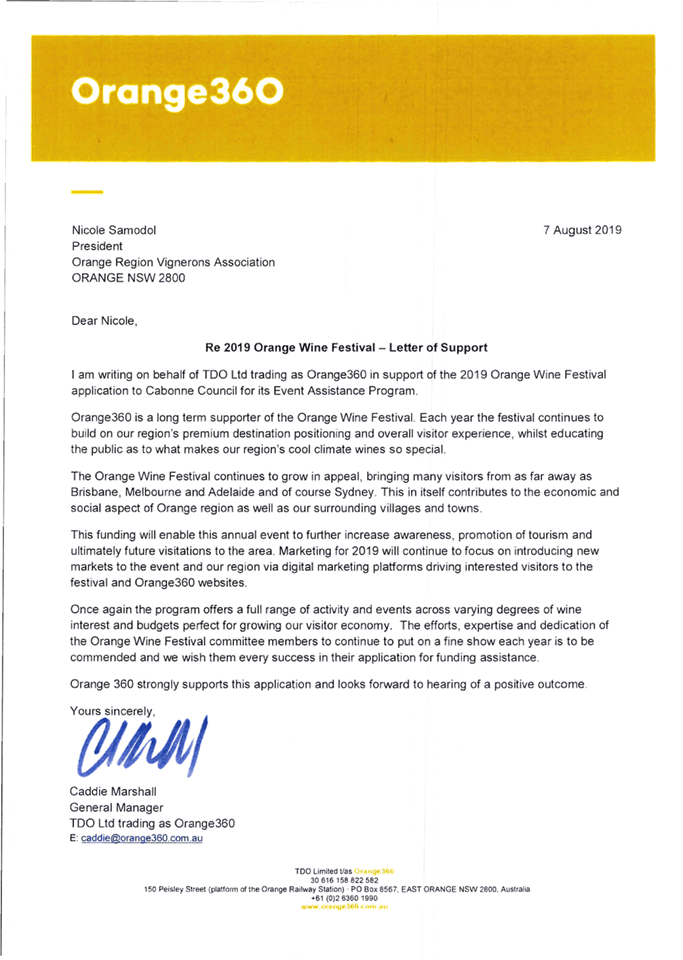
|
Item 17
Ordinary Meeting 27 August 2019
|
Item 17 - Annexure 2
|



|
Item 17
Ordinary Meeting 27 August 2019
|
Item 17 - Annexure 3
|




|
Item 19 Ordinary Meeting 27 August 2019
|
Item 19 - Annexure 1
|
 Policy Template(V2016)
Policy Template(V2016)
1 Document Information
|
Version Date
(Draft or
Council Meeting date)
|
[Version Date]
|
|
Author
|
General Manager
|
|
Owner
(Relevant director)
|
General Manager
|
|
Status –
Draft, Approved, Adopted by Council, Superseded or
Withdrawn
|
|
|
Next Review Date
|
|
|
Minute number
(once
adopted by Council)
|
|
2 Summary
Council’s regulatory
responsibilities are applicable to actual unlawful activity, as well as a
failure to take action where directed.
For the purposes of this
policy, a report alleging unlawful activity is where:-
· an individual expresses concern in
relation to alleged unlawful activity; or
· an individual requests service from
council about unlawful activity; or
· Council considers that a response or
resolution to a report alleging unlawful activity is explicitly or implicitly
expected by the individual, or legally required; or
· where Council becomes aware of a
compliance matter through other means of notification.
3 Approvals
|
Title
|
Date
Approved
|
Signature
|
|
|
|
|
4 History
Unless otherwise indicated, printed or
downloaded versions of this document are uncontrolled. Before using this
document check it is the latest version by referring to Council’s Policy Register
at www.cabonne.nsw.gov.au.
|
Minute No.
|
Summary of
Changes
|
New Version
Date
|
|
|
|
|
5 Reason
The intent
of this policy is to establish clear guidelines and protocols for Council staff
in the management of Council compliance responses and actions. It provides
workable guidelines on:
· responding
to reports alleging unlawful activity;
· assessing
whether reports alleging unlawful activity require investigation;
· deciding on
whether enforcement action is warranted;
· options for dealing
with confirmed cases of unlawful activity;
· taking legal
action;
· implementing
shared enforcement responsibilities.
Council’s
objectives when dealing with reports alleging unlawful activity are to:
· maintain the
collective good and welfare of the community;
· prevent or
minimise harm to health, welfare, safety, property or the environment;
· consider the
broader public interest having regard to Council’s priorities;
· consider the
report fairly and impartially;
· fulfil
Council’s Legislative responsibilities.
This policy
is supported by guidelines to assist council officers in implementing the
policy.
6
Scope
This policy applies to all areas within the Cabonne
Council local government area and the officers who are authorised to investigate
unlawful activity and proactive compliance monitoring including but not limited
to:
· development and building control
· pollution control
· environmental health
· public health and safety
· onsite sewage management systems
· weeds control (Biosecurity)
· companion animals
· roads and footpaths
· parks and reserves
· food safety
· fire safety
· tree preservation
· illegal dumping
· waste management practices
7
Associated Legislation
Council
staff may be delegated to initiate various levels of enforcement action under
the following Acts and associated regulations:
· Environmental
Planning and Assessment Act, 1979
· Local
Government Act, 1993
· Protection
of the Environment Operations Act, 1997
· Impounding
Act, 1993
· Companion
Animals Act, 1998
· Companion
Animals Regulation, 2008
· Roads Act
1993
· Road Rules
Act, 2014
· Roads
Transport Act 2013
· Food Act,
2003
· Public
Health Act, 2010
· Swimming
Pools Act, 1992
· Swimming
Pools Regulation 2008
· Traffic Act,
1909
· Summary
Offences Act, 1998
· Biodiversity
Conservation Act, 2016
· Biosecurity
Act, 2015
· Rural Fires
Act, 1997
· Plumbing and
Drainage Act, 2011
· Contaminated
Land Management ACT 1997
· Pollution To
The Environment Operations (Clean Air) Regulation 2010
· Pollution To
The Environment Operations (Noise Control) Regulation 2017
· Pollution To
The Environment Operations (Waste) Regulation 2014
· Crown Land
Management Regulation 2018
· Cemeteries
and Crematoria ACT 2013
8
Definitions
Complaint
Means an expression of
dissatisfaction made about Council services, staff or the handling of a request
for service/ notification of unlawful activity, where a response or resolution
is explicitly or implicitly expected or legally required.
For the purposes of this
policy, a complaint does not include:
· a report alleging unlawful activity (see
definition below)
· a request for information about a Council
policy or procedure
· a request for an explanation of actions
taken by Council
· a request for internal review of a Council
decision
Council means Cabonne Council.
Enforcement means actions taken in
response to serious or deliberate contraventions of laws.
Officer means a Council officer
delegated and if required authorised to undertake proactive compliance programs
and unlawful activity compliance and enforcement investigations.
Proactive compliance
monitoring
means a
proactive inspection program which is either a one-off or on-going.
Regulation means using a variety of tools and
strategies to influence and change behaviour to achieve the objectives of an
Act, Regulation or other statutory instrument administered by Council.
Report alleging unlawful activity means an expression of
concern or a request for service in relation to alleged unlawful activity,
where a response or resolution is explicitly or implicitly expected or legally
required.
Unlawful activity means any activity or work that has
been or is being carried out contrary to and/or failure to take required action
in order to be compliant with:
· the terms or
conditions of a development consent, approval, permit or licence.
· an
environmental planning instrument that regulates the activities or work that
can be carried out on particular land.
· a
legislative provision regulating a particular activity or work.
· a required
development consent, approval, permission or licence.
· signage
regulating a particular activity.
9
Responsibilities
9.1 General Manager
The General Manager is responsible for ensuring
compliance with this policy.
9.2 Employees
Council staff who deal with written and verbal
complains or action request with response to unlawful activity are responsible
for implementing this policy.
9.3 Others
Council consultants and contractors
authorised to carry out functions on behalf of council must also comply with
this policy.
9.4 Community
Council
expects that people who report allegations of unlawful activity will cooperate
and act in good faith in respect of any investigations conducted by Council.
This includes:
· providing a clear
description of the problem (and the resolution sought, if relevant);
· giving all
available and relevant information to Council, including any new information
about the alleged activity that may become known to the person following the
making of their report;
· not giving
any information that is intentionally misleading or wrong;
· cooperating
with Council’s inquiries and giving timely responses to questions and
requests for information;
· treating
Council staff with courtesy and respect;
· allowing the
investigation to be completed without prematurely taking the matter to other
agencies unless referred to by Council;
· being
prepared to engage in mediation where requested.
If these
expectations of the individual are not met, Council may set limits or
conditions on the continuation of the investigation or restrict any further
communications with the individual. Any unreasonable conduct will be
dealt with in accordance with the principles of the NSW Ombudsman’s
Managing Unreasonable Complainant Conduct Manual 2012 and any applicable
Council Policy.
9.5 Councillors
Decision
making relating to the investigation of reports alleging unlawful activity and
enforcement action is the responsibility of appropriately authorised Council
staff or the Council itself. Individual councillors do not have the right to
direct council staff in their day-to-day activities. Councillors can help
individuals who raise concerns with them by satisfying themselves that
Council’s policies are being carried out correctly, however they cannot
ignore or alter a policy in order to satisfy the demands of special groups or
individuals.
Councillors
are not an appeal body and all appeals need to be directed to the General
Manager as Councillors cannot become involved in the management of regulatory
or compliance actions.
10
Related Documents
11
Policy Statement
Council is
committed to:
· acting in
the interest of protecting community health, safety and or the environment;
· acting
consistently, fairly, impartially and transparently;
· preventing
discrimination on the basis of race, religion, sex, national origin, political
· association
or other personal reason/s;
· ensuring the
proposed enforcement action is in keeping with the guidelines of the Policy;
· ensuring
enforcement action is taken against the right person for the correct offence.
In addition
to responding to requests and enquiries about alleged unlawful activity Council
also provides a number of proactive compliance programs around high risk
regulatory areas. These areas include (but not limited to):
· Food
premises
· Cooling towers
(and the like)
· Public
swimming pool water quality monitoring
· Onsite
sewage management systems (septic tanks)
· Fire safety
· Swimming
pool safety
Compliance
action may be initiated where non-compliance is identified in the course of a
proactive compliance inspection, in which case the principles outlined in this
policy will also be applied.
Confidentiality
of people who report allegations of unlawful activity
There are
times when dealing with allegations of unlawful activity that the identities of
people who report such matters are unable to remain confidential from the
subject of their report in all circumstances. Council may be required to
disclose information that identifies those who report such matters in the
following cases:
· the
disclosure is necessary to investigate the matter;
· their
identity has already been disclosed to the subject of their report directly or
in a publicly available document;
· the
individual was consulted following receipt of a Government Information (Public
Access) Act 2009 application and did not object to the disclosure;
· the
individual consents in writing to their identity being disclosed;
· the
disclosure is required to comply with principles of procedural fairness;
· the matter
proceeds to court.
Council will
take seriously any concerns an individual may have about their physical safety
being endangered as a result of making a report. However, this may limit
Council’s ability to investigate the matter.
Investigating
unlawful activities
All matters regarding
unlawful activities will be reviewed to determine whether the matter requires
enquiry or investigation. Further enquiries/investigation will not be initiated
where:
· the matter
has already been investigated and resolved, or
· the matter
does not fall within the jurisdiction of Council has no jurisdiction;
· the activity
is determined to be lawful without an investigation; or
· The activity
presents a clear danger to the health and wellbeing of council staff and
contractors though further action is required.
Anonymous
reports will not be investigated.
Neighbourly
Disputes
In cases
where investigation reveals that the report of alleged unlawful activity is the
result of a neighbourly dispute, involved parties will be encouraged to
undertake mediation with the Community Justice Centre NSW or further reports
regarding the same matter may not be investigated.
Taking
enforcement action
When
deciding whether to take enforcement action in relation to a confirmed case of
unlawful activity, Council will consider the full circumstances and facts of
the matter and the public interest. The following common considerations will
assist Council staff in determining the most appropriate response in the public
interest.
Considerations
about the alleged offence and impact:
· the nature,
extent and severity of the unlawful activity, including whether the activity is
ongoing;
· the harm or
potential harm to the environment or public health, safety or amenity caused by
the unlawful activity;
· the
seriousness of the breach, including whether the breach is merely technical,
inconsequential or minor in nature; and
· the time
period that has lapsed since the date of the unlawful activity.
Considerations
about the alleged offender:
· any prior
warnings, instructions, advice that was issued to the person or organisation
· reported or
previous enforcement action taken against them;
· whether the
offence was committed with intent;
· whether the
person or organisation reported has been proactive in the resolution of the
matter and assisted with any Council requirements and instructions;
· any
mitigating or aggravating circumstances demonstrated by the alleged offender;
and
· any
particular circumstances of hardship affecting the person or organisation reported.
Considerations about the
impact of any enforcement action:
· the need to deter any future unlawful
activity;
· the prospect of success if the
proposed enforcement action was challenged in court; and
· what action would be proportionate
and reasonable in response to the unlawful activity.
Considerations about the
potential for remedy:
· whether the breach can be easily
remedied; and
· whether there is a draft planning
instrument on exhibition that would make the unauthorised use legal.
GENERAL MANAGER’S REPORT ON
MATTERS FOR NOTATION SUBMITTED TO THE Ordinary Council Meeting TO BE HELD ON Tuesday 27 August,
2019
Page 1
TABLE OF CONTENTS
ITEM
1 RESOLUTIONS
REGISTER - INFOCOUNCIL - ACTIONS REPORTING 1
ITEM
2 RATES
SUMMARY................................................................................ 1
ITEM
3 INVESTMENTS
SUMMARY................................................................. 2
ITEM
4 COMMUNITY
FACILITATION FUND................................................. 2
ITEM
5 FORTESQUE
METALS GROUP......................................................... 3
ITEM
6 PROPOSED
MOUNTAIN BIKE DEVELOPMENT FOR MOUNT CANOBOLAS 5
ITEM
7 COUNTRY
MAYORS ASSOCIATION................................................ 6
ITEM
8 LOCAL
GOVERNMENT AND INFRASTRUCTURE DELIVERY PROJECT 6
ITEM
9 NSW
GOVERNMENT SNOWY HYDRO LEGACY FUND.............. 8
ITEM
10 CABONNE/BLAYNEY FAMILY
DAY CARE AND AFTER SCHOOL CARE SERVICES............................................................................................... 8
ITEM
11 COMMUNITY TRANSPORT
AND HOME AND COMMUNITY CARE 10
ITEM
12 CABONNE ACQUISITIVE
ART PRIZE........................................... 11
ITEM
13 ENGINEERING AND TECHNICAL
SERVICES DEPARTMENT REPORT AUGUST 2019........................................................................................................ 13
ITEM
14 REPLACEMENT OF
BANGAROO BRIDGE OVER BELUBULA RIVER
................................................................................................................. 14
ITEM
15 HERITAGE ADVISOR'S
REPORT................................................... 16
ITEM
16 DEVELOPMENT APPLICATIONS
APPROVED DURING JULY 2019 16
ITEM
17 DEVELOPMENT
APPLICATIONS RECEIVED DURING JULY 2019 17
ITEM
18 MEDIAN PROCESSING
TIMES 2019.............................................. 19
ITEM
19 BURIAL STATISTICS......................................................................... 20
ANNEXURE ITEMS
ANNEXURE
1.1 Council ............................................................................... 22
ANNEXURE
1.2 Traffic Light
Report Summary ............................ 46
ANNEXURE
2.1 Rates graph July
2019................................................ 47
ANNEXURE
3.1 Business Paper
July Investments 2019............ 48
ANNEXURE
7.1 CMA Minutes 2
August 2019....................................... 50
ANNEXURE
8.1 DPC delivery
project observations................ 57
ANNEXURE
8.2 DPC workshop
outcomes summary................... 74
ANNEXURE
9.1 Snowy Hydro FAQs........................................................ 94
ANNEXURE
12.1 Cabonne Council Acquisitive
Art Prize final TC and Entry Form....................................................................................... 95
ANNEXURE
13.1 Engineering Report for August
2019 Council Meeting 101
ANNEXURE
15.1 Heritage Advisor's Report -
August 2019.... 109
ITEM 1 - RESOLUTIONS REGISTER
- INFOCOUNCIL - ACTIONS REPORTING
REPORT IN BRIEF
|
Reason For Report
|
To provide
Council with a report on progress made in actioning its resolutions up to
last month's Council meeting and any committee meetings held.
|
|
Policy
Implications
|
Nil
|
|
Budget
Implications
|
Nil
|
|
IPR Linkage
|
4.5.1.a.
Provide quality administrative support and governance to councillors and
residents
|
|
Annexures
|
1. Council ⇩
2. Traffic Light Report
Summary ⇩
|
|
File Number
|
\OFFICIAL
RECORDS LIBRARY\GOVERNANCE\COUNCIL MEETINGS\RESOLUTION REGISTER - 1033437
|
General Manager REPORT
InfoCouncil
generated reports are annexed including actions up to the previous
month’s meetings resolutions.
Progress comments
are provided until the final action comment which will also show
“COMPLETE”: that item will then be removed from the register once
resolved by the council.
Attached also is
the “traffic light” indicator system that enables the council to
identify potential areas of concern at a glance.
Councillors
should raise any issues directly with the directors as per the mayor’s
request.
ITEM 2 - RATES SUMMARY
REPORT IN BRIEF
|
Reason For Report
|
Information
provided in relation to Council's Rates collections.
|
|
Policy Implications
|
Nil
|
|
Budget Implications
|
Nil
|
|
IPR Linkage
|
4.5.4.a -
Level of rate of collection
|
|
Annexures
|
1. Rates
graph July 2019⇩
|
|
File Number
|
\OFFICIAL
RECORDS LIBRARY\FINANCIAL MANAGEMENT\FINANCIAL REPORTING\FINANCIAL REPORTS TO
COUNCIL - 1032369
|
Senior Rates Officer's REPORT
The Rate
Collection Summary to 31 July 2019 is attached for Council’s
information. The percentage collected is 10.06% which is slightly higher
than previous years.
The higher
percentage is due to a substantial amount being received for five properties
that have now been withdrawn from the sale of land for overdue rates auction.
ITEM 3 - INVESTMENTS SUMMARY
REPORT IN BRIEF
|
Reason For Report
|
Information
provided in relation to Council's Investment Schedule.
|
|
Policy Implications
|
Nil
|
|
Budget
Implications
|
Nil
|
|
IPR Linkage
|
4.5.4.b.
Maximise secure income through investments
|
|
Annexures
|
1. Business Paper July Investments 2019⇩
|
|
File Number
|
\OFFICIAL
RECORDS LIBRARY\FINANCIAL MANAGEMENT\FINANCIAL REPORTING\FINANCIAL REPORTS TO
COUNCIL - 1031524
|
Senior Accounting Officer's REPORT
Council’s
investments as at 31 July 2019 stand at a total of $43,343,294.27.
Council’s
average interest rate for the month of July was 2.21%. The effect of the low
cash rate is having a negative impact on term deposit rates offered by
financial institutions. The Reserve Bank’s official cash rate was dropped
to 1% during the month of July. However, Council’s average rate is higher
than Council’s benchmark rate of the 30 Day Bank Bill Swap Rate of
1.015%.
Council’s
investments are held with multiple Australian financial Institutions with
varying credit ratings according to Council’s Investment Policy. The
annexure to this report shows a break up of each individual institution that
Council invests with and its “Standard and Poor’s” Credit
Rating.
The Schedule of
Investments for July 2019 is attached for Council’s information.
ITEM 4 - COMMUNITY
FACILITATION FUND
REPORT IN BRIEF
|
Reason For Report
|
To report on
approved expenditure under the Community Facilitation Fund (CFF).
|
|
Policy
Implications
|
Nil
|
|
Budget
Implications
|
Within existing budget allocation
|
|
IPR Linkage
|
3.3.5.a.
Review community need for new and upgraded facilities
|
|
Annexures
|
Nil
|
|
File Number
|
\OFFICIAL
RECORDS LIBRARY\GRANTS AND SUBSIDIES\PROGRAMS\COMMUNITY FACILITATION FUND - 1031756
|
General Manager’S REPORT
Council adopted
guidelines for the Community Facilitation Fund (CFF) in March 2015. The
CFF was created for smaller community projects not originally included in the
council’s budget, to be allocated at the discretion of the Mayor and
Deputy Mayor.
As a reminder,
the guidelines for the CFF are as follows:
1. Projects where no existing vote for the works has been
allocated or the vote is insufficient to complete the project.
2. Recipients must be community based not-for-profit
groups.
3. Mayor and Deputy Mayor to jointly approve funds (with the General Manager as proxy if one is not available).
4. Allocation of funds to be reported to the next
available council meeting.
5. Limit of $3,000 per allocation unless other approved by
council.
There were nil allocation of
funds were processed in the past month.
ITEM 5 - FORTESQUE METALS
GROUP
REPORT IN BRIEF
|
Reason For Report
|
To request
Council invite Fortesque Metals Group to present on the upcoming regional
exploration at an upcoming Councillor workshop
|
|
Policy Implications
|
Nil
|
|
Budget
Implications
|
Nil
|
|
IPR Linkage
|
5.5.1.c -
Maintain a detailed knowledge and understanding of issues related to mining
|
|
Annexures
|
Nil
|
|
File Number
|
\OFFICIAL
RECORDS LIBRARY\DEVELOPMENT AND BUILDING CONTROLS\DEVELOPMENT ENQUIRIES\2019 - 1033415
|
General Manager REPORT
On Monday 29 July
2019 the General Manager was invited to a meeting with Fortescue Metals Group
in Canowindra prior to a community engagement event they were conducting around
their current exploration in Cabonne Shire.
Fortescue Metals
Group (Fortescue) are in two joint ventures with Gold and Copper Resources and
its subsidiaries. The Walli joint venture was assumed on 9 November 2016 and
the Faith joint venture was assumed on 21 May 2015.
Over the last
four years different exploration methods have been carried out within the
tenements that sit in the Cabonne Shire, including low impact activities such
as geological mapping, soil sampling and on ground geophysics. Drilling, classed
as medium impact has also taken place in the Nashdale area.
Consulting with
the community is a mandatory requirement by the Department of Resources and
Geoscience. The Exploration Code of Practise for Community Consultation was
developed to ensure engagement with key stakeholders in relation to the
planning for, and conduct of, exploration activities under a prospecting title.
Fortescue’s
community consultation in Cabonne has included:
· Negotiating a land access agreement with the landholders of the
exploration activity,
· Publishing notifications in the newspapers for drilling, a gravity
survey along road reserves and airborne surveys,
· Visiting neighbours of the drill sites to discuss the potential
impacts of the activity
· Meet with Cabonne Council Management to update them on exploration
activities,
· Meet with community groups including The Nashdale Action Group,
Aboriginal Lands Council and ECCO,
· Spoke at an NSW Farmers hosted meeting in Canowindra on 29 July
2019, with approximately 60 attendees,
· Assisted in writing the ‘Fields of Cargo’ book to
commemorate the 150 year celebration of the Cargo Gold fields.
The General
Manager suggested the Fortescue Metals Group should consider a presentation to
Council at a future workshop regarding their activities in the Cabonne Shire
and to outline the future plans they may have for the area. Whilst no
decisions are required from Council at this time it is important that Council
is kept advised of any significant developments as they proceed.
ITEM 6 - PROPOSED MOUNTAIN
BIKE DEVELOPMENT FOR MOUNT CANOBOLAS
REPORT IN BRIEF
|
Reason For Report
|
To request
Council invite the Acting General Manager of Orange City Council to a
workshop for further discussions.
|
|
Policy Implications
|
Nil
|
|
Budget
Implications
|
Nil
|
|
IPR Linkage
|
2.2.1.a -
Promote strategies listed in the Tourism Plan
|
|
Annexures
|
Nil
|
|
File Number
|
\OFFICIAL
RECORDS LIBRARY\ECONOMIC DEVELOPMENT\LIAISON\ORANGE CITY COUNCIL - 1033393
|
General Manager REPORT
On Thursday 25 July
2019, the Mayor and General Manager of Cabonne were invited by the Local Member
the Honourable Phil Donato to attend a meeting at the summit of Mount
Canobolas. Mr Donato invited the NSW State Environment Minister, The Hon
Matthew Kean, the Mayor and Acting General Manager from Orange City Council (OCC)
and senior National Parks officials to discuss a proposed mountain bike track
development for the area.
Local media
covered the event and senior staff from OCC briefed those in attendance on the
conceptual plan they have developed for the mountain bike trail, which they see
as having a major potential tourism and economic benefit to Orange City and the
wider region including Cabonne.
Minister Kean
was in attendance to hear the proposed benefits of the concept, however it was
noted for any such proposal to progress it would require a change to the
area’s plan of management. This important step would be required, as
currently the proposed location is identified as a state conservation area.
Cabonne Council has
no current formal position with regard to the proposed development. The
Mayor and General Manager agreed to invite the Acting General Manager of OCC Mr
David Waddell to a future Councillor’s workshop to present the concept
and provide a more detailed outline of the proposal.
It was also
thought this presentation would provide an opportunity for Mr Waddell to
provide Council some further information regarding the Orange Health Precinct
Project which will similarly have significant potential impacts on Cabonne
Shire.
ITEM 7 - COUNTRY MAYORS
ASSOCIATION
REPORT IN BRIEF
|
Reason For Report
|
To update
Council on matters discussed at the Country Mayors Association meeting held
on 31 May 2019.
|
|
Policy
Implications
|
Nil
|
|
Budget
Implications
|
Nil
|
|
IPR Linkage
|
4.5.1.d
Maintain effective membership of Centroc, Strategic Alliance, Hawkesbury City
Council, Weddin Shire Council and Cabonne Council Country-City Alliance,
LGNSW and other forums
|
|
Annexures
|
1. CMA Minutes 2 August 2019⇩
|
|
File Number
|
\OFFICIAL
RECORDS LIBRARY\GOVERNMENT RELATIONS\LOCAL AND REGIONAL LIAISON\COUNTRY
MAYORS ASSOCIATION OF NSW - 1031651
|
General Manager's REPORT
The Mayor and
General Manager attended the Country Mayors Association meeting at Parliament
House Sydney on 2 August 2019.
Special guests
included:
· Hon Mark Coulton MP, Minister for Regional services,
Decentralisation and Local Government, Assistant Trade and Investment Minister
· Hon Adam Marshall MP, Minister for Agriculture and western New South
Wales
· Geoff McKechnie APM, Assistant Commissioner, Commander, Western
Region, New South Wales Police Force
· Richard Colbran, Chief Executive Officer, NSW Rural Doctors Network
Minutes of the
meeting are attached for Councillors’ information. Any queries
regarding items discussed should be directed to the Mayor or General Manager.
ITEM 8 - LOCAL GOVERNMENT AND INFRASTRUCTURE DELIVERY
PROJECT
REPORT IN BRIEF
|
Reason For Report
|
For councillors
to be aware of observations and outcomes of recent workshops facilitated by
Department Premier & Cabinet.
|
|
Policy
Implications
|
Nil
|
|
Budget
Implications
|
Nil
|
|
IPR Linkage
|
4.5.1.b -
Maintain strong relationships and liaise effectively with all relevant
Government agencies and other councils
|
|
Annexures
|
1. DPC delivery project observations⇩
2. DPC workshop outcomes
summary⇩
|
|
File Number
|
\OFFICIAL
RECORDS LIBRARY\GOVERNMENT RELATIONS\LOCAL AND REGIONAL LIAISON\DEPARTMENT OF
PREMIER AND CABINET - 1032917
|
General Manager's REPORT
As a result of
significant level of infrastructure investment across regional NSW and
investment in regions through various grant programs, Department of Premier
& Cabinet Regional (DPC) recognised that local councils will struggle to
deliver the volume of projects funded.
To address these
concerns, the Strategy & Operations group from DPC undertook initial
interviews with 27 local councils then engaged Elton Consulting to facilitate a
workshop with local council and state agency representatives. The workshop
purpose was to agree on the infrastructure delivery challenges facing the
regions, ‘road-test’ concepts to address the identified challenges
and establish priorities to progress in the short, medium and long term.
The following
documents are attached for information. They are:
· Observations – a summary of key issues and challenges
discovered.
· Workshop Outcomes Summary – outcomes of the workshop to agree
on key challenges and develop options to address them.
The key
challenges that participants nominated were:
· Access to specialist skills, trades, materials and contractors.
· Planned versus grant program projects.
· Workload for council staff.
· New assets versus maintenance of existing assets.
· Open tender limit not reflect current market conditions.
· Project management capability.
· Current systems not providing a view of each councils overall project
load.
· Delayed grant payments impacting on cash flow.
· Cost blow outs.
· Capacity to shift to align with council need rather than
prescription by State Government.
· Demonstration of benefit-cost ratio.
· Distance, climate and topography impeding access to skills and
trades in regions.
As a result,
four priorities for action were developed being:
· Develop an online project management toolkit
· Develop a local infrastructure pipeline to give visibility of
current infrastructure priorities.
· Engage with councils in the design of grant programs
· Fund the front-end development of projects that are not
‘shovel ready’ (and define ‘shovel ready’).
DPC Strategy
& Operations have committed to continuing the conversations and a collaborative
working relationship with councils to progress priority options.
ITEM 9 - NSW GOVERNMENT SNOWY
HYDRO LEGACY FUND
REPORT IN BRIEF
|
Reason For Report
|
To provide
information about the allocation of funds by the NSW Government.
|
|
Policy Implications
|
Nil
|
|
Budget
Implications
|
Nil
|
|
IPR Linkage
|
4.5.1.b -
Maintain strong relationships and liaise effectively with all relevant
Government agencies and other councils
|
|
Annexures
|
1. Snowy Hydro FAQs⇩
|
|
File Number
|
\OFFICIAL
RECORDS LIBRARY\GOVERNMENT RELATIONS\LOCAL AND REGIONAL LIAISON\NSW
GOVERNMENT - 1031660
|
General Manager's REPORT
The NSW
Government’s $4.2 billion Snowy Hydro Legacy fund was developed to
delivery infrastructure and priority initiatives identified in the 20-Year
Economic Vision for Regional NSW, NSW State Infrastructure Strategy
2018–2038 and other long-term government plans.
The five areas
of immediate focus will be improved water security, rail and road transport
connections, freight linkages, digital connectivity and Special Activation
Precincts to attract more industry investment in the regions.
The attached Fact Sheet has been developed
which outlines eligible projects, investment priorities and next steps.
ITEM 10 - CABONNE/BLAYNEY
FAMILY DAY CARE AND AFTER SCHOOL CARE SERVICES
REPORT IN BRIEF
|
Reason For Report
|
To update
Council on the operations and financial sustainability of FDC and ASC
Services
|
|
Policy
Implications
|
Nil
|
|
Budget
Implications
|
Nil
|
|
IPR Linkage
|
3.1.1.d -
Review financial sustainability of FDC, IH and AS Care services
|
|
Annexures
|
Nil
|
|
File Number
|
\OFFICIAL
RECORDS LIBRARY\COMMUNITY SERVICES\SERVICE PROVISION\FAMILY DAY CARE -
FAMILIES AND CARERS - 1032319
|
Community Services Manager's REPORT
Cabonne/Blayney
Family Day Care (CBFDC) provides home based care to
families with children aged 0-13years. The service provides this home based
care in a number of rural villages including Molong, Orange, Canowindra,
Yeoval, Manildra, Parkes, Blayney, Forbes and Narromine.
CBFDC also provides
In-Home Care where care is provided by an approved Educator in the
family’s home. The Service currently has in-home care educators in
Molong, Orange and Dubbo.
Statistics for
2018 / 2019:
· Average number of Children booked per month 165
· Total number of booked sessions per month 675
· Average number of Educators
23
CBFDC was
successful in receiving funding though the Community Child Care Fund (CCCF) for
the period 2018-2021. The funding received for 2018/2019 was $44,000,
significantly less than the $95,945 received for the 2017/2018 financial year
through the Community Support Program. Funding will decrease to $37,000 in
2019/2020 and $31,000 in 2020/2021. After 2021, CCCF Funding will cease and the
service will need to source alternate funding to remain viable.
The Cabonne /
Blayney Family Day Care Service had an operating defect of $542.42 for the 2018/2019
financial year; which brings the services’ total reserves to $93,095.89.
These reserves are essential for the ongoing financial sustainability of the
service.
CBFDC is currently promoting the service to
secure new educators by waiving the sign-up fee for educators for the months of
August – October, saving Educators $180. This has brought two new
prospective educators.
After School
Care
The After School
Care Service had an operating surplus of $46,451 last financial year, which
brings the total reserves to $110,292.
The Community
Child Care Funding (CCCF) received for all three services for 2018/2019 was $35,100.
This will reduce to $31,100 in 2019/2020 and $21,400 in 2020/2021. After 2021, CCCF Funding will cease and the service will need to
source alternate funding to remain viable.
Blayney Council
also contributes $5,000 each towards Blayney and Millthorpe services.
Mullion Creek
statistics for the period 1 July 2018 to 30 June 2019:
· Approved
for 20 places per day
· Total
number of booked sessions 1,811
Blayney statistics
for the period 1 July 2018 to 30 June 2019:
· Approved
for 20 places per day
· Total
number of booked sessions 1,329
Millthorpe statistics
for the period 1 July 2018 to 30 June 2019:
· Approved
for 27 places per day
· Total
number of booked sessions 3,845
Manildra
After School Care Update
Cabonne Council
has been in lengthy negotiations with the Department of Education since August
2018 regarding a new After School Care Service at Manildra Public School. Upon
advice from the Department of Education, Manildra Public School advertised for
an Expression of Interest to operate the service. Cabonne Council offered the
only expression of interest.
On 9 April
2019 Council received the Right to Occupy letter and draft lease
agreement. After negotiations and receiving the formal License Agreement
it was signed and returned to the Department of Education on 30 June 2019.
Council have applied to the Early Childhood
Electorate for service approval and are awaiting their reply.
ITEM 11 - COMMUNITY TRANSPORT
AND HOME AND COMMUNITY CARE
REPORT IN BRIEF
|
Reason For Report
|
To update
Council on the operation of and financial sustainability of Community
Transport and Home and Community Care
|
|
Policy
Implications
|
Nil
|
|
Budget
Implications
|
Nil
|
|
IPR Linkage
|
3.2.2.a -
Implement the HACC program
|
|
Annexures
|
Nil
|
|
File Number
|
\OFFICIAL
RECORDS LIBRARY\COMMUNITY SERVICES\SERVICE PROVISION\COMMUNITY TRANSPORT - 1032747
|
Community Services Manager's REPORT
Community
Transport
The Cabonne
Community Transport Service had an operating surplus of $58,429 for the 2018/2019
financial year; this creates a balance in reserves of $161,265.
The Community
Care Supports Programs ADHC funding of $9,230, ceased 30 June 2018, due to the
roll out of the NDIS. The Services’ reserves creates a buffer, which will
allow for this loss of funding and will allow the service to remain sustainable
during the uncertainty of the continuation of block funding post 2020.
Statistics for
2018/2019:
· Total number of trips (excluding buses) 1,503
· Total vehicle KMs 49,276
· Number of Clients 438
· Number of Volunteers
17
HACC
Home and
Community Care (HACC) had an operating surplus of $32,056 for the 2018/2019
financial year, this creates a balance in reserves of $186,749 Contracts with
the Department of Health are until 30 June 2020. This significant reserve
balance will allow the service to remain sustainable post 2020 if block funding
ceases to continue.
Statistic for 2018/2019:
· Hot Meals on Wheels provided 1,065
· Frozen Meals on Wheels provided 8,150
· Meals provided during social support 6,132
· Hours of Social Support provided 6,192
· Hours of Home Maintenance provided 544
· Number of Clients 238
· Number of Volunteers 101
ITEM 12 - CABONNE ACQUISITIVE
ART PRIZE
REPORT IN BRIEF
|
Reason For Report
|
To inform
Council of proposed arrangements for the inaugural 2019-20 Cabonne
Acquisitive Art Prize
|
|
Policy
Implications
|
Nil
|
|
Budget
Implications
|
Nil
|
|
IPR Linkage
|
4.4.1.c - Provide
assistance to community groups
|
|
Annexures
|
1. Cabonne Council Acquisitive Art Prize final TC
and Entry Form⇩
|
|
File Number
|
\OFFICIAL
RECORDS LIBRARY\ECONOMIC DEVELOPMENT\REPORTING\COUNCIL REPORTS - 1032605
|
Community Engagement and Development Manager's REPORT
The inaugural
Cabonne Acquisitive Art Prize will be officially launched at a special function
on Thursday 5 September 2019.
At its meeting
on 28 August 2018, Council resolved to conduct the competition in 2019-20 and
on 26 February 2019 resolved to consider a draft budget and adopt dates and
timelines. An amount of $20,000 was included in Council’s 2019-20 Budget
to cover the cost of staging the initial event.
A small working
group, consisting of Clrs Libby Oldham and Peter Batten, as well as Regional
Development Australia Central West Chair Mrs Christine Weston, has now been
formed to administer and operate the Art Prize with the support of
Council’s Economic Development and Tourism section.
The working
group has developed a draft budget, prizemoney, entry fees, entry form,
timeline and terms and conditions for the competition which will be announced
in March 2020. The terms and conditions and entry form are attached as an
annexure.
The draft budget
consists of:
Launch, exhibition and
official opening costs $9,000
Prizemoney $6,000
Promotion and
advertising costs $4,000
Possible judging
expenses $1,000
Total $20,000
Prizemoney will
be allocated as follows:
Cabonne Acquisitive Art
Prize $4,250
($30 entry fee)
Local Art Prize High
School Section $500
($15 entry fee)
Local Art Prize Primary
School Section $250
($10 entry fee)
People’s Choice
Prize $1,000
The following
key dates have been proposed:
Official launch 5
September 2019
Applications open 6
September 2019
Applications close 24
January 2020
Works to be submitted 3-7
February 2020
Selection notification 28
February 2020
Exhibition opens 14
March 2020
Announcement, official
opening 19
March 2020
Exhibition closes 21
March 2020
Works to be collected
by 24
March 2020
Initially, the
art prize will be open to any artist living or working in the Cabonne Local
Government Area or who has attended a school in the LGA.
In keeping with
the decision to engage industry professionals as independent judges, Mr Brad
Hammond, the Director of the Orange Regional Art Gallery, has been enlisted to
judge the acquisitive prize. Other industry professionals may be used to judge
the high school and primary school works.
The working
group has proposed staging the inaugural art prize at the Molong Community
Hall.
The NSW Minister
for the Arts the Hon Don Harwin has been invited to the launch, which will be a
catered event at the Molong Council Chambers, starting at 6pm on September 5.
Other invited
guests include Parliamentary Secretary for the Arts the Hon Ben Franklin;
Federal Member for Calare Andrew Gee; State Member for Orange Phil Donato; Arts
Out West Executive Director Tracey Callinan; Brad Hammond; Canowindra Arts
President Arthur Falconer; Cabonne school principals and art teachers;
representatives of the Shire’s progress associations; and Councillors.
ITEM 13 - ENGINEERING AND
TECHNICAL SERVICES DEPARTMENT REPORT AUGUST 2019
REPORT IN BRIEF
|
Reason For Report
|
To update
Council on works in progress in the Engineering & Technical Services
Department
|
|
Policy
Implications
|
Nil
|
|
Budget
Implications
|
Nil
|
|
IPR Linkage
|
4.5.1.a -
Provide quality administrative support and governance to councillors and
residents
|
|
Annexures
|
1. Engineering Report for August 2019 Council
Meeting ⇩
|
|
File Number
|
\OFFICIAL
RECORDS LIBRARY\GOVERNANCE\REPORTING\ENGINEERING AND TECHNICAL SERVICES
REPORTING - 1033535
|
Director of Engineering & Technical
Services' REPORT
Please find
attached to this report the update on 2018/2019 works in progress in the
Engineering and Technical Services department.
ITEM 14 - REPLACEMENT OF
BANGAROO BRIDGE OVER BELUBULA RIVER
REPORT IN BRIEF
|
Reason For Report
|
Provision of
information on the project planning of the replacement of the Bangaroo Bridge
on Rivers Road.
|
|
Policy
Implications
|
Nil
|
|
Budget
Implications
|
Nil
|
|
IPR Linkage
|
1.1.4.c -
Local road bridge construction undertaken
|
|
Annexures
|
Nil
|
|
File Number
|
\OFFICIAL
RECORDS LIBRARY\ROADS and BRIDGES\MAINTENANCE\BRIDGES AND CROSSINGS - 1033443
|
Technical Services Manager's REPORT
The following report from Cowra
Council recommends the replacement of Bangaroo Bridge by ‘Design and
Construct’ contract, project managed by Cowra Council. Fifty percent
grant funding to a total project cost of $1.4M is confirmed to date through the
Federal Bridges Renewal program; with the expectation that the balance will be
made up of grant funds from the NSW Fixing Country Roads program; or the yet to
be announced Timber Bridge program. Cabonne Council have allocated that the
matching 50% funding is available in its adopted Delivery Program and
operational Plan for 2019/20. The estimated cost of bridge replacement is
$1.4M.
Bangaroo Bridge Replacement
Bangaroo Bridge is located on Rivers Road and provides
an essential road transport link across the Belubula River to Warraderry Way.
The bridge is a boundary bridge; a shared asset between Cabonne and Cowra
Councils.
For some years the timber bridge has had speed
restriction and load limits imposed to extend the life of the timber elements
that were in poor structural condition. One of the timber girders has now
failed and the bridge is closed.
Temporary Belubula Crossing Options
Cowra and Cabonne Engineering staff have investigated various
options to open a river crossing in the short term:
· Replace the damaged girder with one from Cowra Council stock on
hand.
· “Wood Research and
Development’ were engaged to complete a level 3 bridge inspection and
load assessment on the condition the bridge which identified significant
structural issues in much of the remaining timber piles and girders. It is
likely another failure will occur in the short term.
· Construct a low-level side track bypass: this option is likely to
incur costs of the order of $150,000 due to the steepness of the river banks in
the locality. The side track would be washed out in the first flood event.
· Construct a temporary Bailey Bridge type structure: this option can
be completed at an estimated cost in the order of $230,000 subject to detailed
abutment designs.
Cowra and Cabonne engineering staff met with affected
local residents on 12 July. It was agreed that the costs of the temporary
crossing and the engineering resources required to implement them would be
better allocated to:
· replacing with a permanent structure as quickly as possible
· increasing the level of maintenance on Settlement Bridge road; being
the alternate route.
Permanent Bangaroo Bridge Crossing
The replacement bridge is proposed with the following
specifications:
· Designed for SM1600 loading in accordance with the current AS5100
Bridge Design Code
· 2 x 3.5m travel lanes plus 1m shoulder width each side; 9m clear
travel width
· The bridge girders to have a flat soffit to ensure no flood debris
is caught up under the deck.
Steps in the project delivery
Cabonne Council have advised of a lack of engineering
resources to deliver the tender in a timely manner. For this reason Cowra
Council is recommended as the lead in contract and project management. A
Steering Committee comprising of officials of both councils will be formed to
provide advice, ensure delivery of the project outputs and the achievement of
project outcomes. The Project Manager will report to the Steering Committee
regarding the progress of all phases of the project.
The following information is required to finalise the bridge design:
· A geotechnical investigation and design report has been completed to
allow the foundations and pile design to be carried out
· A Request For Quotation has been advertised and assessed to provide
the design information of river flows, overtopping and scour design with the
recommended consultant report estimated cost of $45,000.
· Geometric design of the approach roads and bridge; along with the
bridge structural design will be completed as part of the tender
Provided the contract for hydrological and hydraulic
investigation can be completed it is expected the Design and Construct tender
can be advertised in October 2019 and awarded in December 2019.
Council will then be advised of the construction program.
ITEM 15 - HERITAGE ADVISOR'S
REPORT
REPORT IN BRIEF
|
Reason For Report
|
Providing
councillors with a copy of the Heritage Advisor's report.
|
|
Policy
Implications
|
Nil
|
|
Budget
Implications
|
Nil
|
|
IPR Linkage
|
4.3.2.b -
Heritage advisory service provided
|
|
Annexures
|
1. Heritage Advisor's Report - August 2019⇩
|
|
File Number
|
\OFFICIAL
RECORDS LIBRARY\DEVELOPMENT AND BUILDING CONTROLS\REPORTS\HERITAGE - 2018 - 1032477
|
Director of Environmental Services' REPORT
A copy of the Heritage Advisor’s Report for August 2019 is attached for
the information of the council.
ITEM 16 - DEVELOPMENT
APPLICATIONS APPROVED DURING JULY 2019
REPORT IN BRIEF
|
Reason For Report
|
Details of
development applications approved during the preceding month.
|
|
Policy
Implications
|
Nil
|
|
Budget
Implications
|
Nil
|
|
IPR Linkage
|
4.5.3.a.
Provide efficient and effective development assessment
|
|
Annexures
|
Nil
|
|
File Number
|
\OFFICIAL
RECORDS LIBRARY\DEVELOPMENT AND BUILDING CONTROLS\BUILDING AND DEVELOPMENT
APPLICATIONS\REPORTING - DEVELOPMENT APPLICATIONS TO COUNCIL - 1032448
|
Director of Environmental Services' REPORT
Development
Applications have been approved during the period 01/07/2019 to 31/07/2019 as
detailed below.
Summary of approved development
applications
|
TYPE
|
ESTIMATED VALUE
|
|
S68 Only x 8
|
$-----
|
|
Modification to 6 Lot Subdivision
|
$-----
|
|
Modification to Alterations &
Additions
|
$-----
|
|
Modification to 4 Lot Subdivision
|
$-----
|
|
Modification to Alterations & Additions
|
$-----
|
|
Modification to Storage Shed
|
$-----
|
|
Modification & Additions to Existing
Motel
|
$-----
|
|
Temporary Event – Comedy Festival
|
$-----
|
|
Change of Use
|
$-----
|
|
Subdivision
|
$-----
|
|
Additions to Existing Sporting Facility
(Clay Target Shooting Range)
|
$100,000
|
|
Dwelling
|
$440,000
|
|
Storage Shed
|
$16,186
|
|
Additions to Existing Dwelling
|
$70,000
|
|
Dwelling, Storage Shed & Rainwater
Tank
|
$423,000
|
|
Relocated Dwelling
|
$80,000
|
|
Dwelling
|
$444,400
|
|
Garage
|
$30,450
|
|
Machinery Shed
|
$66,000
|
|
Dual Occupancy & Upgrade of Existing
Amenities in Shed
|
$650,000
|
|
Alterations & Additions to Medical
Centre
|
$190,000
|
|
2 Lot Subdivision
|
$16,900
|
|
Extension to Existing Shed
|
$10,000
|
|
TOTAL: 30
|
$2,536,936
|
Summary of
approved complying development applications
|
TYPE
|
ESTIMATED VALUE
|
|
In-Ground Fibreglass Swimming Pool
|
$29,500
|
|
In-Ground Fibreglass Swimming Pool
|
$24,500
|
|
Dwelling
|
$139,985
|
|
Total:3
|
$193,985
|
|
GRAND TOTAL:33
|
$2,730,921
|
|
Previous Month: 25
|
$2,405,750
|
ITEM 17 - DEVELOPMENT
APPLICATIONS RECEIVED DURING JULY 2019
REPORT IN BRIEF
|
Reason For Report
|
Details of
development applications received during the preceding month.
|
|
Policy
Implications
|
Nil
|
|
Budget Implications
|
Nil
|
|
IPR Linkage
|
4.5.3.a.
Provide efficient and effective development assessment
|
|
Annexures
|
Nil
|
|
File Number
|
\OFFICIAL
RECORDS LIBRARY\DEVELOPMENT AND BUILDING CONTROLS\BUILDING AND DEVELOPMENT
APPLICATIONS\REPORTING - DEVELOPMENT APPLICATIONS TO COUNCIL - 1032461
|
Director of Environmental Services' REPORT
Development Applications have been received
during the period 01/06/2019 to 30/06/2019 as detailed below.
SUMMARY OF DEVELOPMENT APPLICATIONS
RECEIVED
|
TYPE
|
ESTIMATED VALUE
|
|
Section 68 Only x 7
|
$----
|
|
Modification to 6 Lot Subdivision
|
$----
|
|
Modification to Alterations &
Additions
|
$----
|
|
Modification to Alterations &
Additions to Existing Motel
|
$----
|
|
Modification to Storage Shed
|
$----
|
|
Modification to Demolition of Existing
and Construction of New Service Station
|
$----
|
|
Subdivision
|
$----
|
|
Boundary Adjustment
|
$----
|
|
2 Lot Subdivision
|
$----
|
|
Boundary Adjustment
|
$----
|
|
8 Lot Subdivision
|
|
|
2 Lot Subdivision
|
$16,900
|
|
Storage Shed
|
$30,000
|
|
Demolition of Existing & Construction
of New Dwelling
|
$451,638
|
|
Dual Occupancy
|
$444,335
|
|
LED Sign
|
$28,500
|
|
Wall
|
$10,000
|
|
Proposed Cellar Door & Restaurant
|
$305,000
|
|
Extension to Existing Shed
|
$10,000
|
|
Front and Back Verandah
|
$15,000
|
|
Dwelling
|
$311,638
|
|
Alterations & Additions to Existing
Dwelling
|
$380,000
|
|
Dwelling & Tank
|
$400,384
|
|
Shed with WC and Shower
|
$16,478
|
|
TOTAL: 30
|
$2,419,873
|
SUMMARY OF COMPLYING DEVELOPMENT
APPLICATIONS RECEIVED
|
TYPE
|
ESTIMATED VALUE
|
|
In-Ground Fibreglass Swimming Pool
|
$24,500
|
|
In-Ground Fibreglass Swimming Pool
|
$29,500
|
|
Dwelling
|
$139,985
|
|
TOTAL: 3
|
$193,985
|
|
GRAND TOTAL: 33
|
$2,613,858
|
ITEM 18 - MEDIAN PROCESSING
TIMES 2019
REPORT IN BRIEF
|
Reason For Report
|
To provide
information on median processing times.
|
|
Policy Implications
|
Nil
|
|
Budget
Implications
|
Nil
|
|
IPR Linkage
|
4.5.3.a.
Assess and determine development applications,construction certificate
applications and Onsite Sewerage Management Systems (OSMS) to meet agreed
service levels
|
|
Annexures
|
Nil
|
|
File Number
|
\OFFICIAL
RECORDS LIBRARY\DEVELOPMENT AND BUILDING CONTROLS\BUILDING AND DEVELOPMENT
APPLICATIONS\REPORTING - DEVELOPMENT APPLICATIONS TO COUNCIL - 1032467
|
Director of Environmental Services' REPORT
Summary of median
Application Processing Times over the last five years for the month of July:
|
YEAR
|
MEDIAN
ACTUAL DAYS
|
|
2014
|
12.5
|
|
2015
|
47
|
|
2016
|
41.5
|
|
2017
|
35.5
|
|
2018
|
16
|
Summary of
median Application Processing Times for 2019:
|
MONTH
|
MEDIAN
ACTUAL DAYS
|
|
January
|
10
|
|
February
|
21
|
|
March
|
10.5
|
|
April
|
27
|
|
May
|
14
|
|
June
|
24
|
|
July
|
24
|
|
August
|
|
|
September
|
|
|
October
|
|
|
November
|
|
|
December
|
|
ITEM 19 - BURIAL STATISTICS
REPORT IN BRIEF
|
Reason For Report
|
To provide
information on burial statistics.
|
|
Policy
Implications
|
Nil
|
|
Budget
Implications
|
Nil
|
|
IPR Linkage
|
3.3.1.a -
Maintain cemeteries in accordance with community requirements
|
|
Annexures
|
Nil
|
|
File Number
|
\OFFICIAL
RECORDS LIBRARY\PUBLIC HEALTH\CEMETERIES\REPORTING - BURIAL STATISTICS - 1032472
|
Director of Environmental Services' REPORT
|
YEAR
|
NO OF
BURIALS
|
|
2006/07
|
59
|
|
2007/08
|
62
|
|
2008/09
|
57
|
|
2009/10
|
65
|
|
2010/11
|
40
|
|
2011/12
|
54
|
|
2012/13
|
54
|
|
2013/14
|
80
|
|
2014/15
|
66
|
|
2015/16
|
64
|
|
2016/17
|
41
|
|
2017/18
|
67
|
|
2018/19
|
77
|
|
2019/20
|
|
|
July
|
5
|
|
August
|
|
|
September
|
|
|
October
|
|
|
November
|
|
|
December
|
|
|
January
|
|
|
February
|
|
|
March
|
|
|
April
|
|
|
May
|
|
|
June
|
|
|
Total
|
5
|
|
Item 1
Ordinary Meeting 27 August 2019
|
Item 1 - Annexure 1
|
























|
Item 1 Ordinary Meeting 27 August 2019
|
Item 1 - Annexure 2
|

|
Item 2 Ordinary Meeting 27 August 2019
|
Item 2 - Annexure 1
|

|
Item 3 Ordinary Meeting 27 August 2019
|
Item 3 - Annexure 1
|


|
Item 7 Ordinary Meeting 27 August 2019
|
Item 7 - Annexure 1
|







|
Item 8 Ordinary Meeting 27 August 2019
|
Item 8 - Annexure 1
|













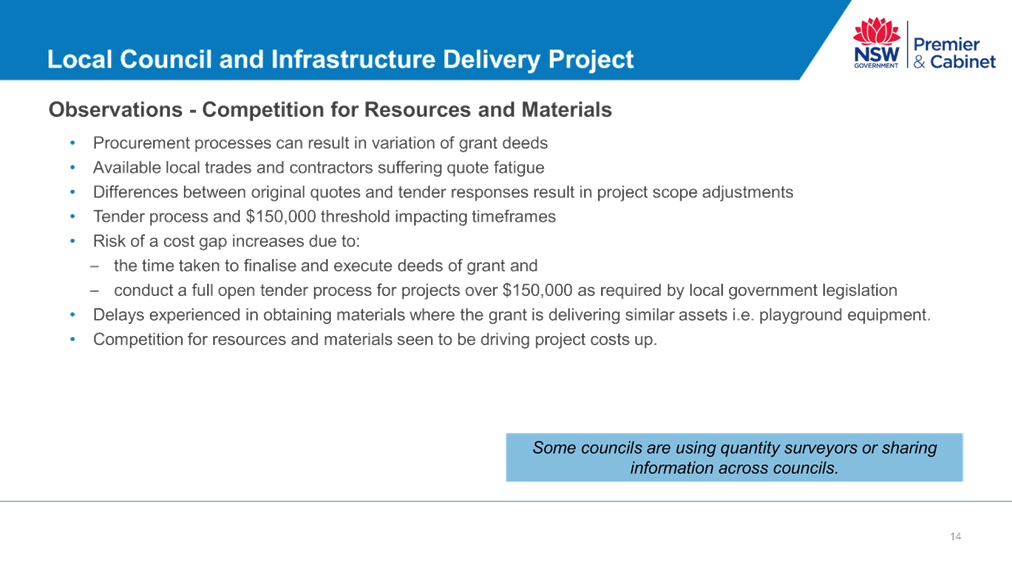



|
Item 8 Ordinary Meeting 27 August 2019
|
Item 8 - Annexure 2
|




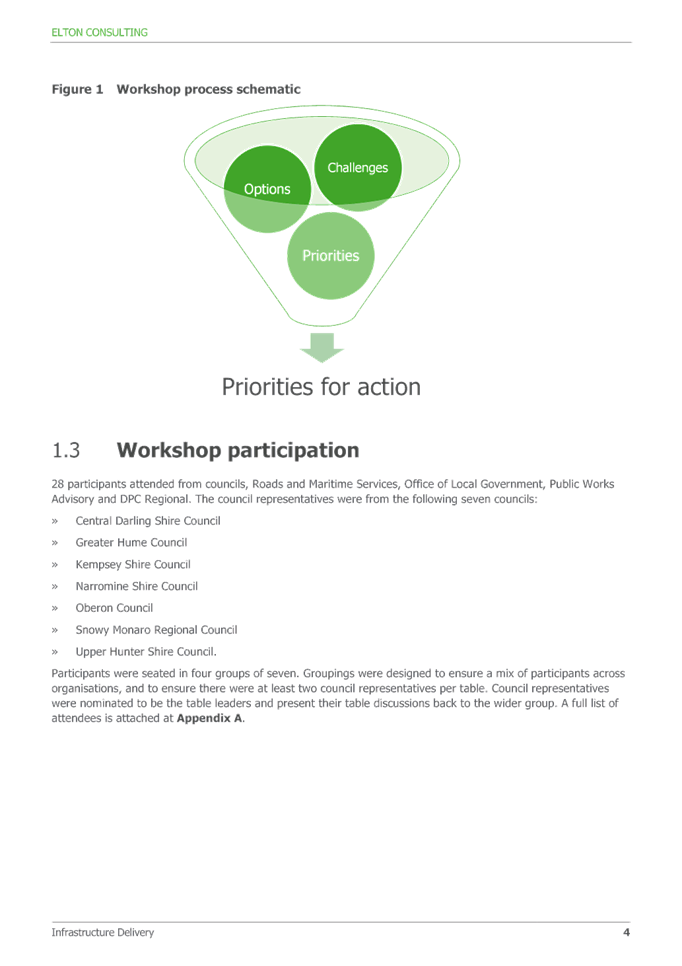




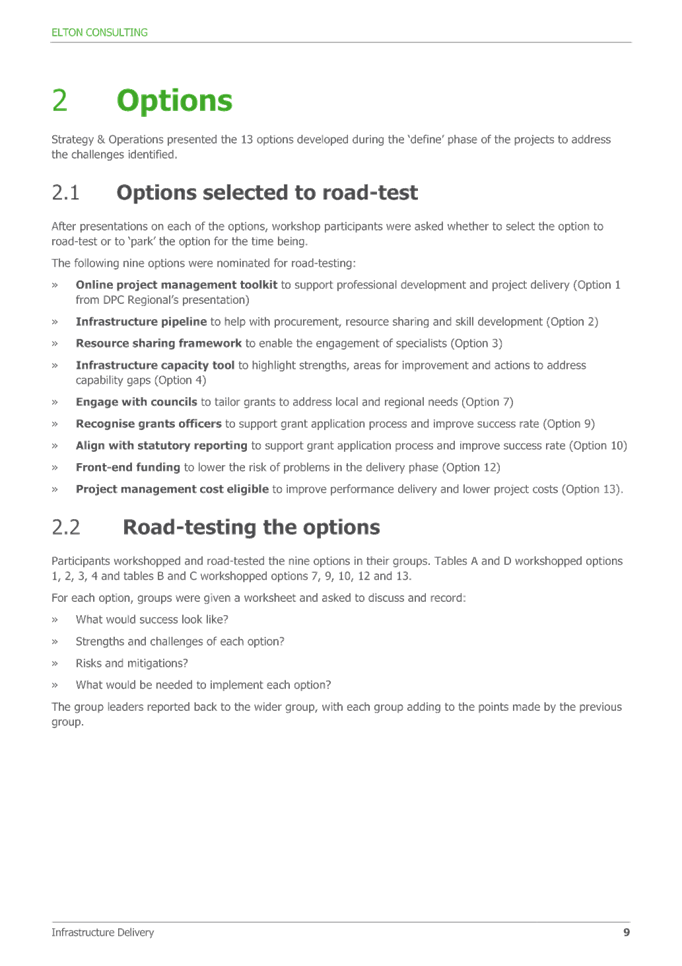
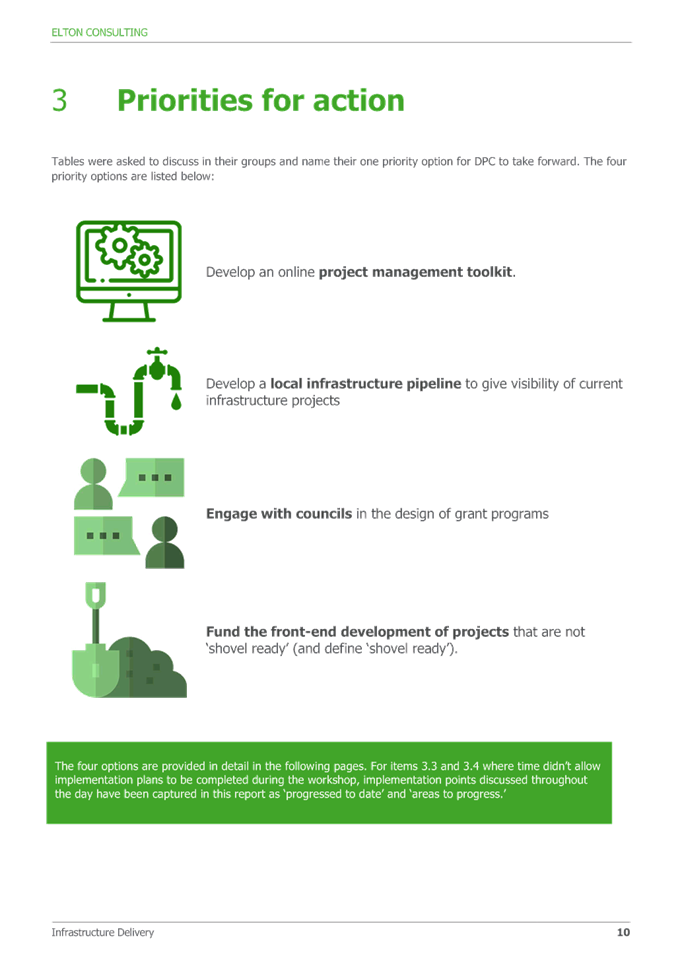
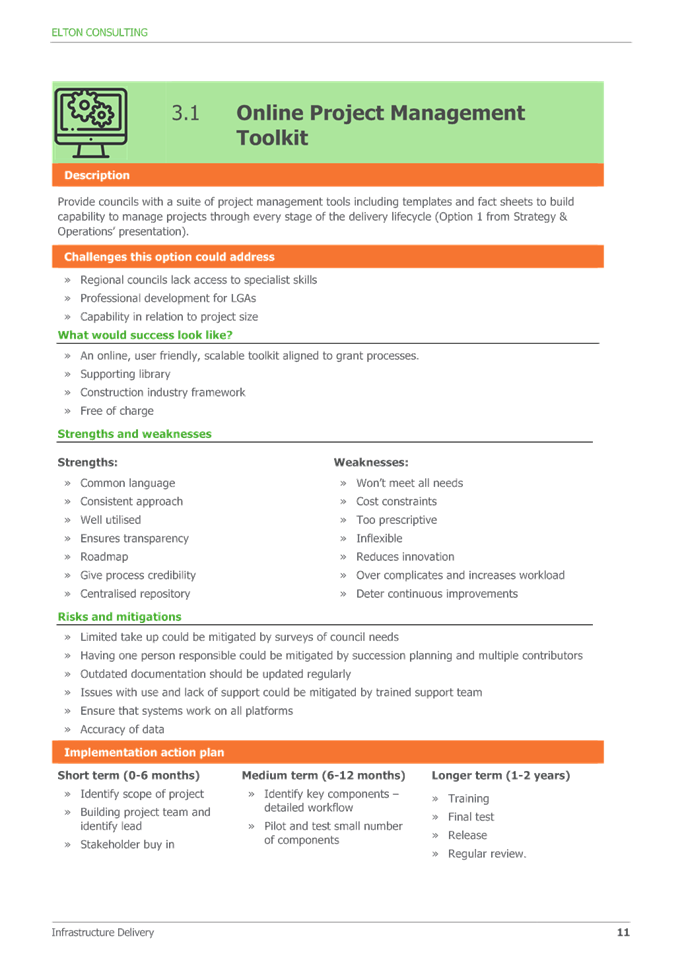

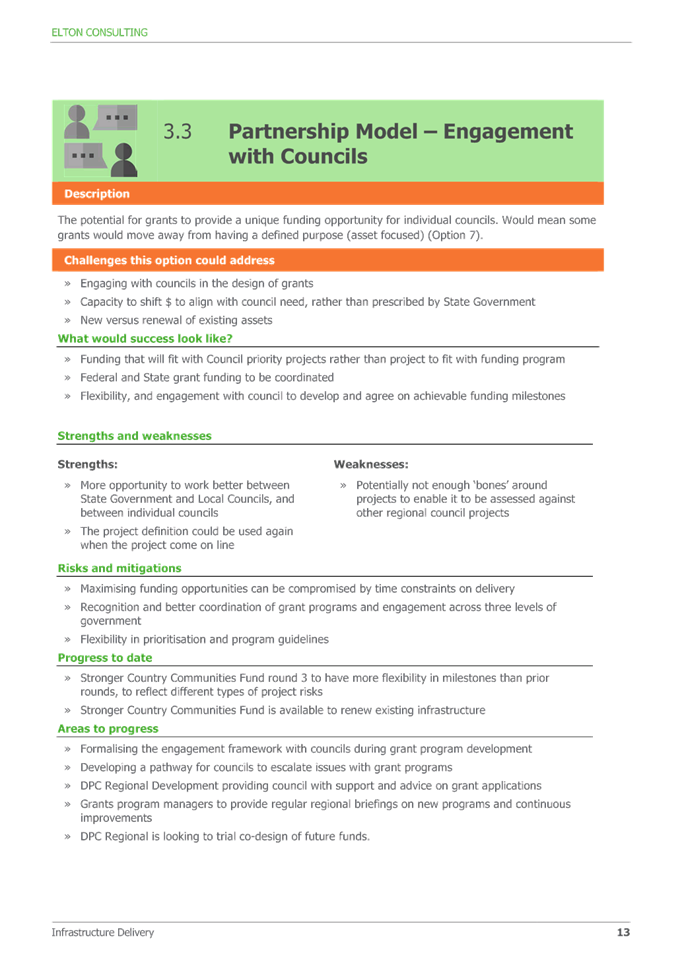
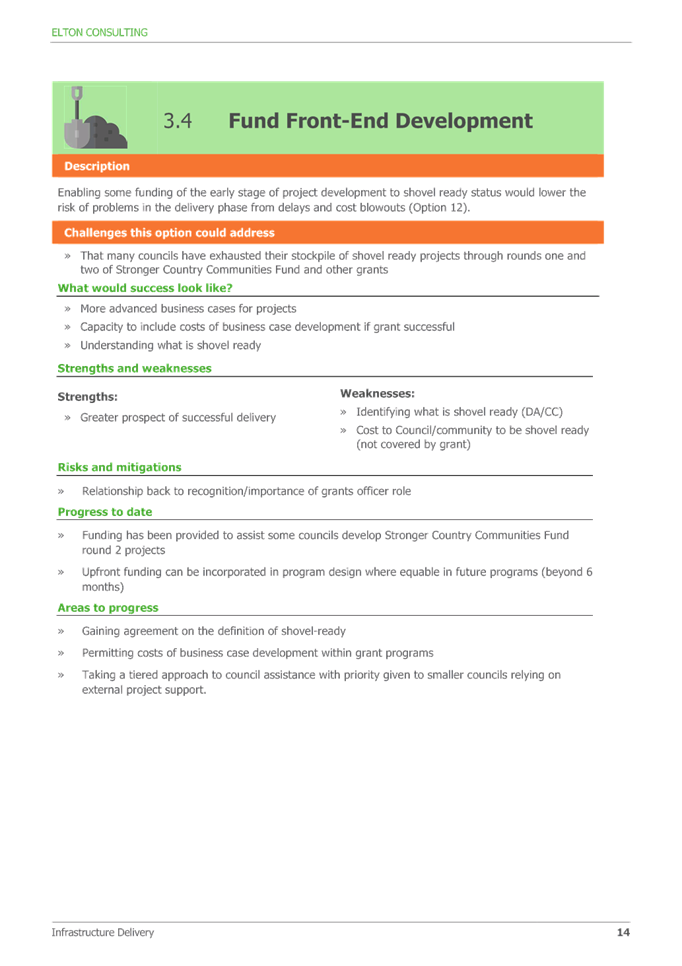

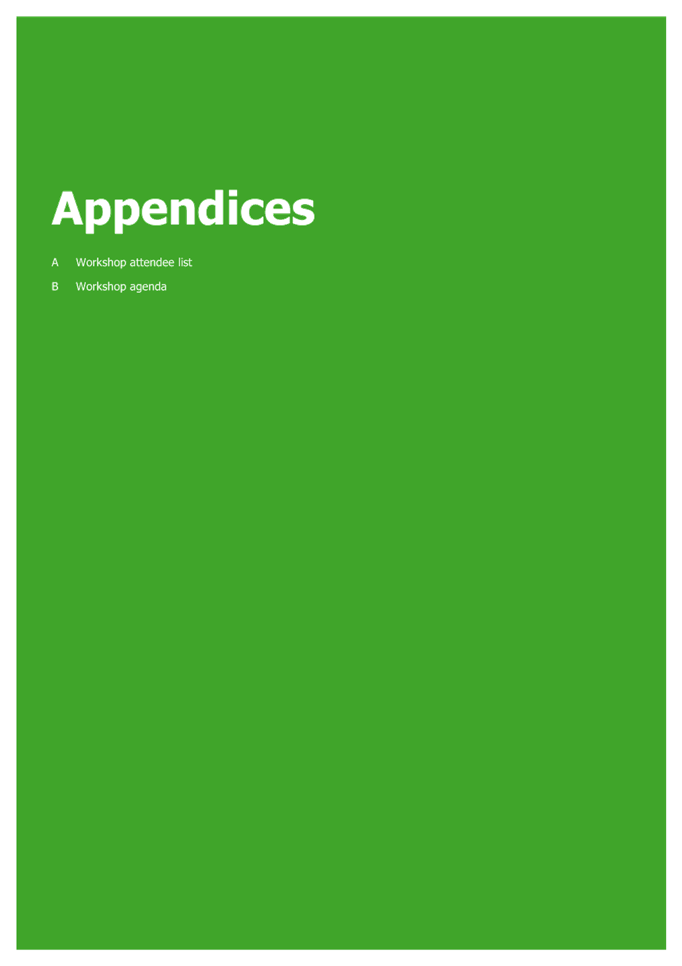



|
Item 9 Ordinary Meeting 27 August 2019
|
Item 9 - Annexure 1
|
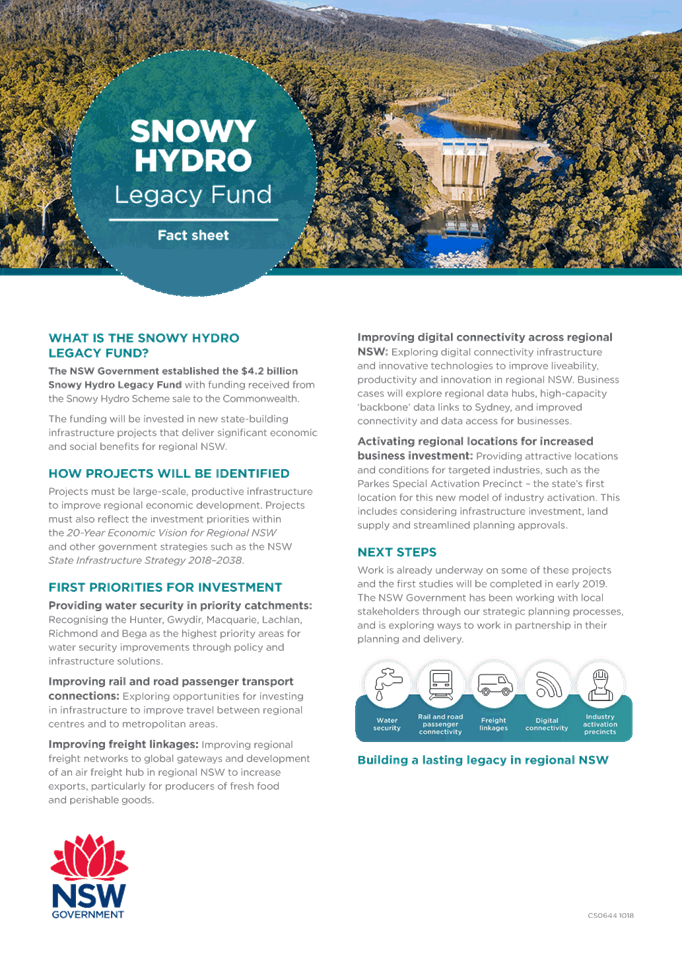
|
Item 12 Ordinary Meeting 27 August 2019
|
Item 12 - Annexure 1
|
2019-20 Cabonne
Acquisitive Art Prize
The Cabonne Acquisitive Art Prize (CAAP) is an
annual painting prize and exhibition that aims to increase opportunities for
participation in Cabonne’s arts and cultural program.
It aims to foster a sense of identity, pride and
place in Cabonne through a community event and enable the acquisition of
exceptional artworks for the Cabonne Council Art and Heritage Collection (to be
established).
The art prize is judged by industry professionals
who will award total prizemoney and acquisitive funds of $6,000 in 2019-20.
The finalist exhibition will be open to the public
at Molong Community Hall, 98 Bank Street, Molong. Winners of each category will
be announced at the opening celebration.
2019 Prizes
Cabonne
Acquisitive Art Prize $4,250 entry
$30
Local
Art Prize Primary School Section $
250 entry
$10
Local
Art Prize High School Section $
500 entry
$15
People’s
Choice Prize $1,000
Judges
To
be determined
Key Dates
Applications
Open Thursday
5 September 2019
Applications
Close Friday
24 January 2020
Works
to be Submitted Monday
3 – Friday 7 February 2020
Selection
Notification Friday
28 February 2020
Exhibition
Opens Saturday
14 March 2020
Announcement,
Official Opening Thursday
19 March 2020
Exhibition
Closes Saturday
21 March 2020
Work
Collection by Tuesday
24 March 2020
Artwork
The 2019-20 prize will be awarded to a painting
that has not been exhibited in previous awards or prizes.
For the purpose of this prize,
“painting” is defined as a work painted in a liquid medium and
applied to rigid support. Works on paper will be accepted if framed for
hanging.
There is no theme.
Works must be no larger than 100 cm’s x 100
cm’s and must be able to be lifted by two people.
Administration Fee
Entry fees are $10 for Primary School entries, $15
for Secondary School entries and $30 for the Acquisitive Art Prize (including
GST) per work and is non-refundable. Any application not accompanied by the
appropriate entry fee will be ineligible. Payment may be made on-line through
Cabonne Council’s on-line payment methods. There is a limit of 1 entry
per work, per category.
Terms & Conditions of Entry
1. The
Cabonne Acquisitive Art Prize is open to any artist who complies with the Terms
and Conditions and who can demonstrate they currently live or work in the
Cabonne Local Government Area or have attended a school in the Cabonne Local
Government Area.
2. The
People’s Choice Prize (non-acquisitive) is open to all works accepted
into the competition and will be judged by the public in attendance at the
exhibition, at a cost of $2 per vote.
3.
To be eligible all entrants must submit a complete application by midnight on
24 January 2020. Entries received after this date will not be accepted.
4. Applications
can be lodged online at council@cabonne.nsw.gov.au
, in writing to Cabonne Council, PO Box 17, Molong NSW 2820 or handed in to the
Cabonne Council’s Offices at Molong, Canowindra or Cudal.
5. Entries
must be paintings that are available for acquisition by Cabonne Council in
exchange for the prize amount of $4,250.
6. All
entries will be assessed initially by a Council-appointed panel of industry
professionals, which will select a shortlist for the exhibition. All entrants
will be contacted by email and advised whether or not their entry has been
shortlisted. The shortlist will be final, and no correspondence will be entered
into.
7. The
entry must be an original, uncopied work made solely by the practitioner in the
12 months prior to the closing date for applications. If the practitioner has
been assisted by technicians, they must be identified.
8. A
good quality digital photo of the work must be provided prior to the final
submission date 7 February.
9. Cabonne
Council recognises that the authorship and copyright of the work displayed in
the final exhibition belongs to the artist.
10. The
winner of the acquisitive prize will grant Cabonne Council a nonexclusive,
perpetual copyright licence to reproduce the work for non-commercial purposes.
Cabonne Council will purchase the artworks and they will become the property of
Cabonne Council. Cabonne Council will attribute the artist as the author of the
work wherever the work is reproduced unless it is reasonable in the
circumstances not to do so.
11. The
shortlisted entrants must permit Cabonne Council to reproduce biographical
information and images of entered works in an exhibition thumb print catalogue
and in promotional material associated with the art prize and exhibition for
five years from the closing date of entries. Cabonne Council will attribute the
artist as the author of the work wherever the work is reproduced unless it is
reasonable in the circumstances not to do so.
12. Entrants
must arrange for delivery of their work during working hours between 3 February
2020 and 7 February 2020 free of any costs to Cabonne Council. The work
delivered must be the same as the image supplied in the entry form, any
subsequent alterations will render the work ineligible for the prize.
13. All
works will go through a shortlisting process and shortlisted entries must be
displayed for the duration of the exhibition.
14. All
works will be insured by Cabonne Council during the exhibition. Cabonne Council
will not accept liability for any loss or damage that occurs to works during
transit.
15. All
works must come professionally prepared for hanging and display
(suitably-framed if applicable, D-rings, no hanging wire and free of dirt and
insect contamination.)
16. All
works must be marked clearly on the verso with artist’s name, title of
work and orientation (demarked by an arrow on the verso). Installation
instructions must be included if necessary.
17. All
artworks must be collected during working hours by 24 March 2020. The artist to
bring necessary packaging when collecting works. If works are not collected by
the due date they will be sent to storage at the entrant’s expense.
18. Judges
for the Acquisitive Prize will be of appropriate credentials to make a critical
assessment of the entries. The decision of the judging panel is final, and no
correspondence will be entered into.
19. The
prize-winning entrant agrees to make all reasonable effort to attend the
opening event.
20. Cabonne
Council reserves the right to refuse to display any entry that does not meet
the requirements outlined in the Terms and Conditions, or any work it deems to
be unacceptable for exhibition.
21. Employees
of Cabonne Council, councillors and those involved in the administration or
judging of the prize are not eligible to enter.
22. By
completing the entry form and paying the entry fees, the entrant agrees to
these Terms and Conditions.
23. If
a dispute arises relating to the administration of the Cabonne Acquisitive Art
Prize, the parties agree to negotiate to settle the dispute with the assistance
of an agreed independent third party.
24. If
you are unsure of the terms and conditions or you have further questions you
can contact Cabonne Council on 02 6392 3200 or council@cabonne.nsw.gov.au
Entry
Form
Applicant
Details
|
Given
Name
|
Family
Name
|
|
Address
|
|
Suburb
|
State
|
Postcode
|
|
Phone
(home/work)
|
Phone
(Mobile)
|
|
Email
|
Current
School Year (if applicable)
|
|
Website/Social
Media Page
|
|
How
did you hear about this?
|
|
Please
write a short statement of your connection to Cabonne.
|
Artwork
Details
|
Title
of Work
|
|
Date
Work Produced
|
|
Height
Depth
|
Width
Weight
|
|
Material/Medium
|
|
Prize
Category Entered
|
|
Artwork
Description/ Statement (200 words max)
|
Artist Details
These
details may be used by Council in catalogues and/or promotional material (if
artist successful)
|
Artwork
Biography/Statement (200 words max)
|
I
have read and agree to the terms and conditions of entry for the Cabonne
Acquisitive Art Prize.
|
Parental
Consent (if under 18 years)
|
Date
|
|
Item 13 Ordinary Meeting 27 August 2019
|
Item 13 - Annexure 1
|
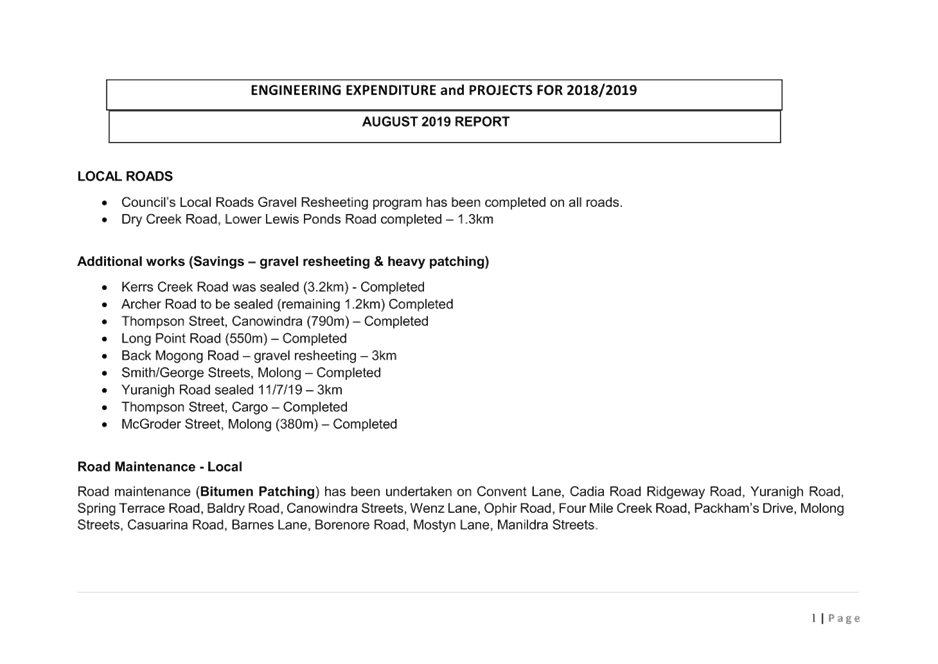

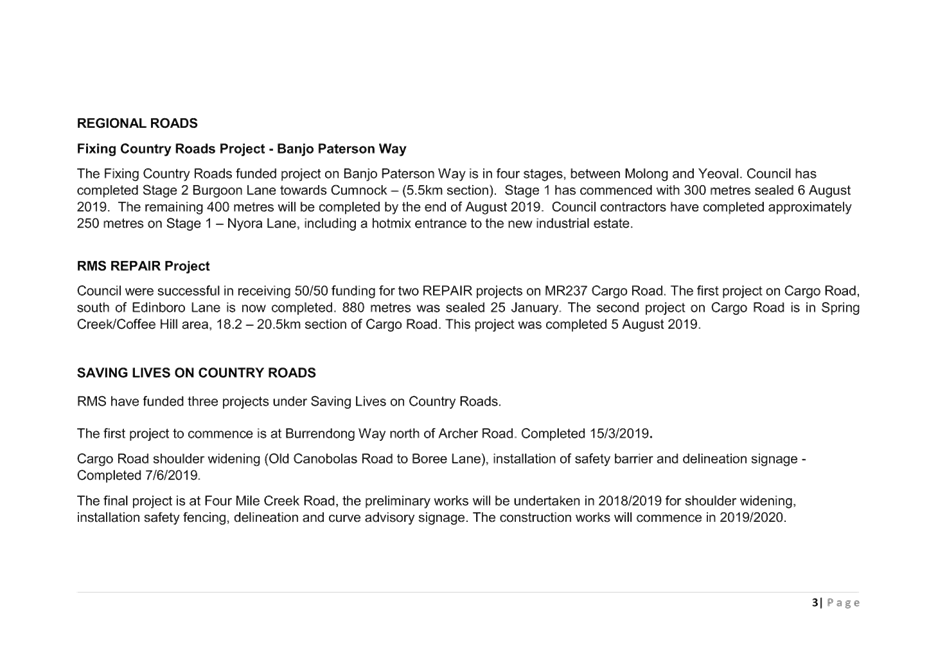
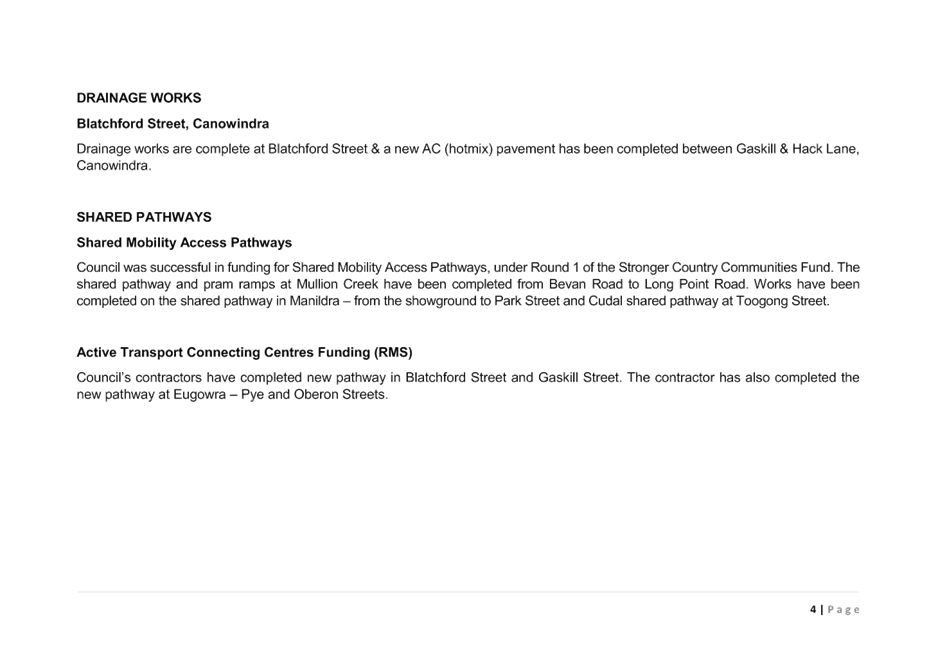
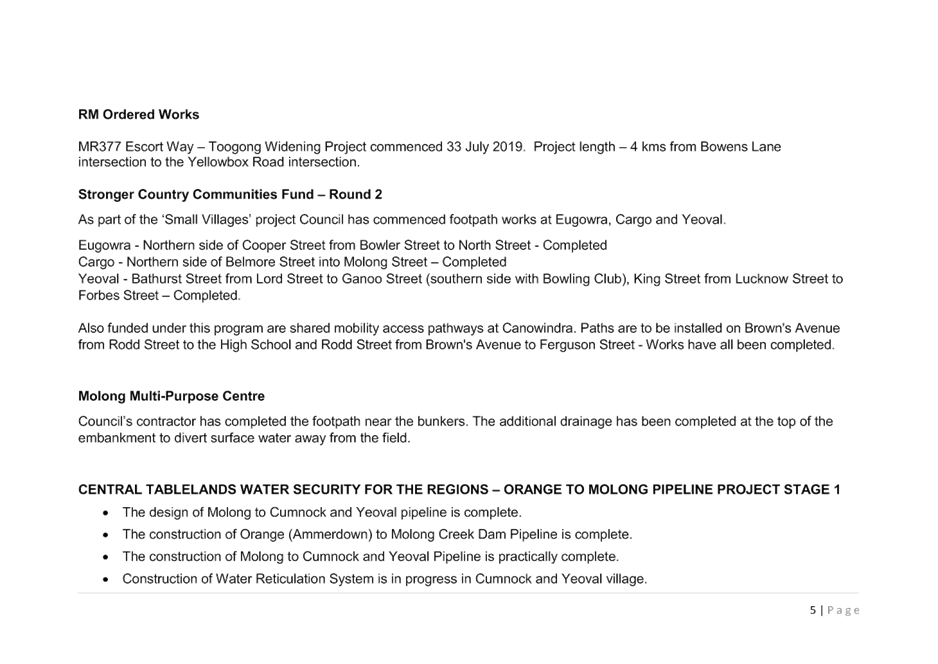
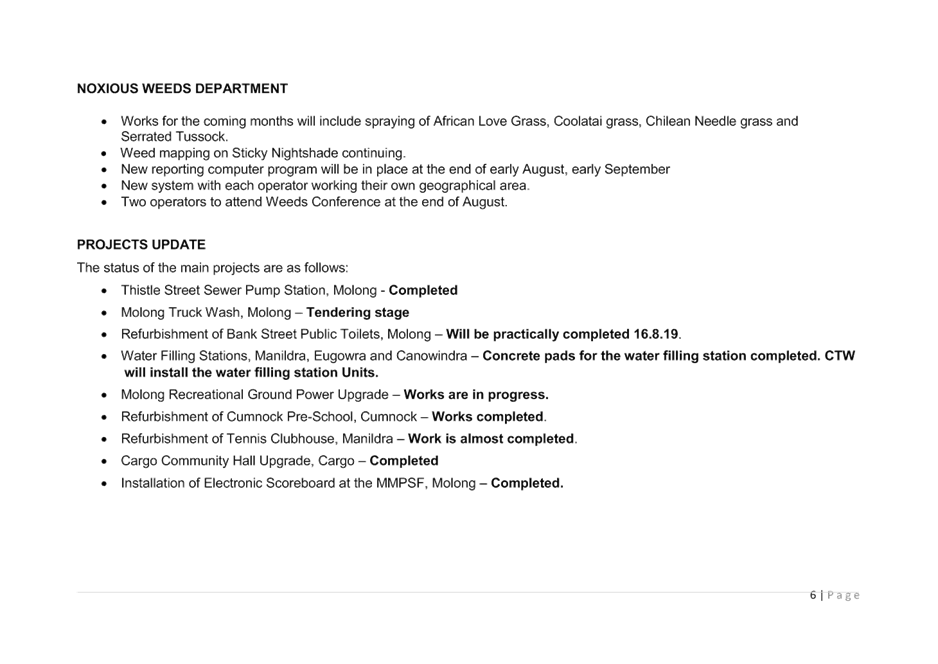
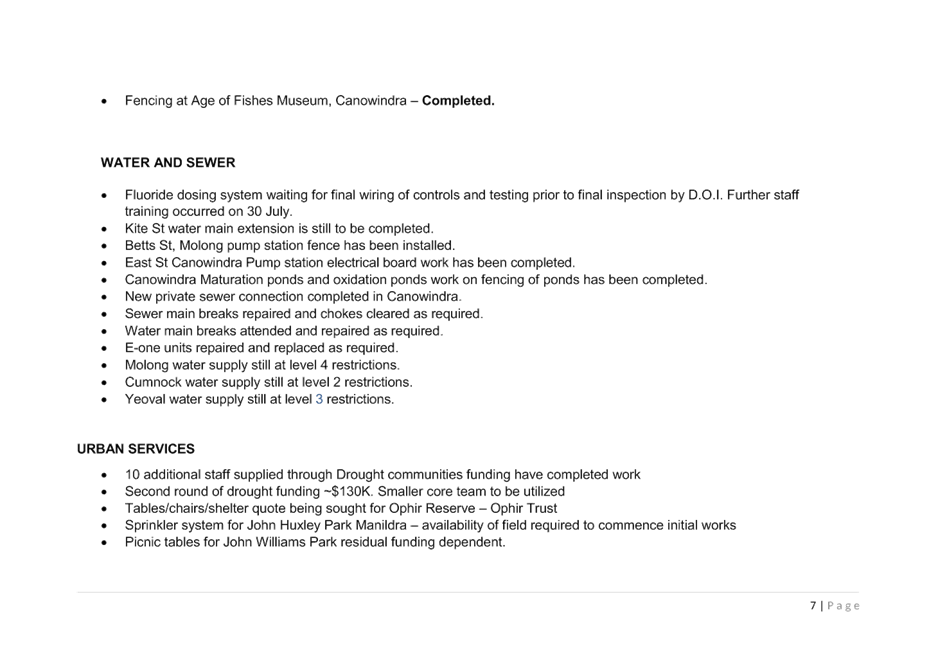
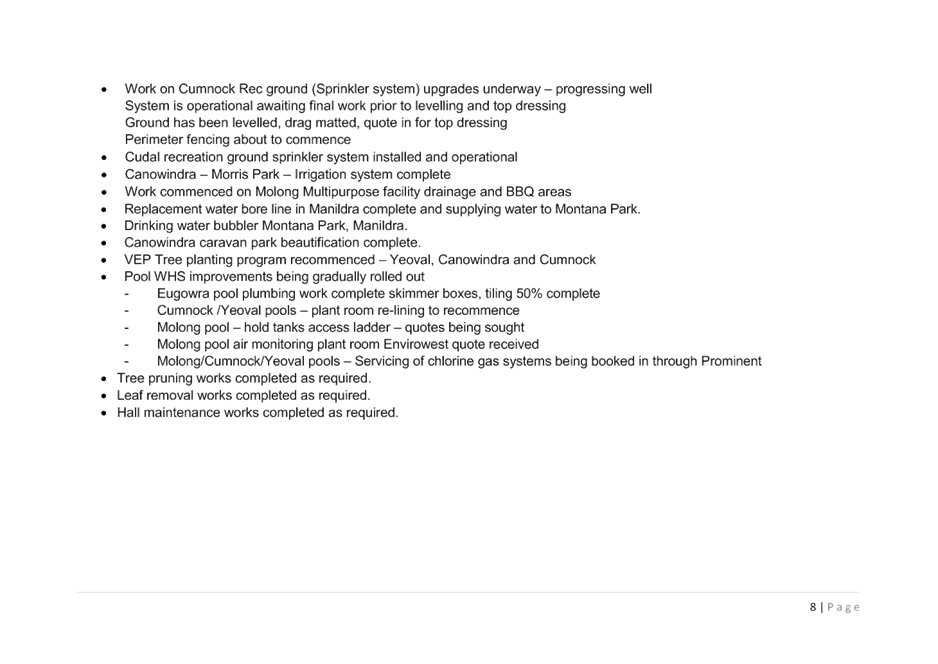
|
Item 15 Ordinary Meeting 27 August 2019
|
Item 15 - Annexure 1
|
